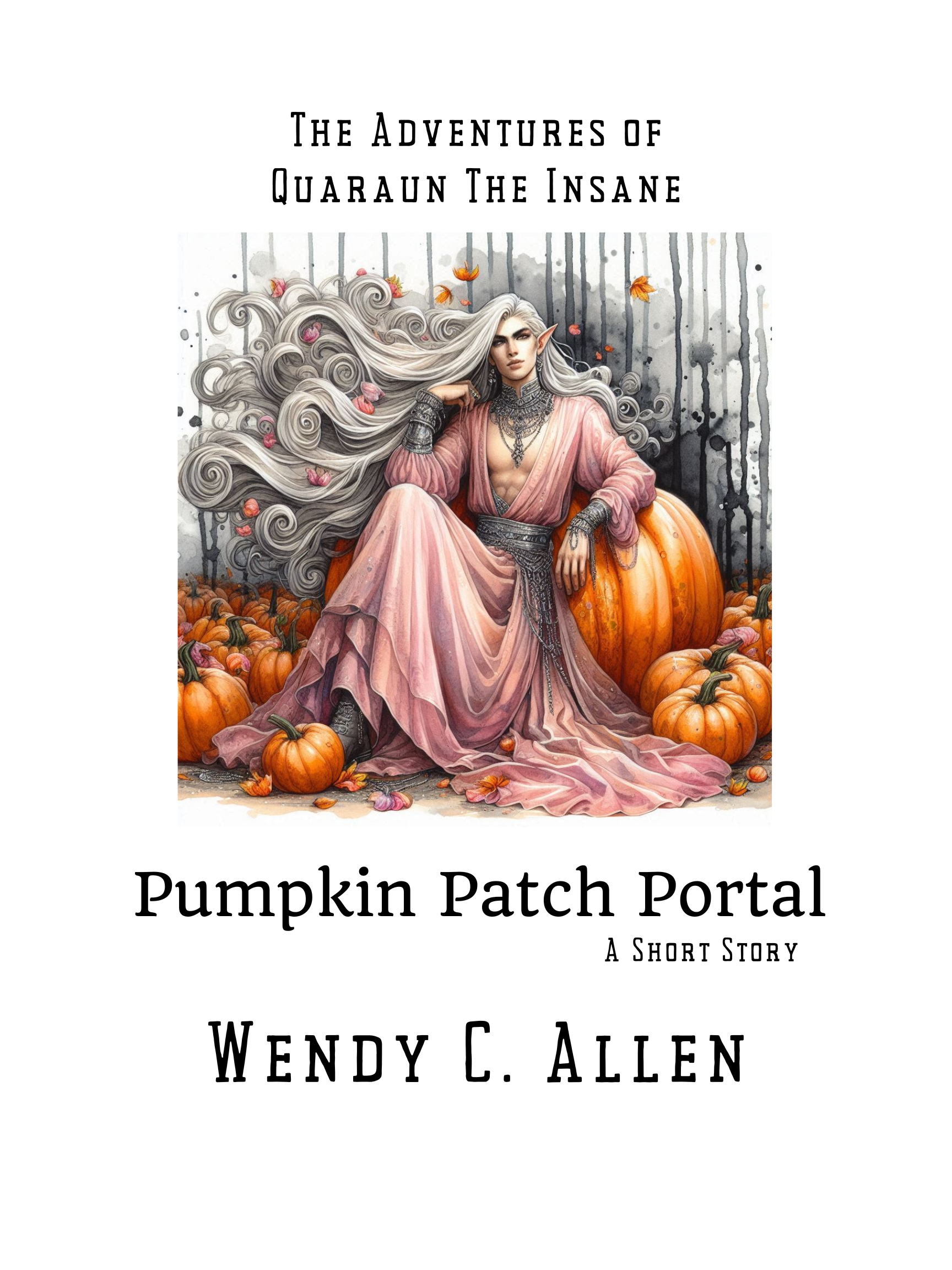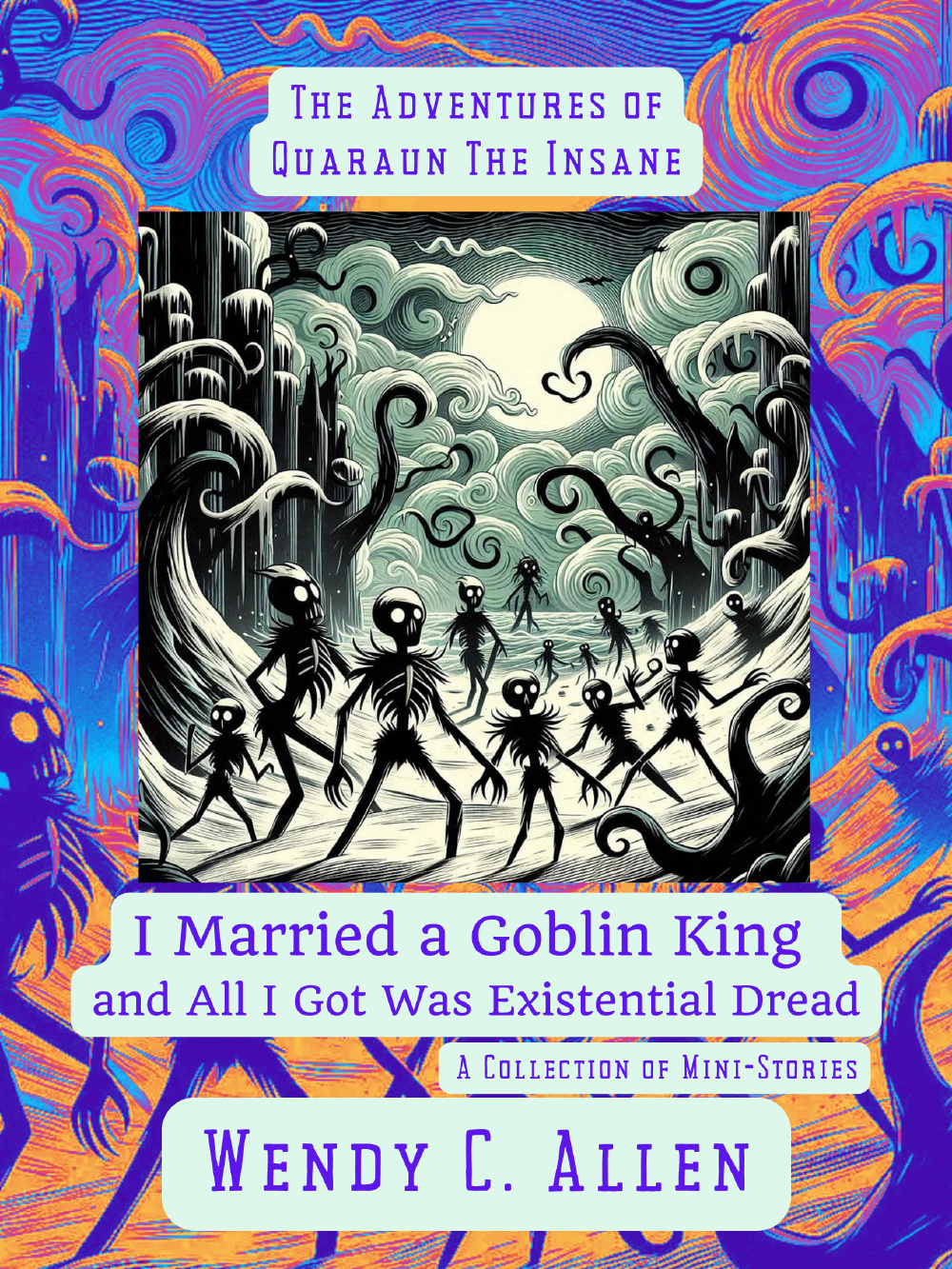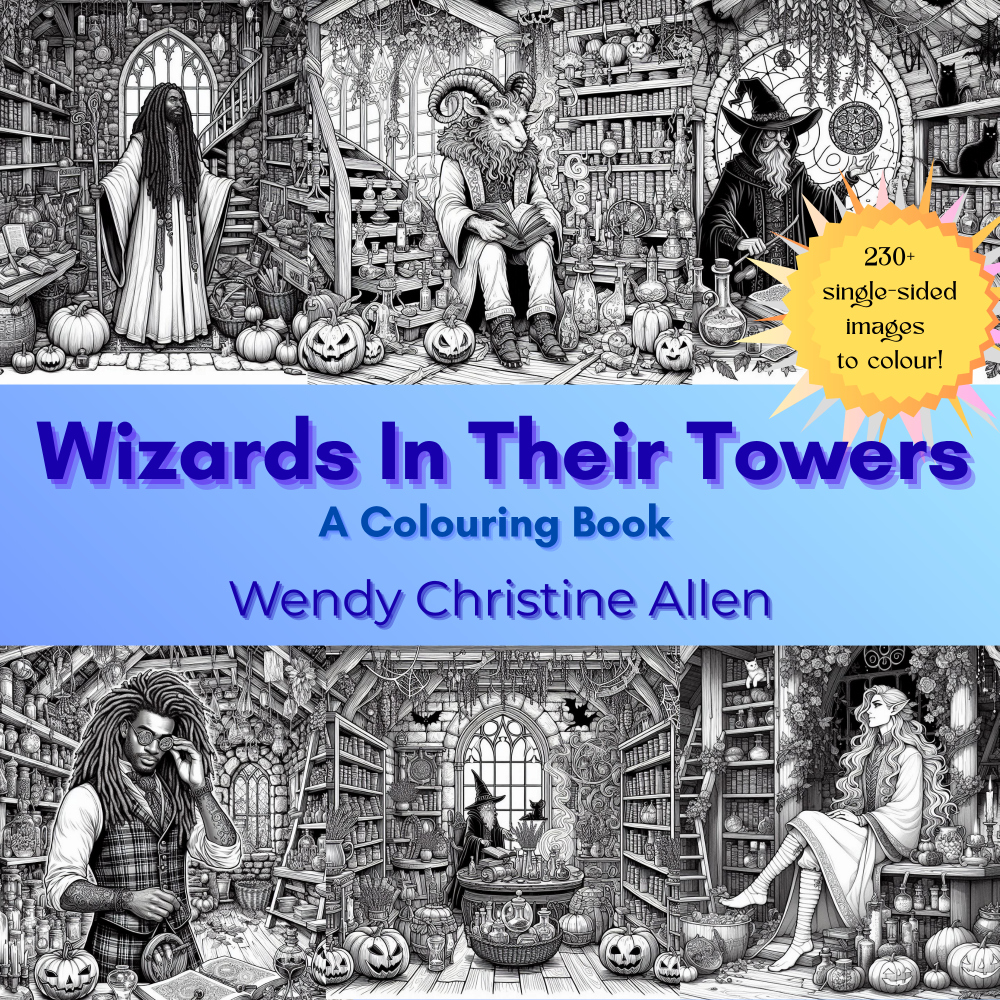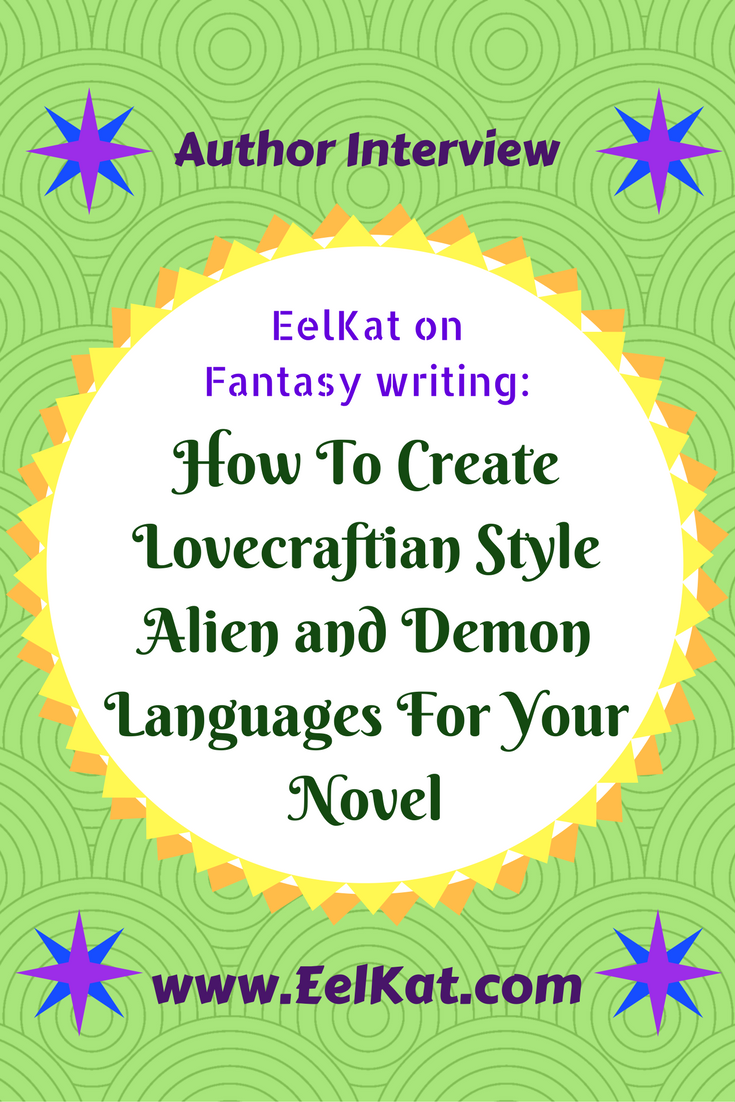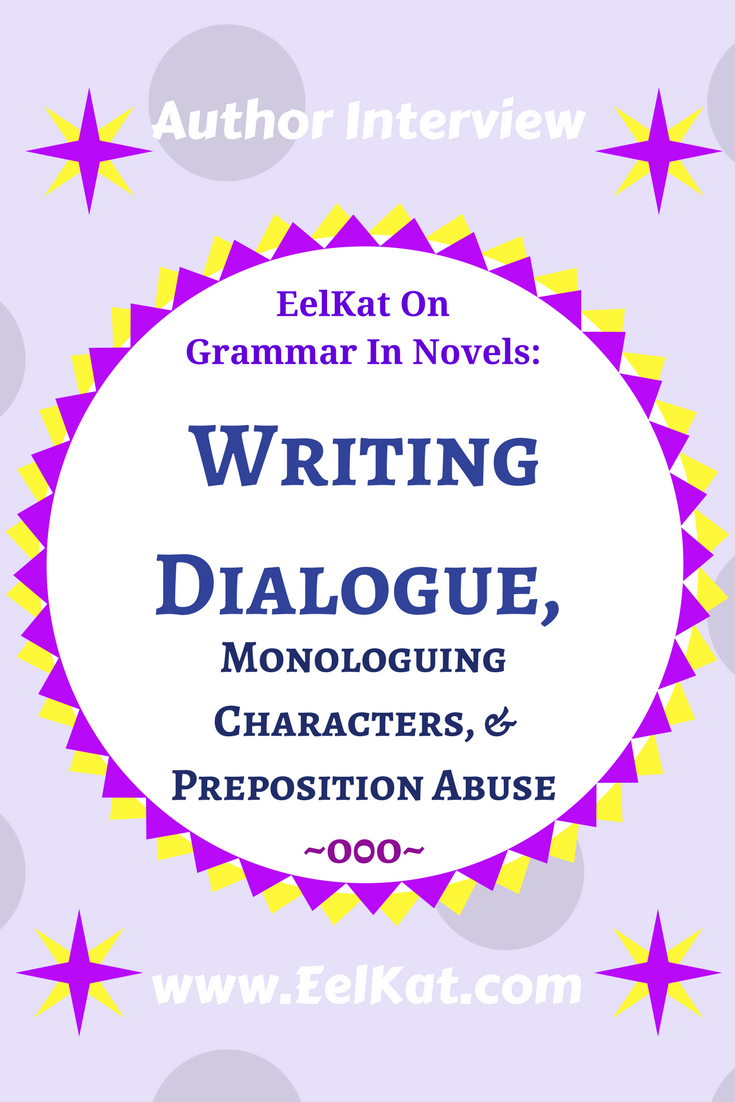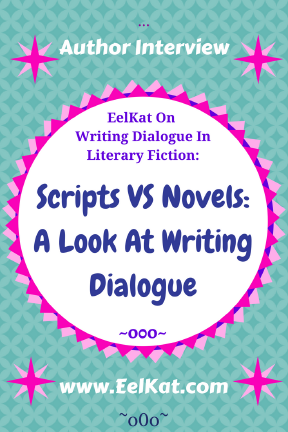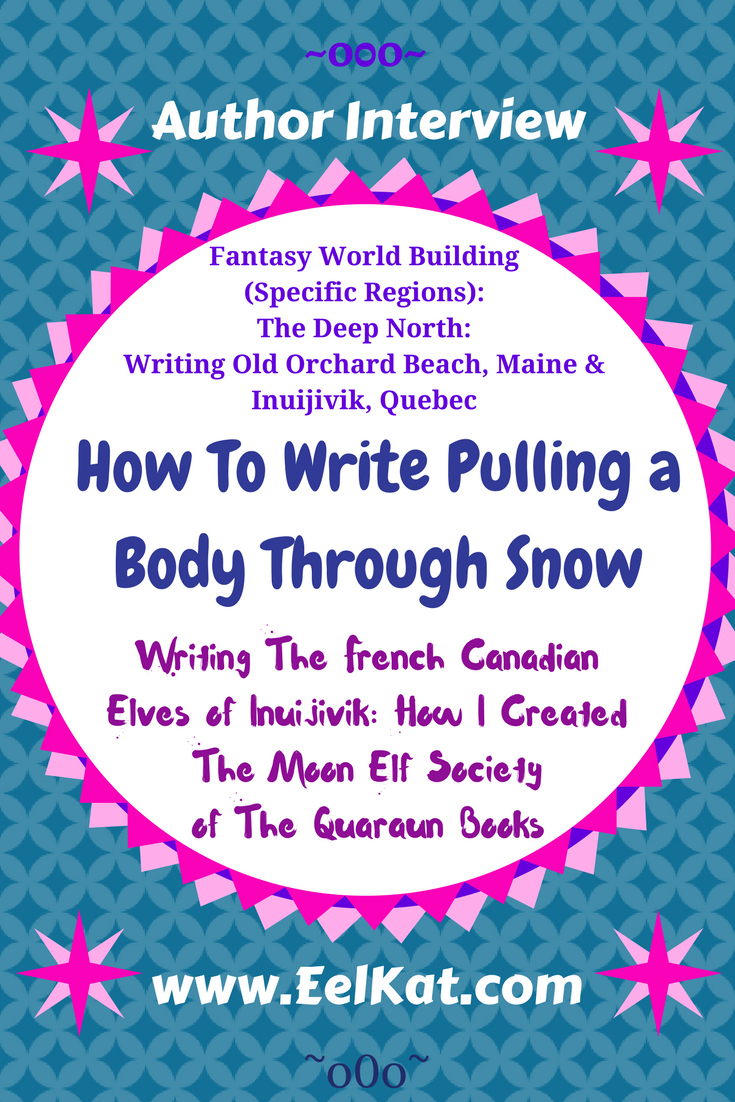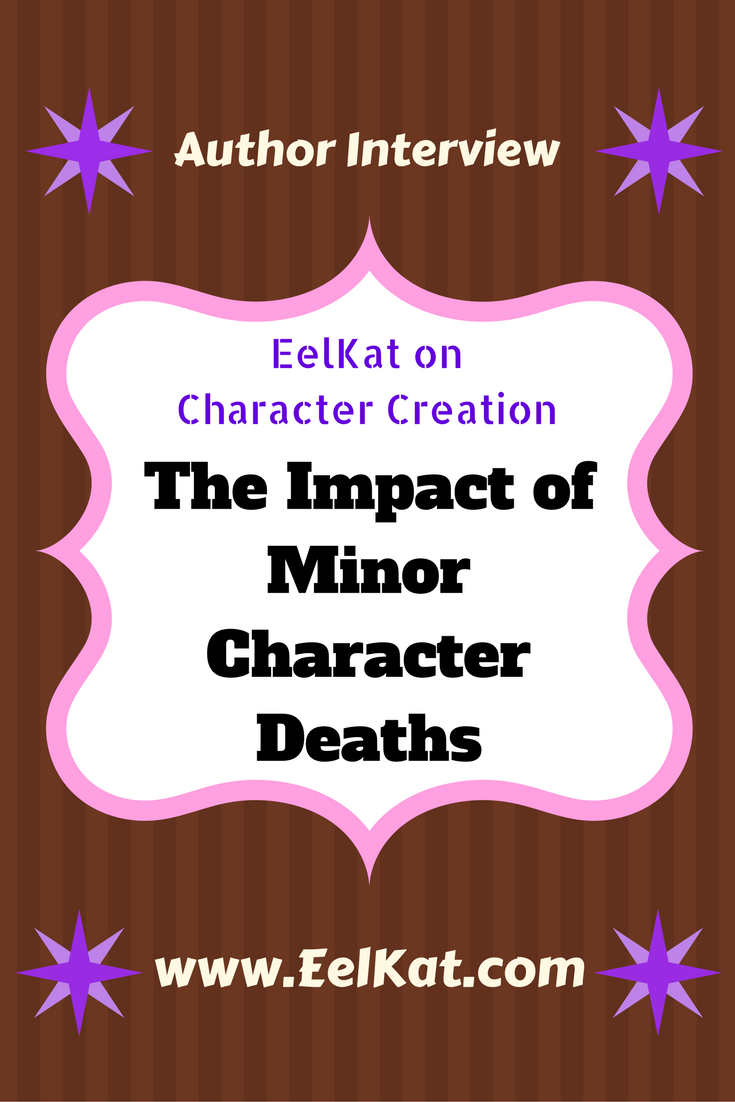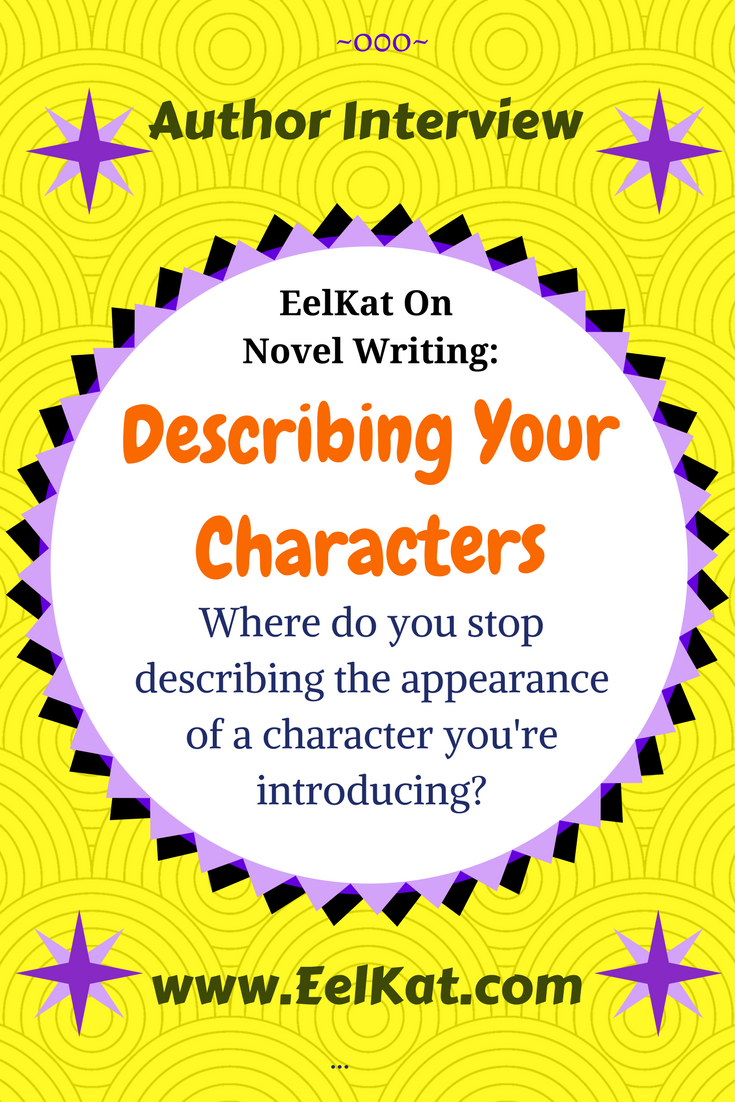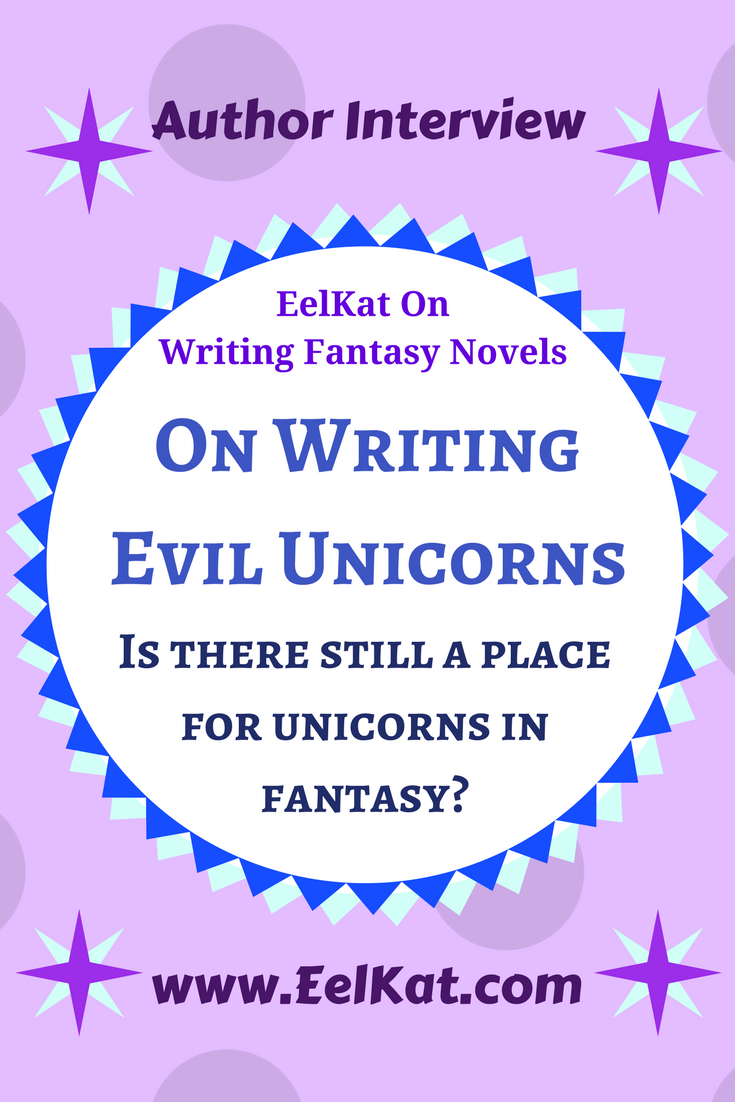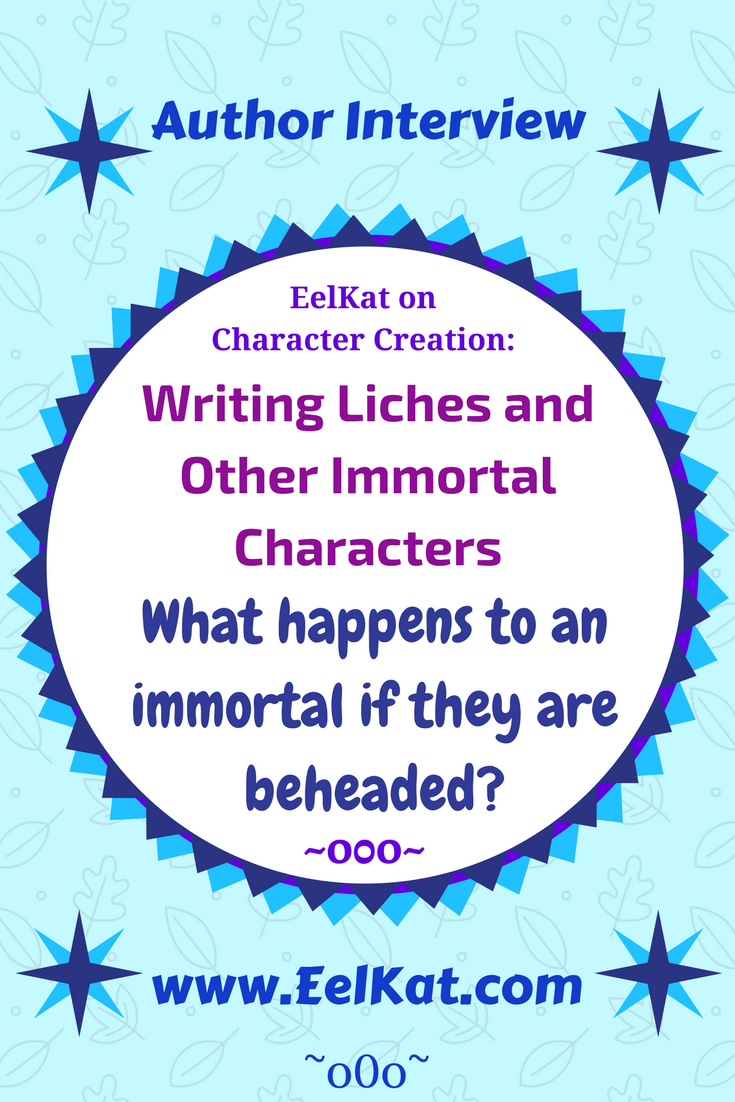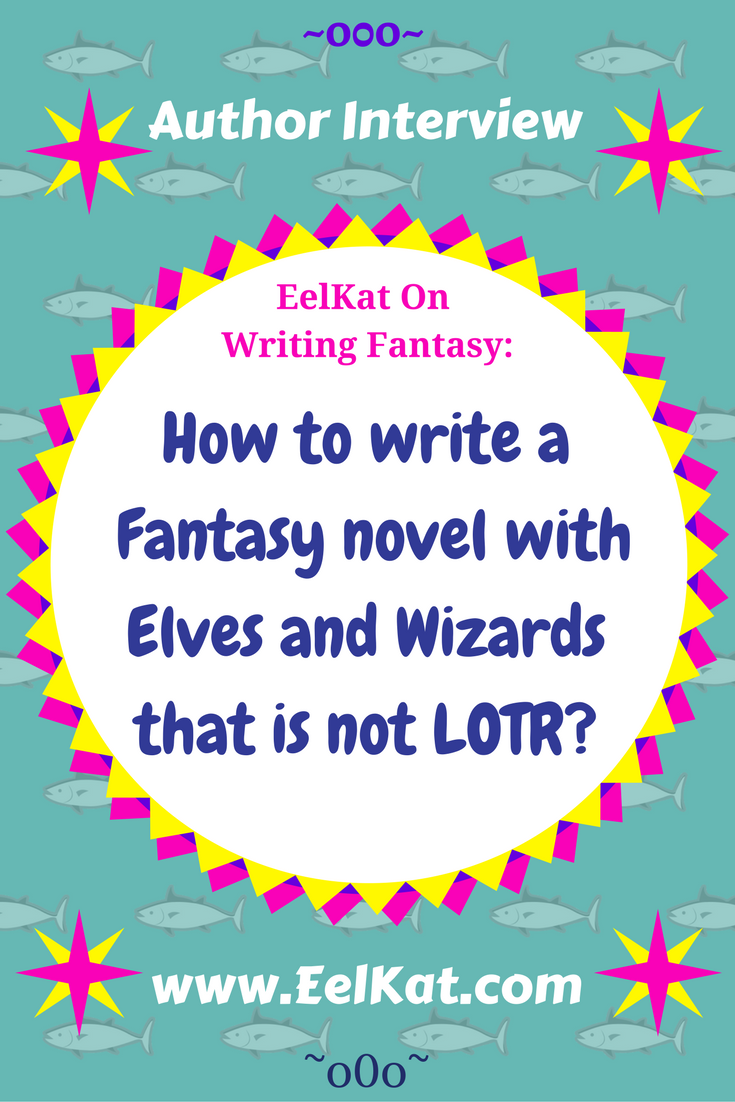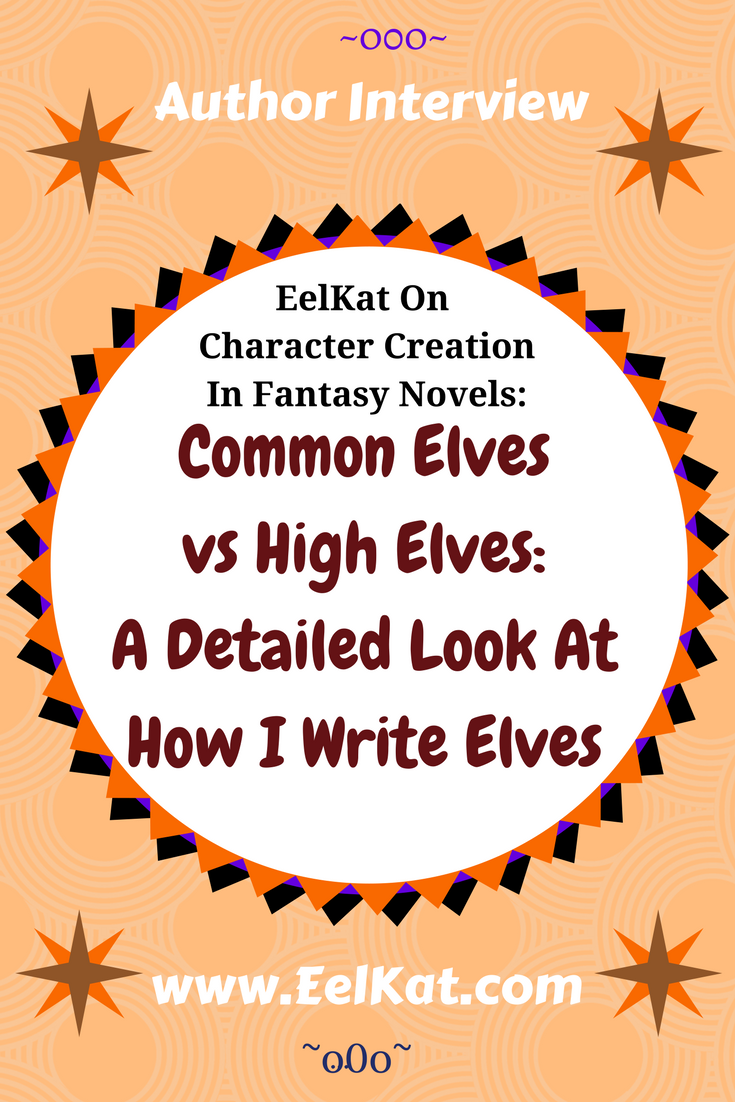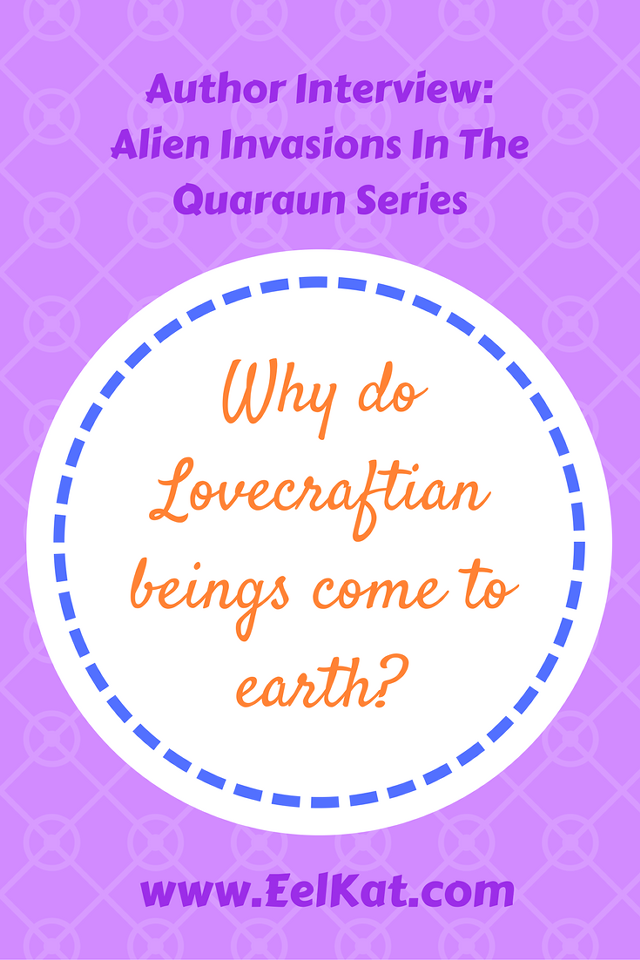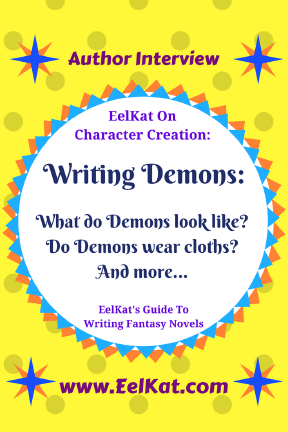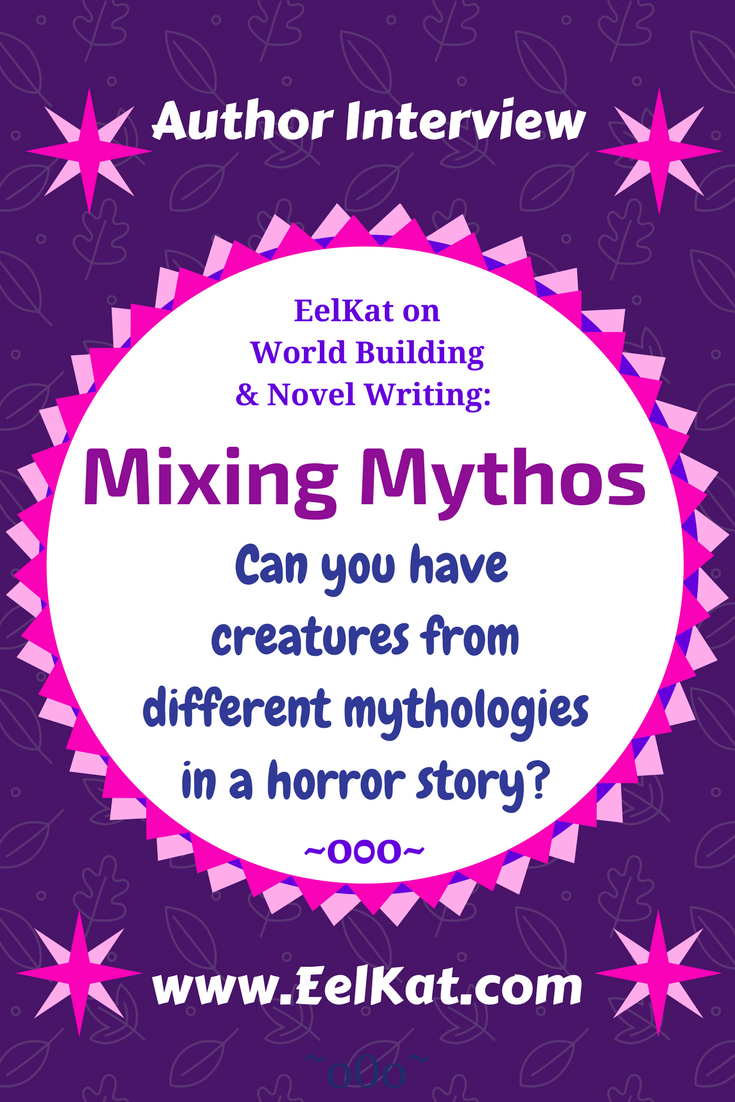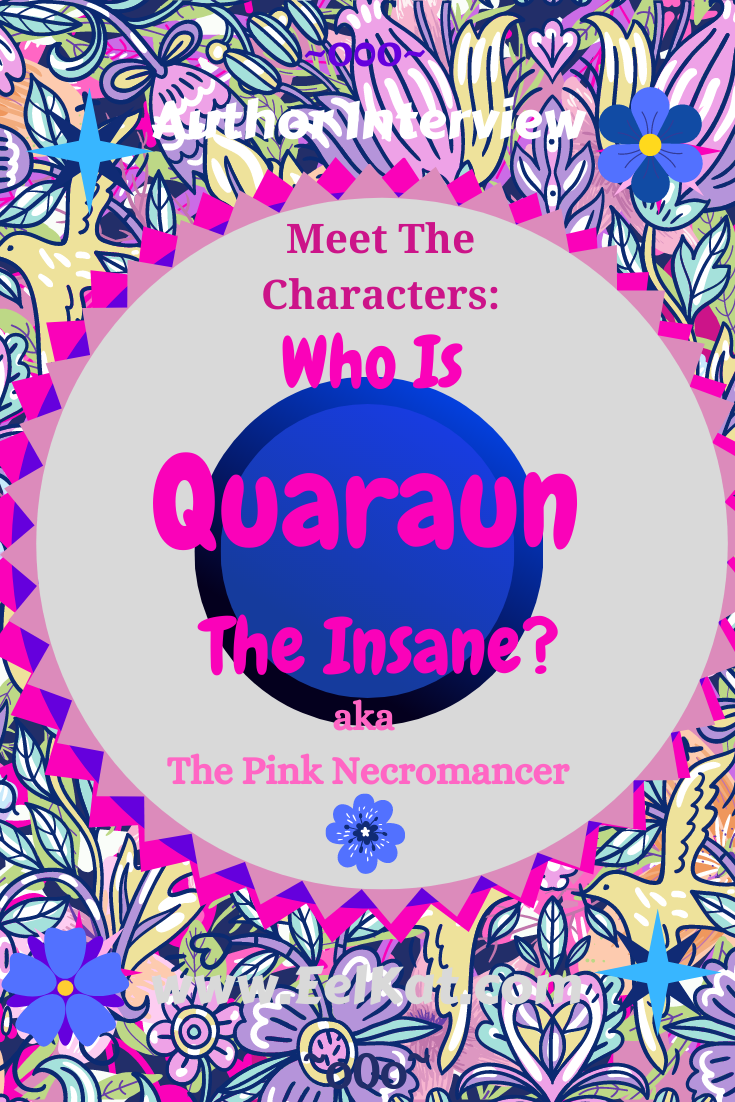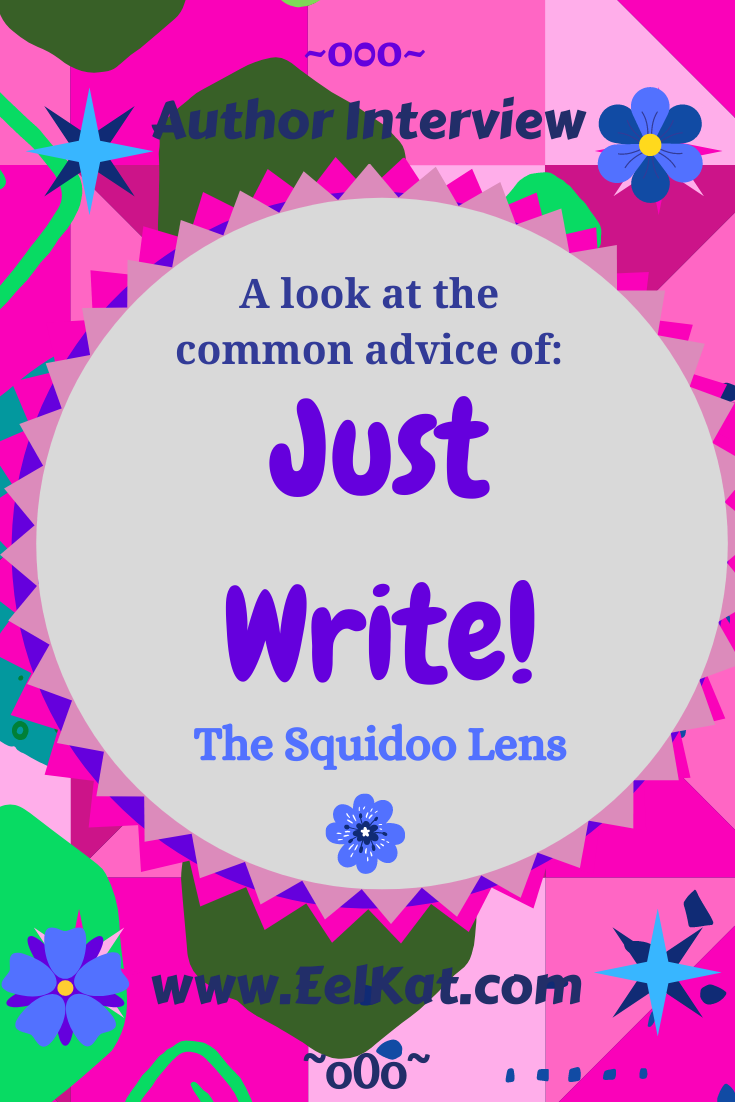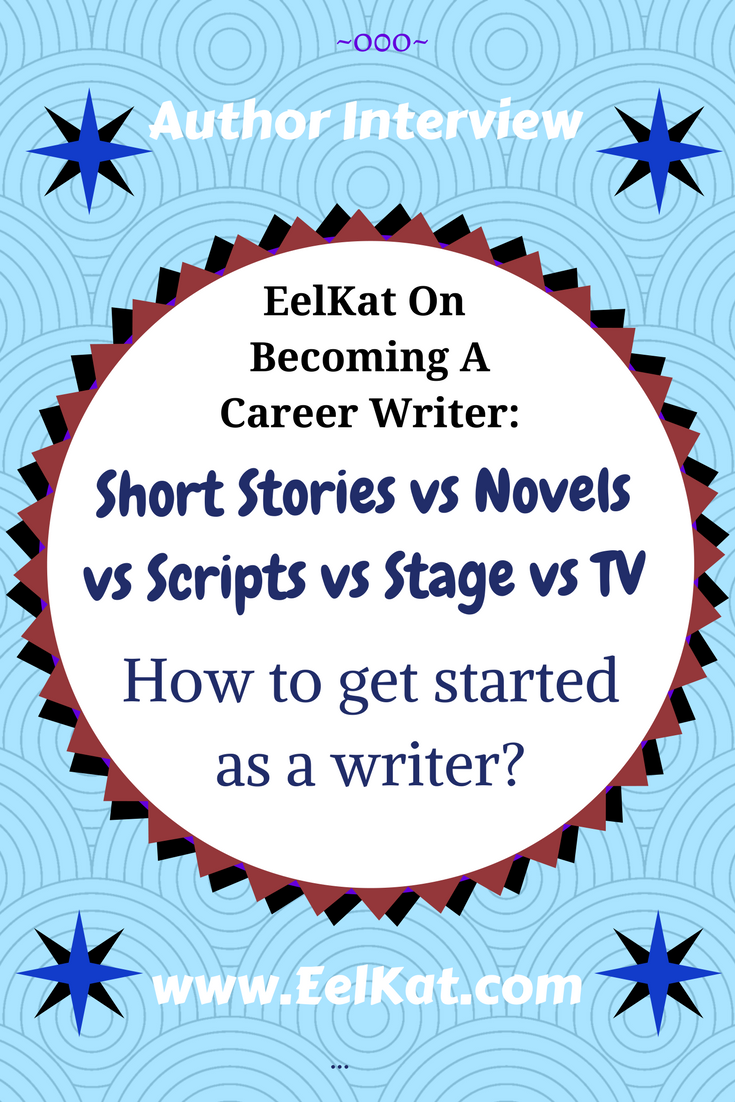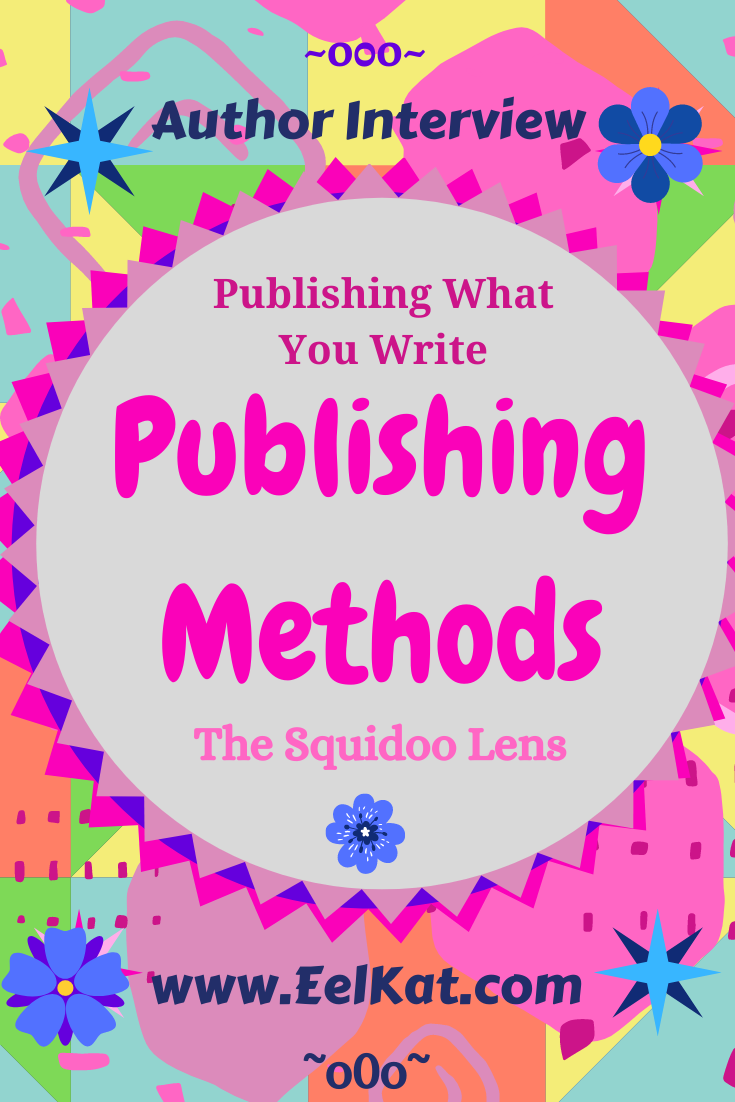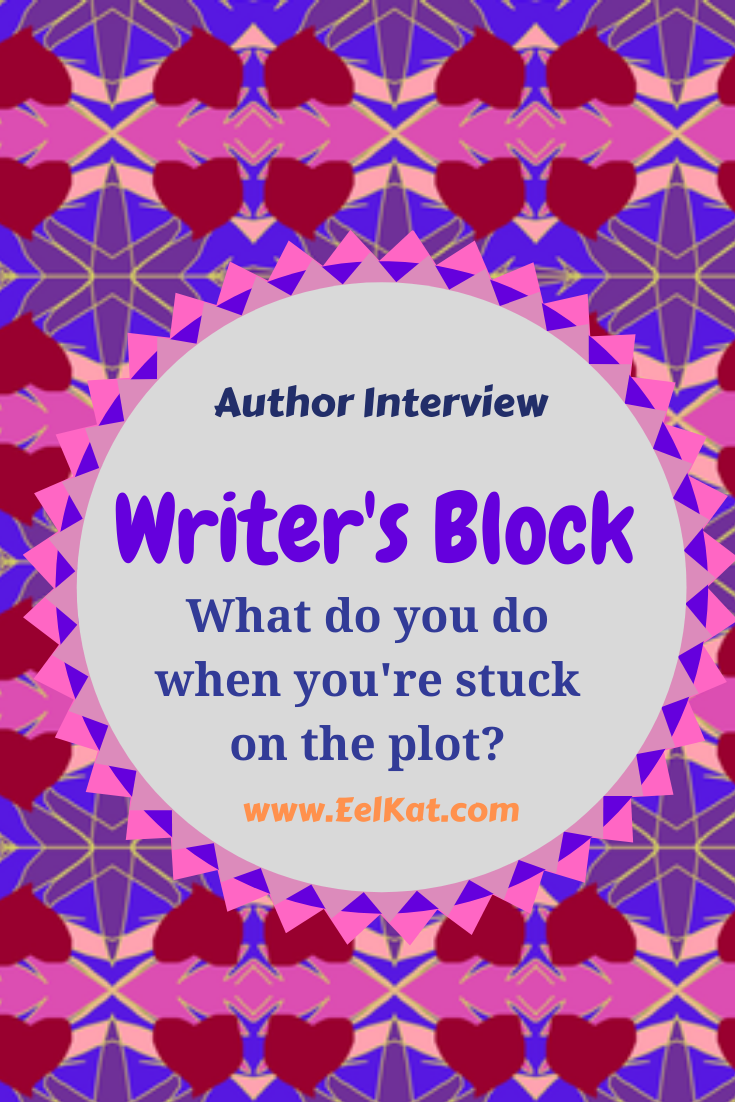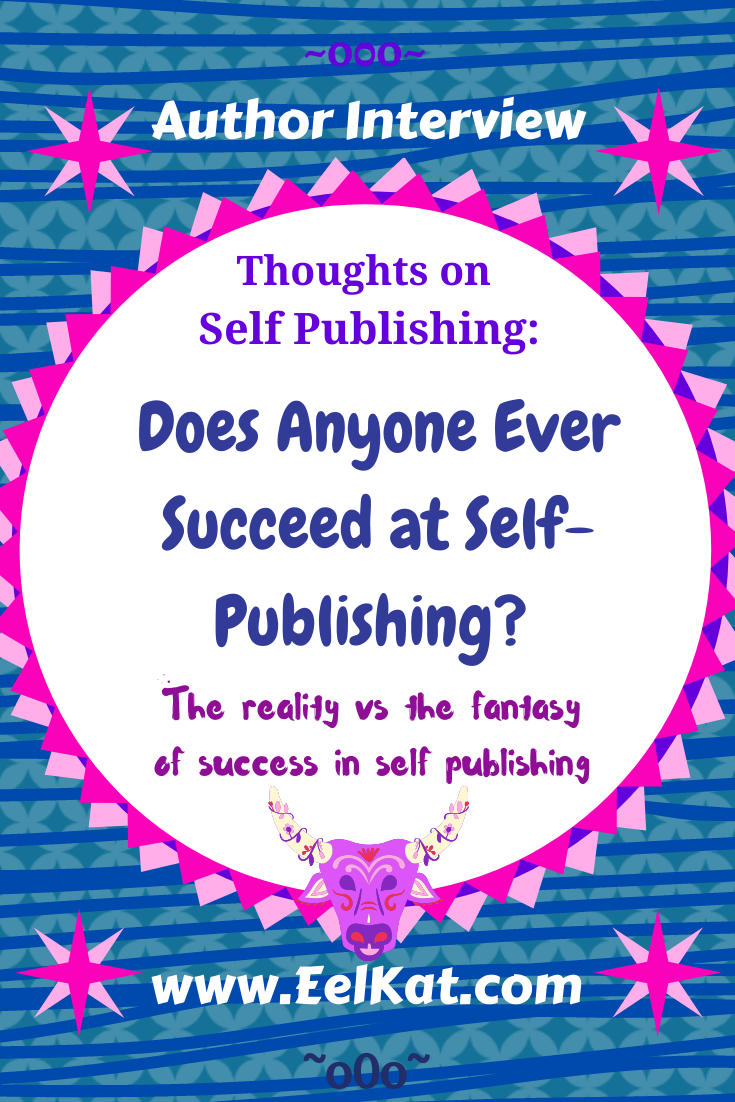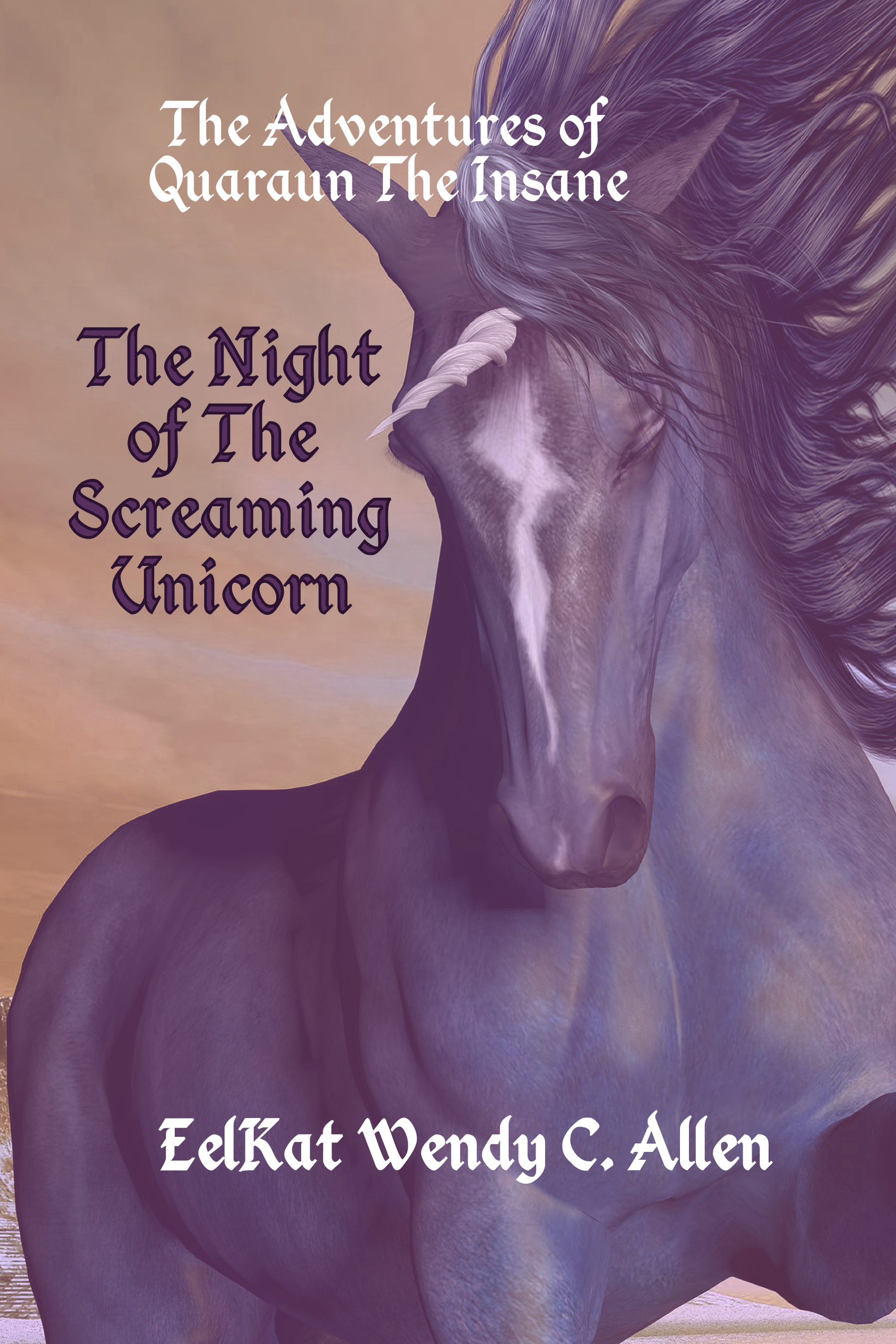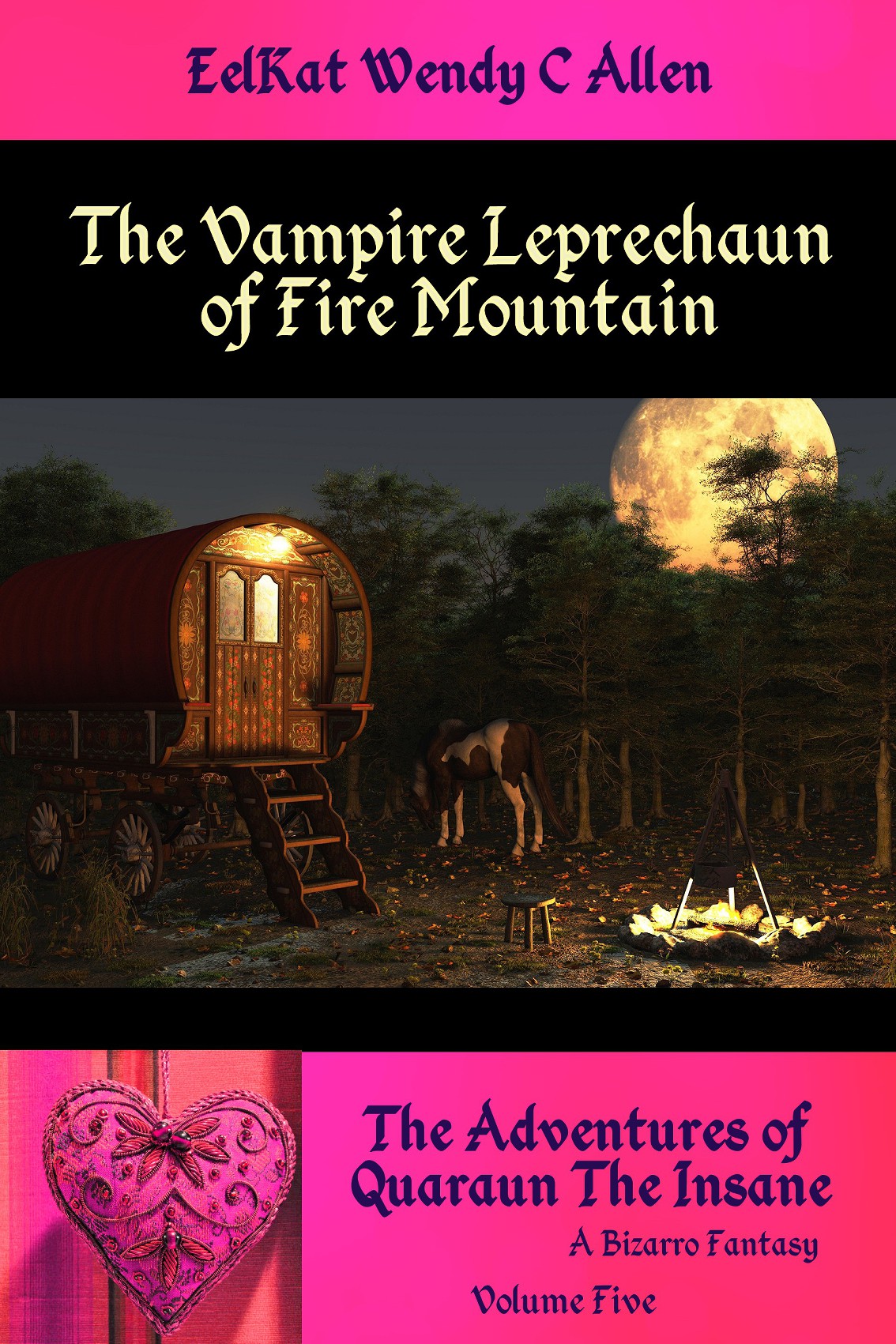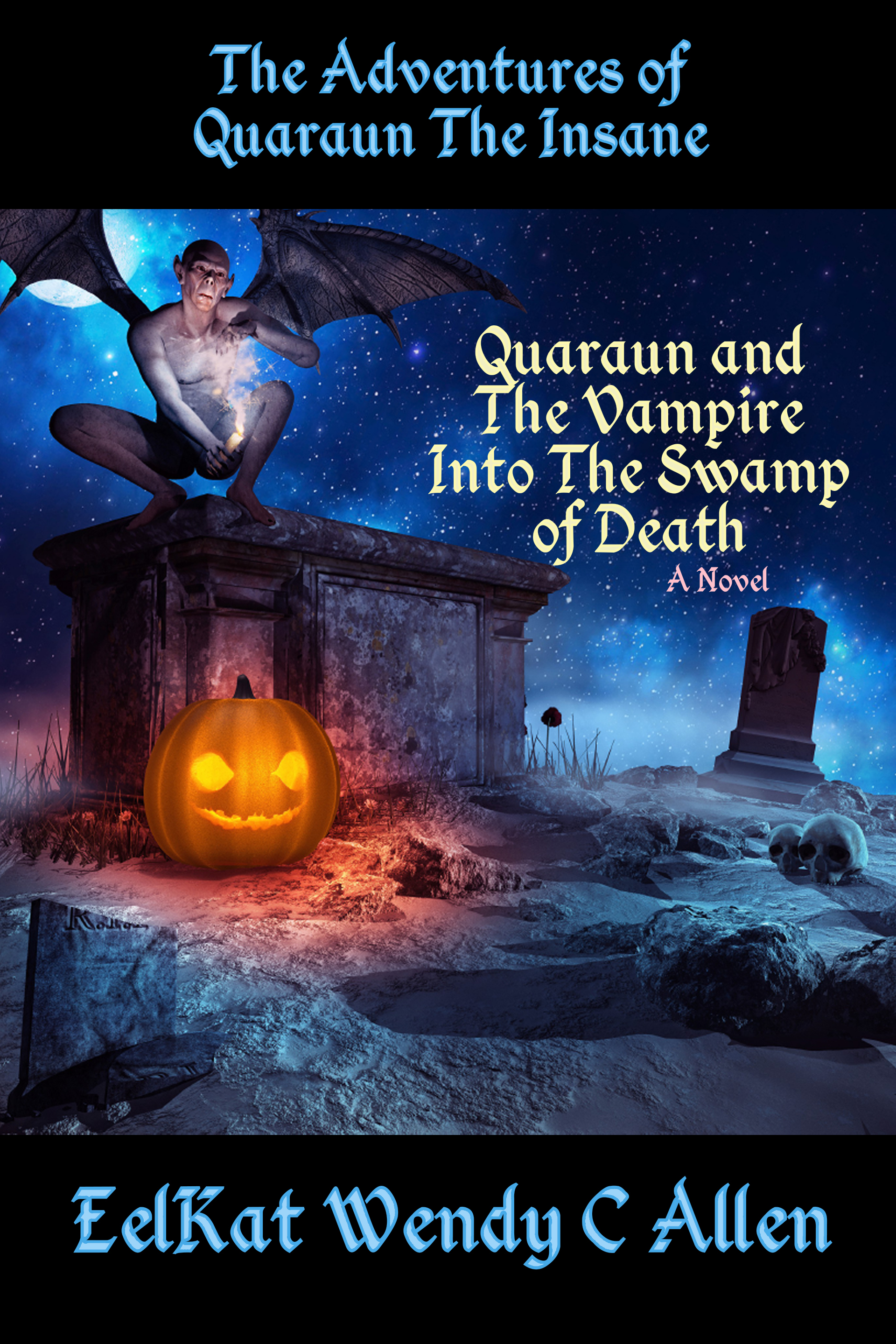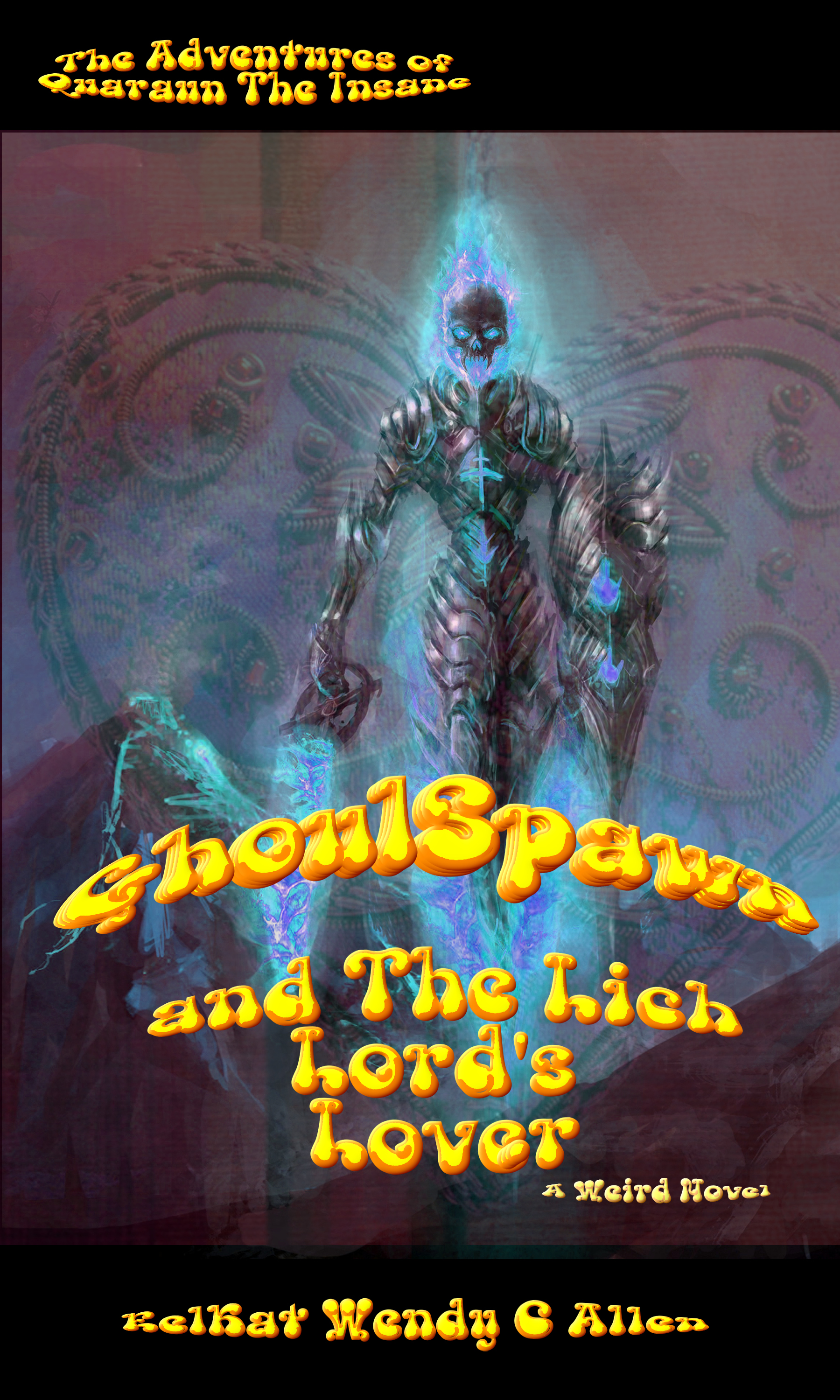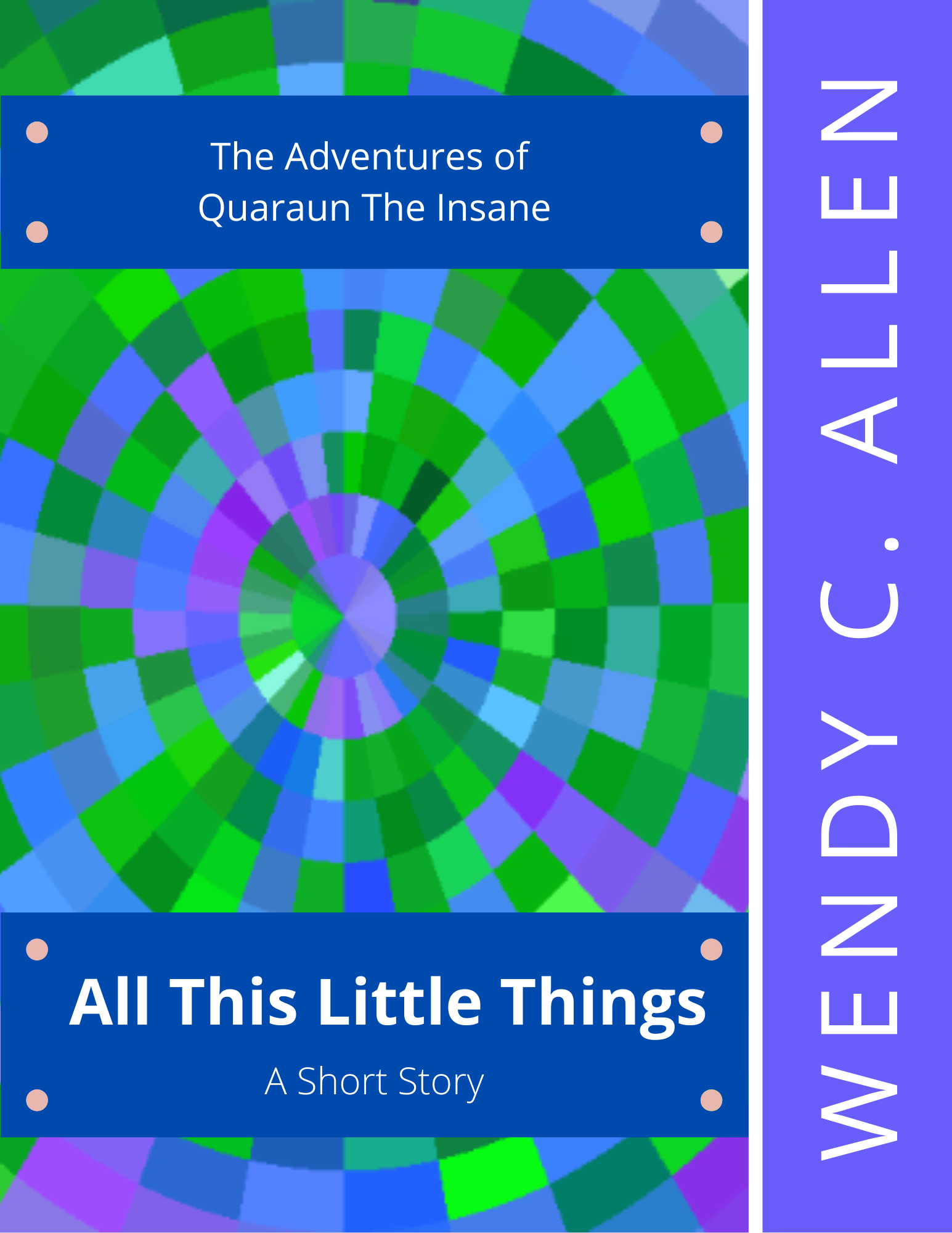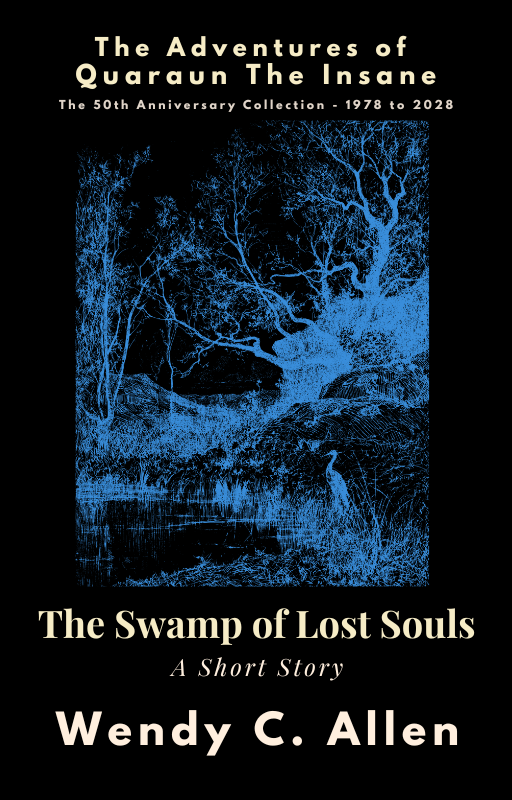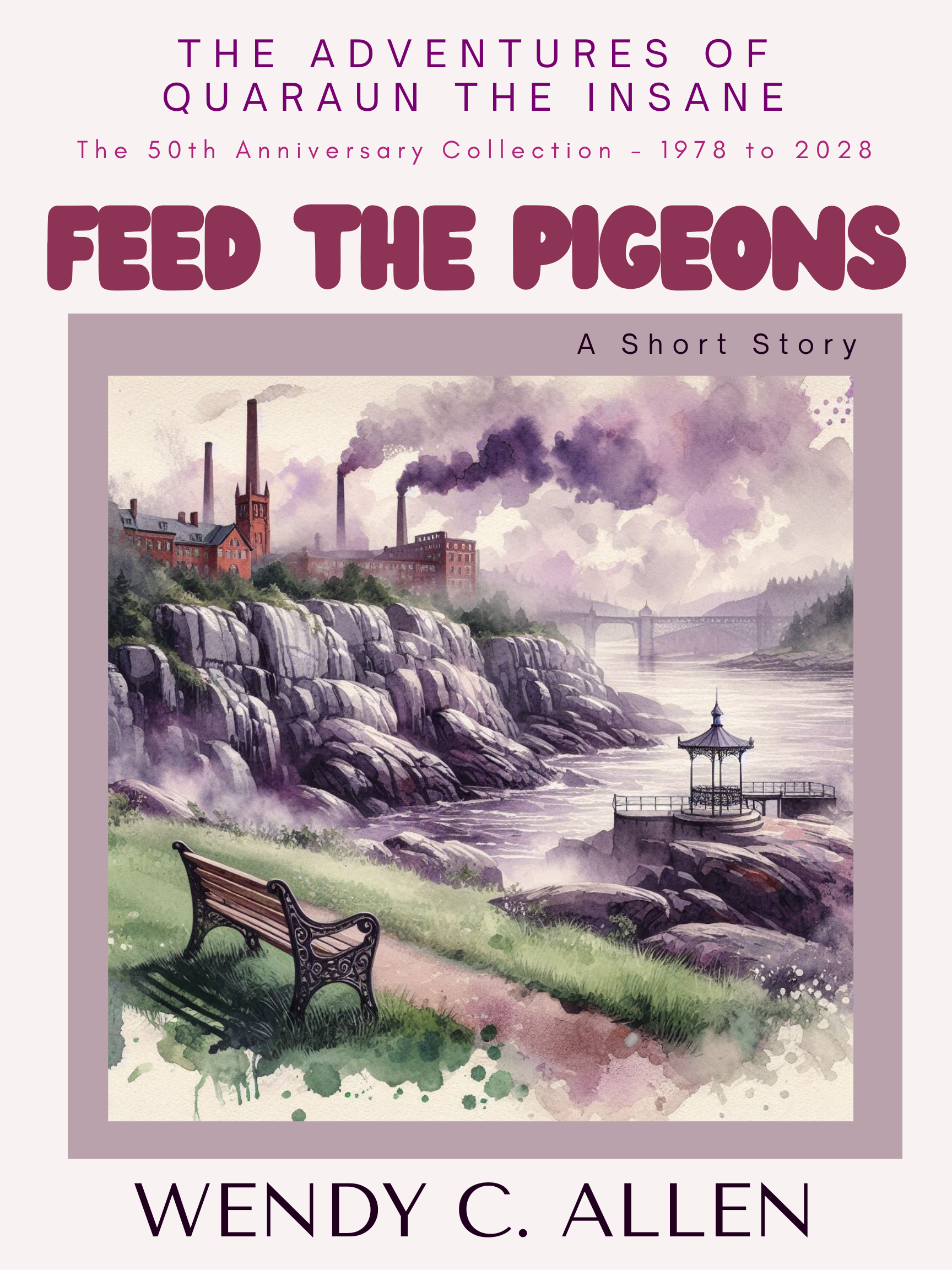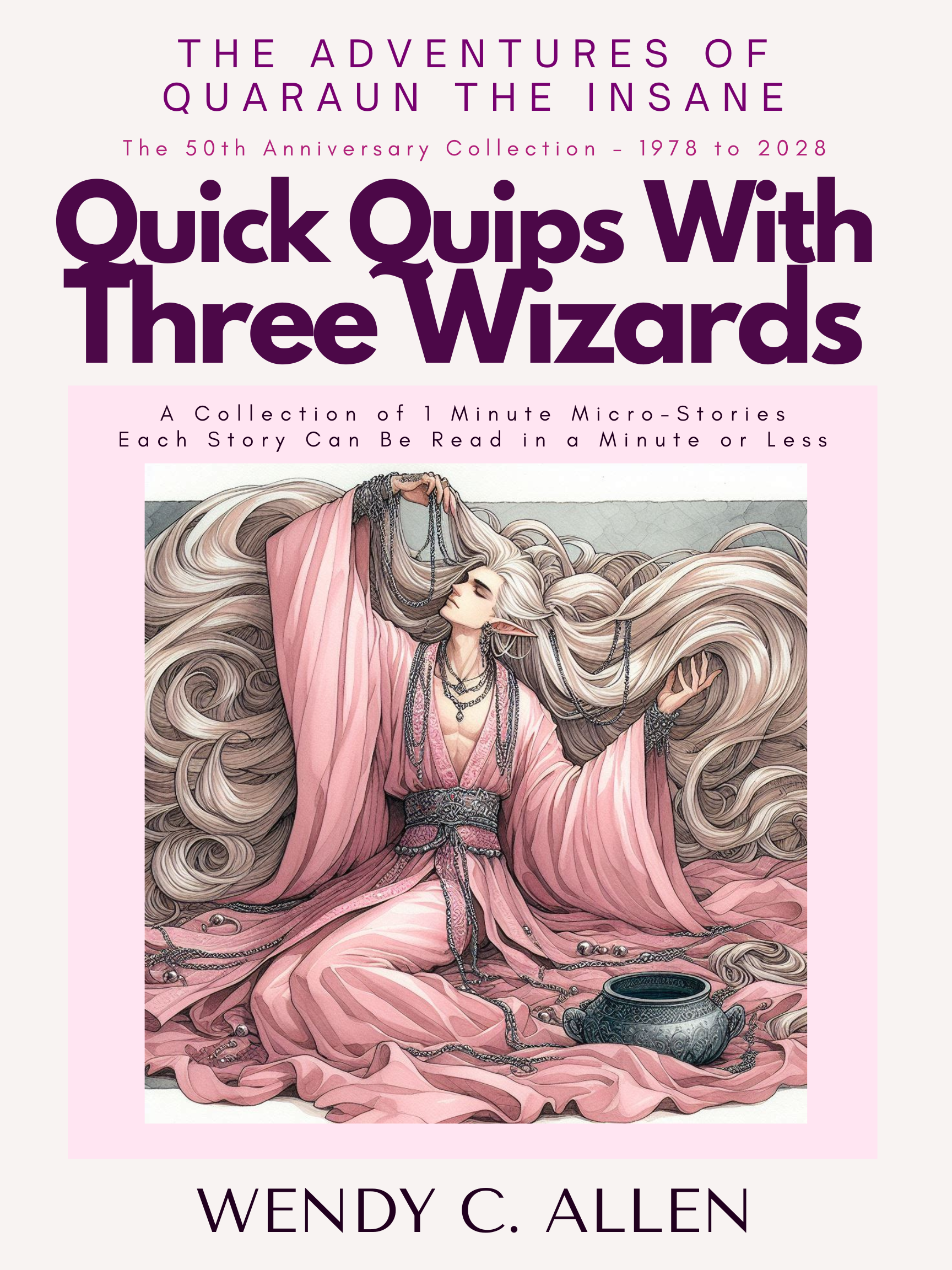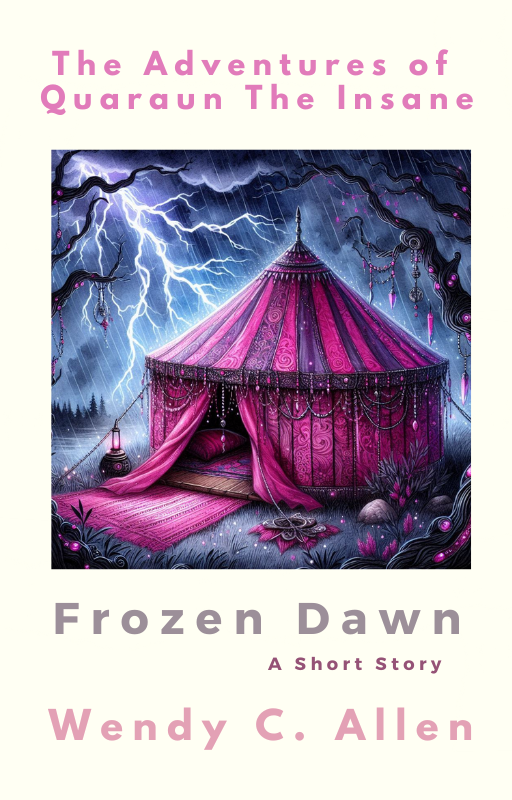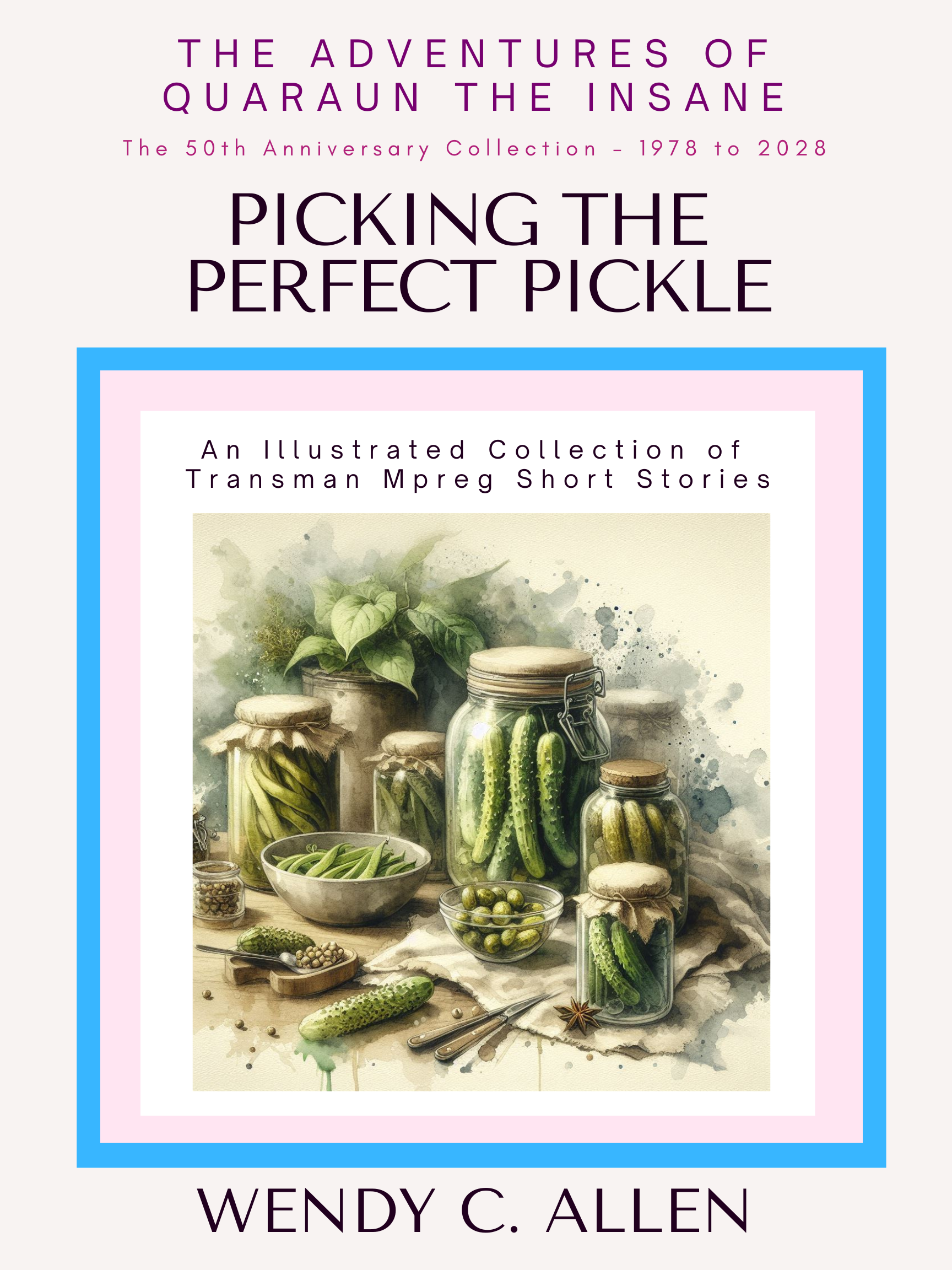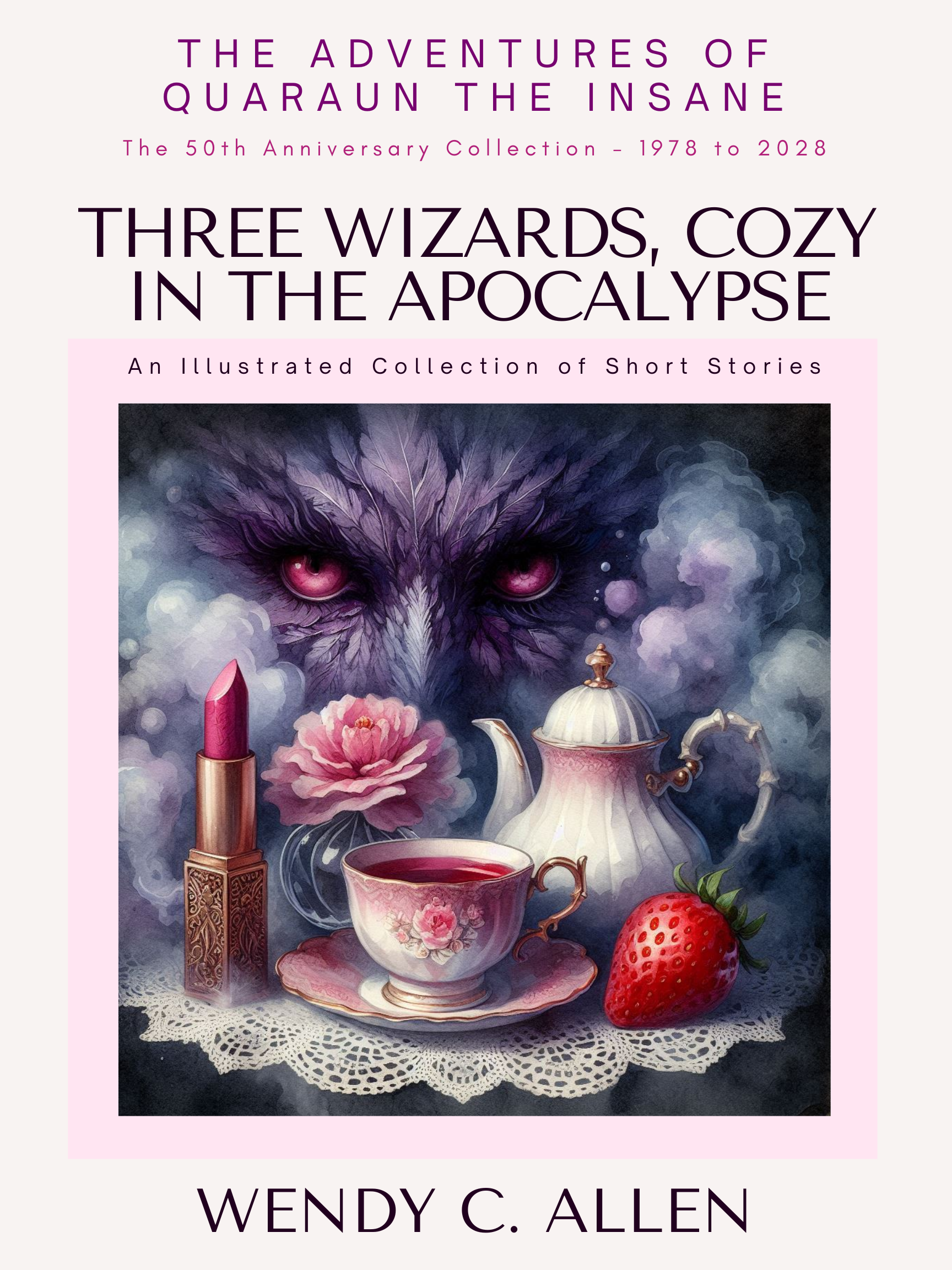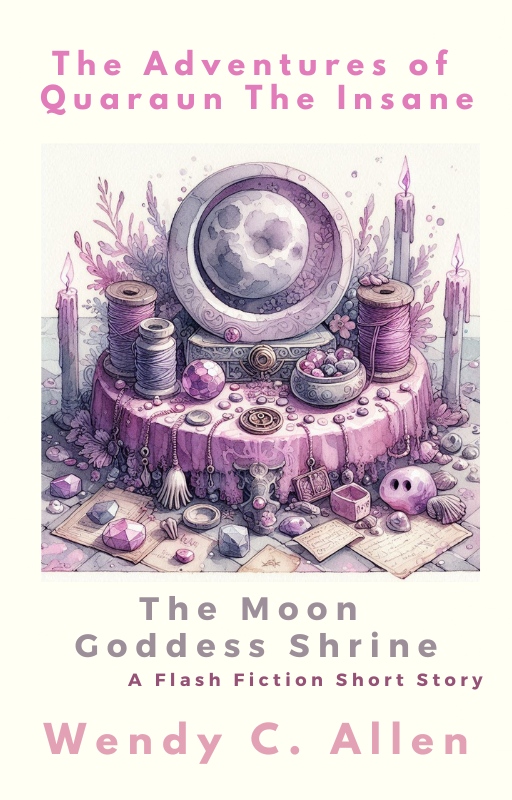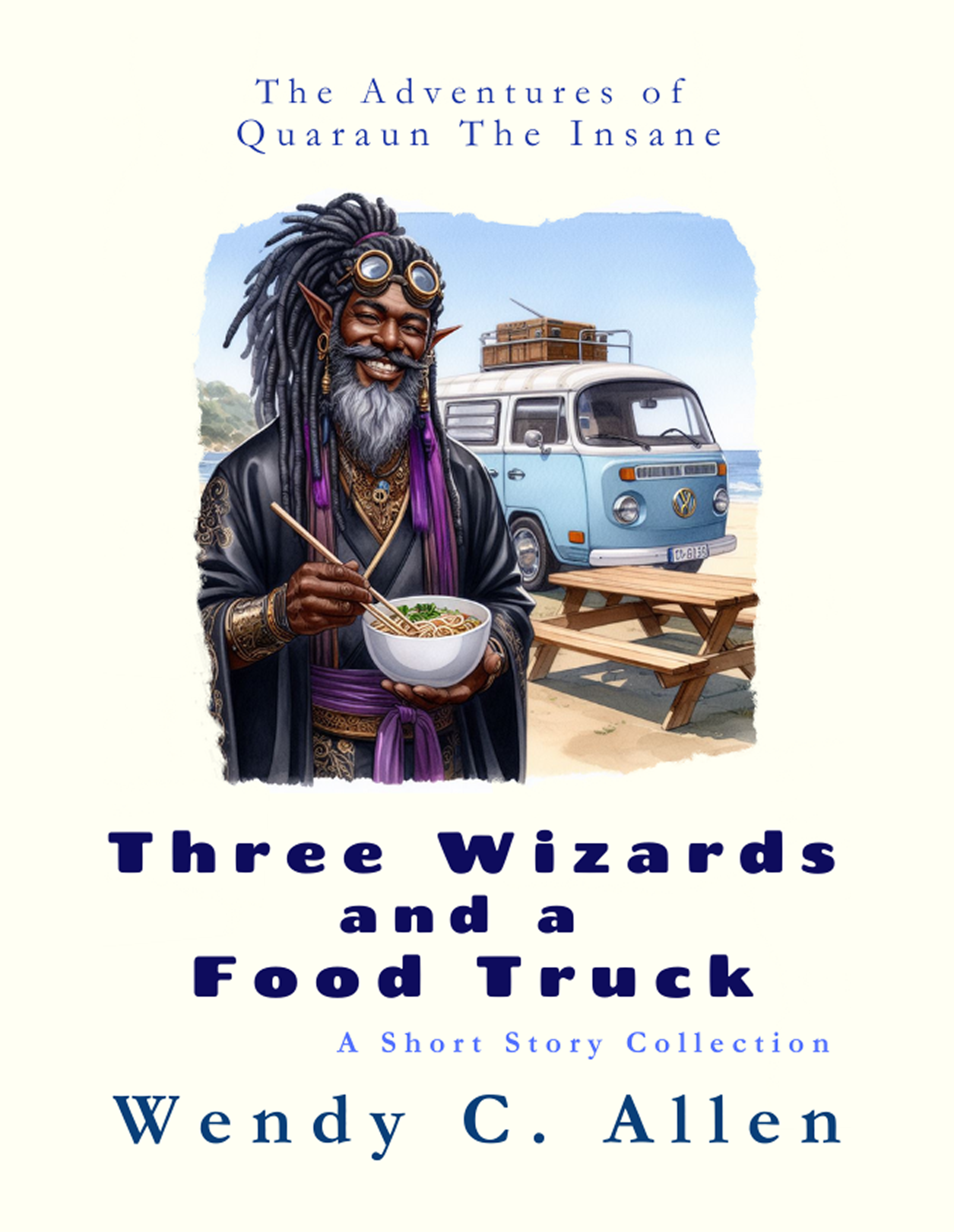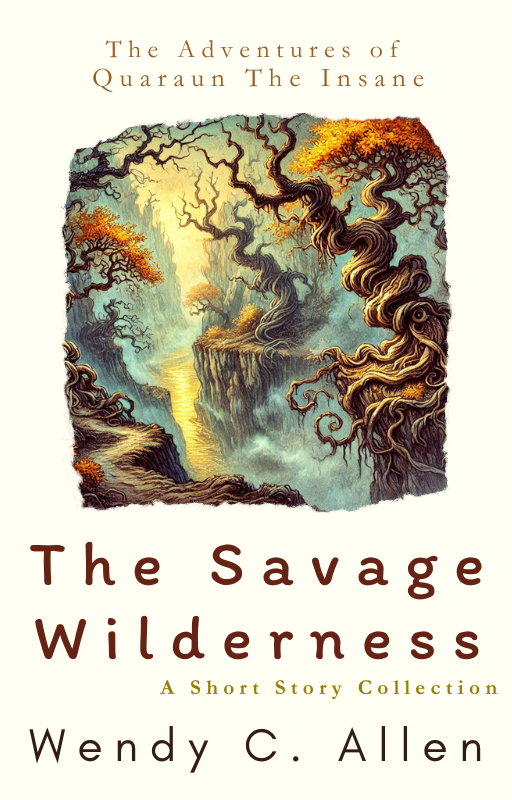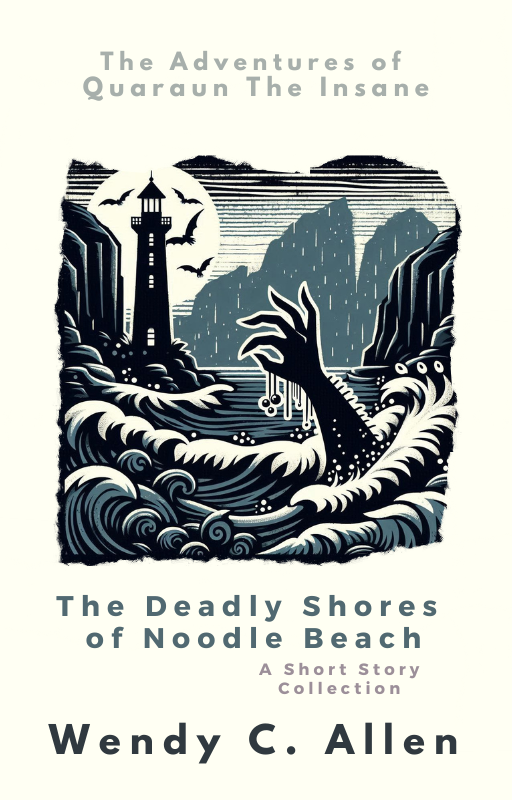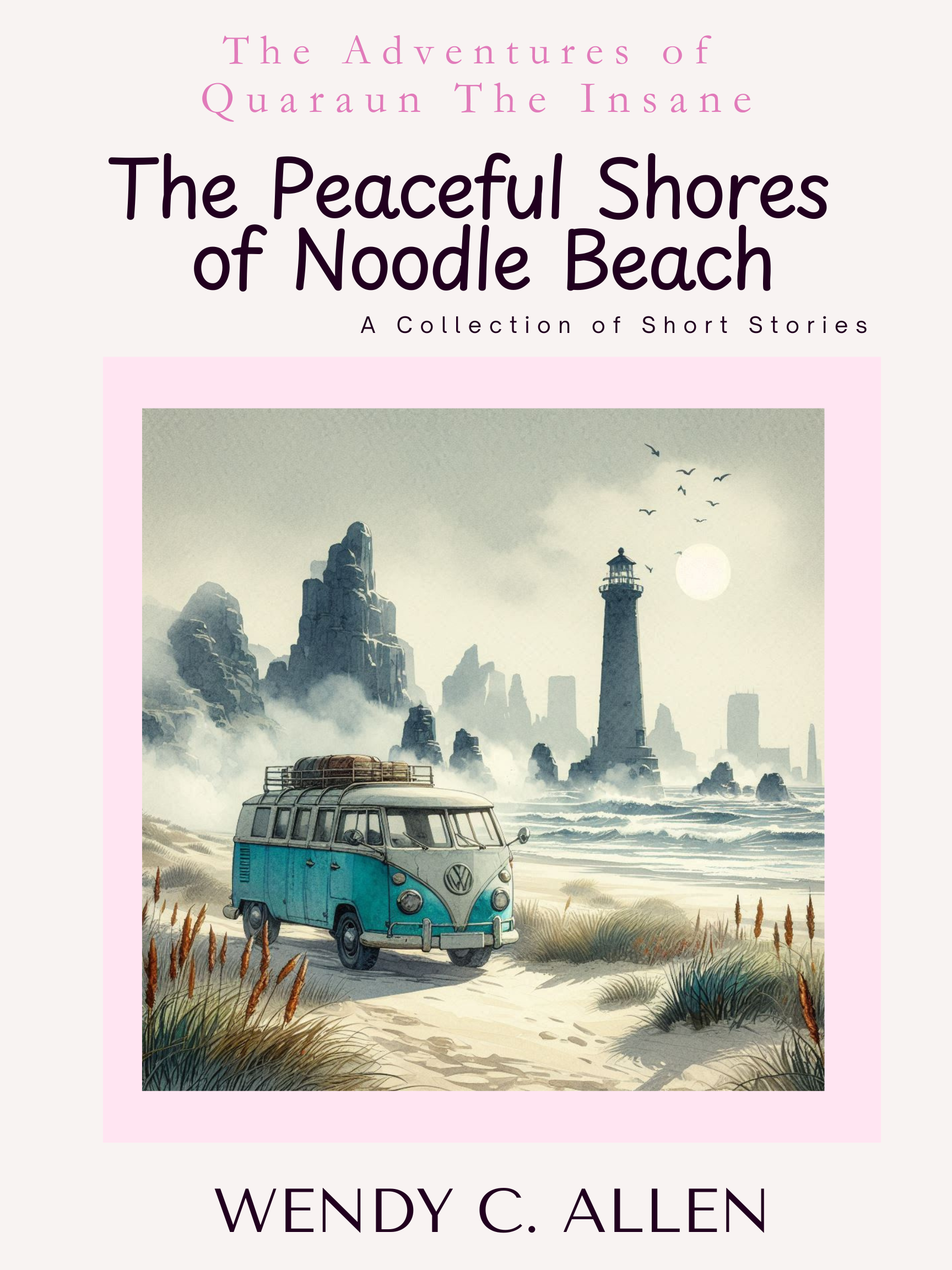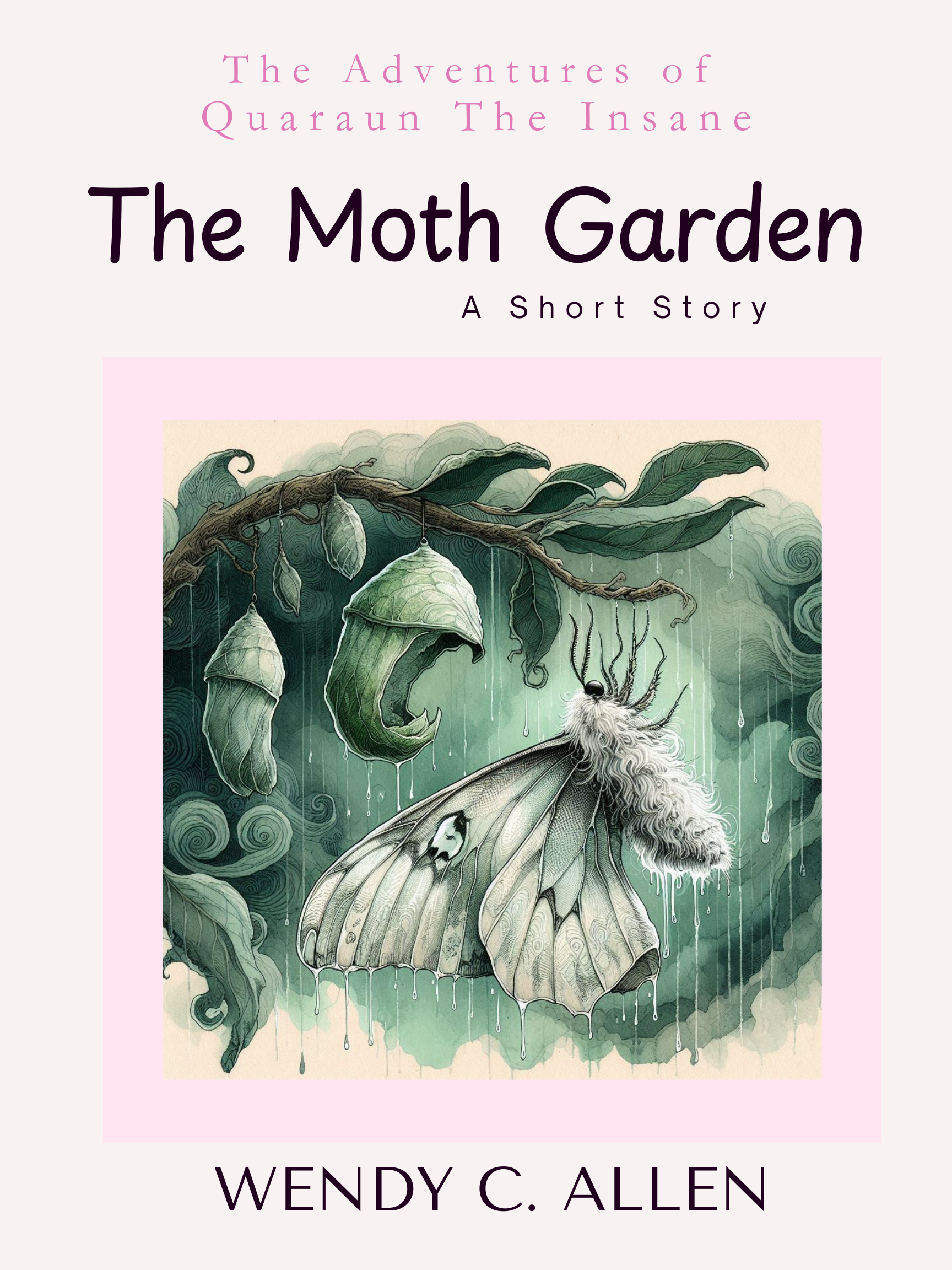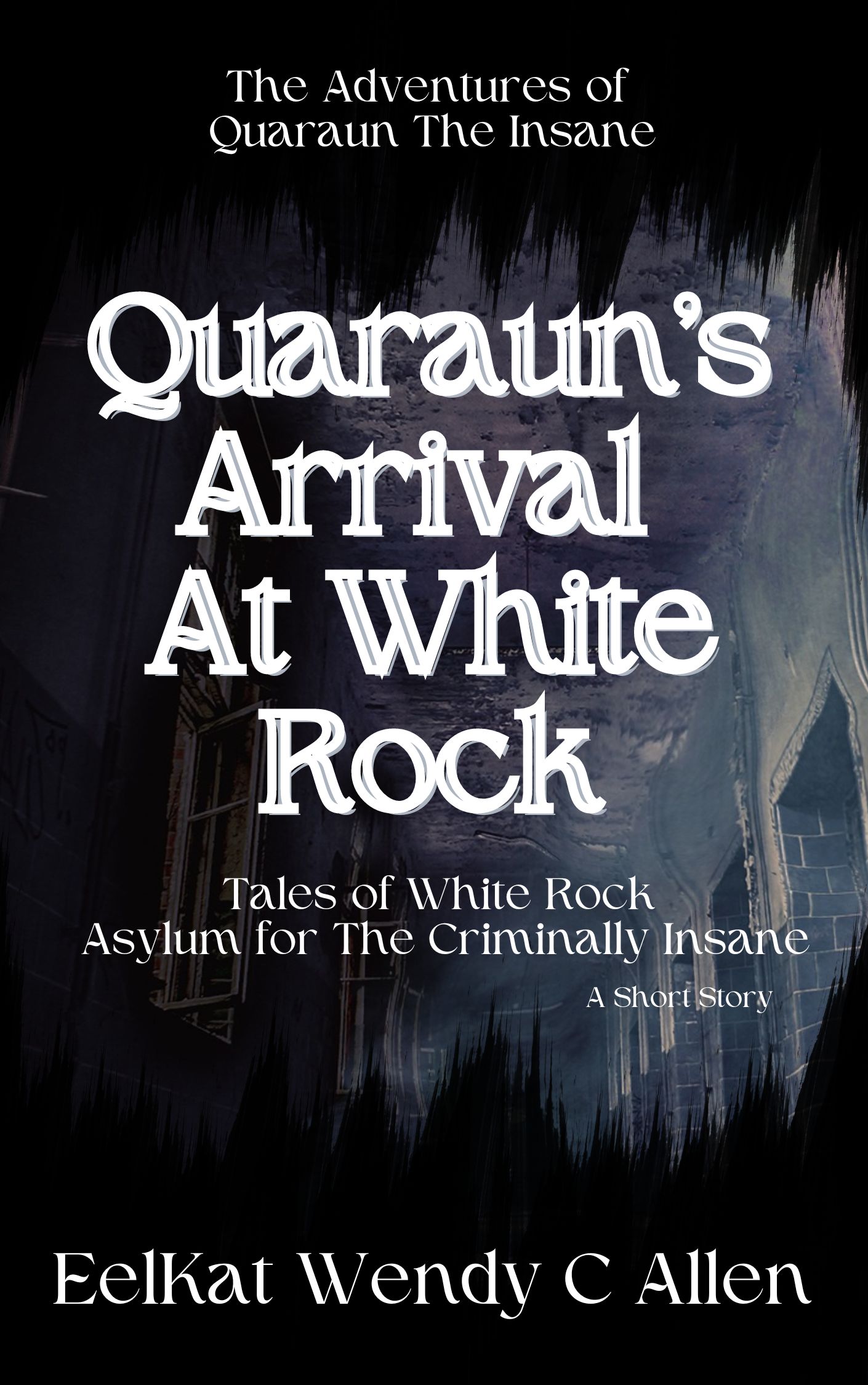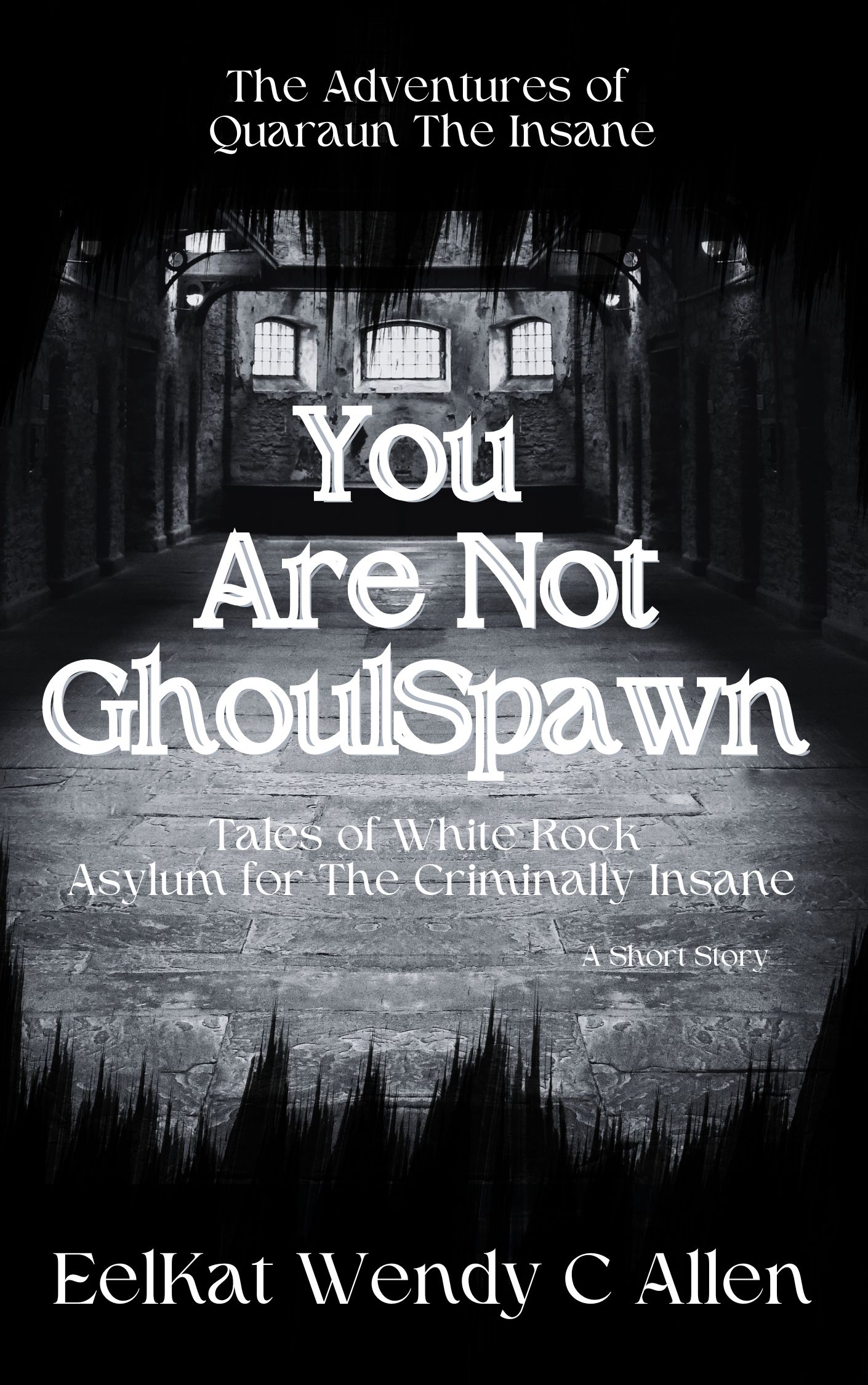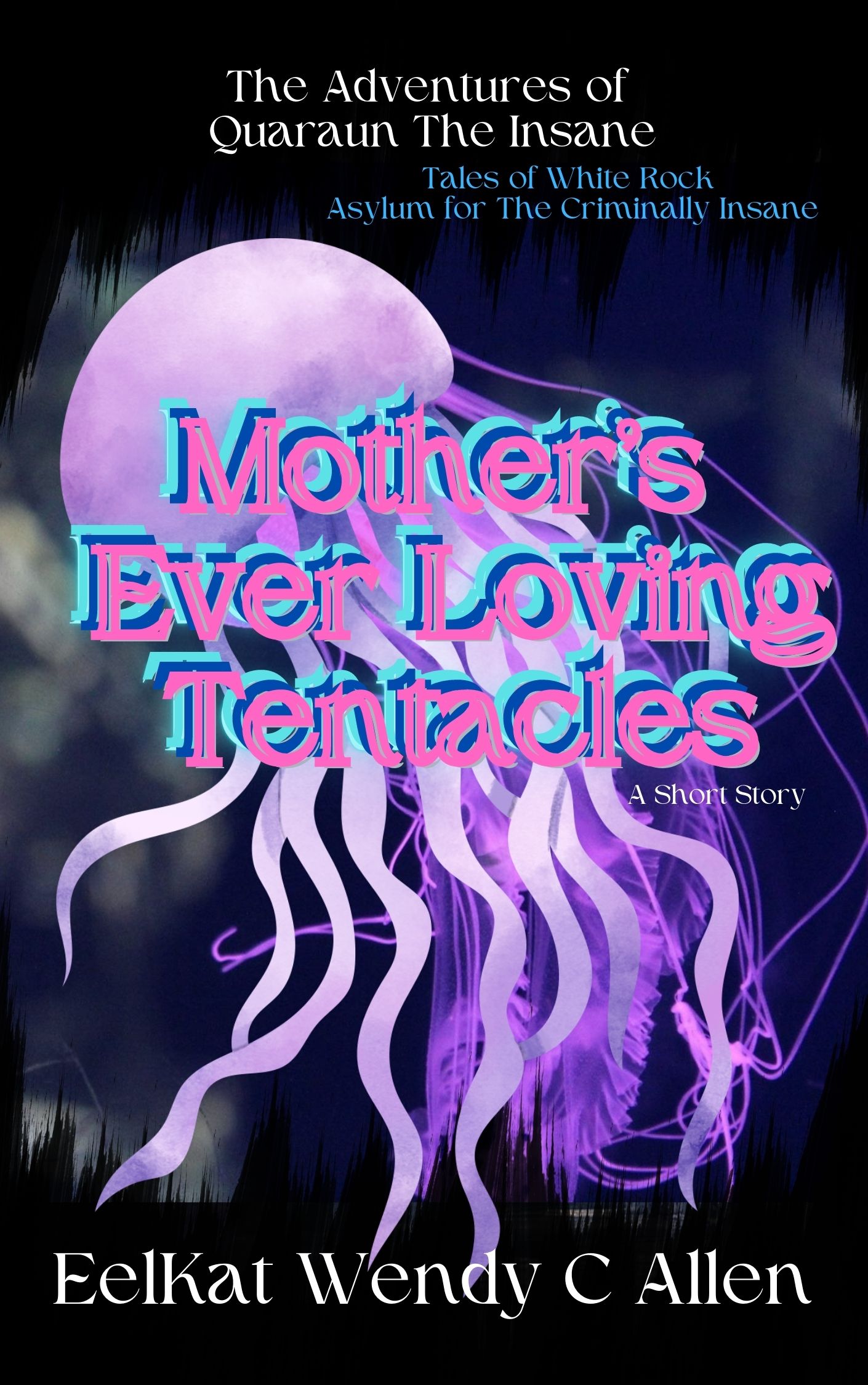Counting Down to the 2028 50th Anniversary of my first published book (September 23, 1978)
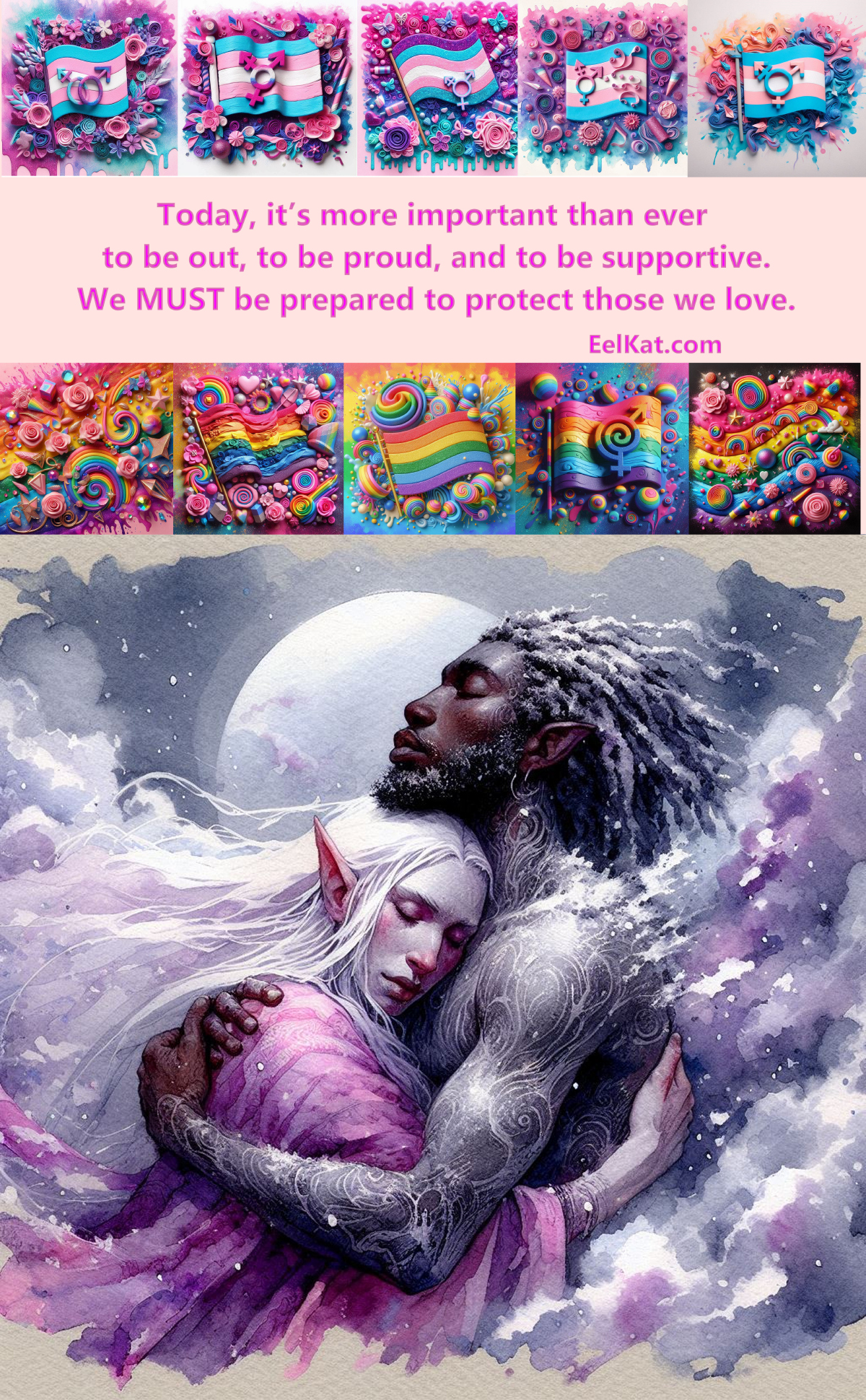 Transman Quaraun (The Pink Necromancer) and his husband King Gwallmaic (aka BoomFuzzy the Unicorn) King of The UnSeelie Court. Main characters of The Adventures of The Pink Necromancer series. Transman Quaraun (The Pink Necromancer) and his husband King Gwallmaic (aka BoomFuzzy the Unicorn) King of The UnSeelie Court. Main characters of The Adventures of The Pink Necromancer series.
|
This website is a safe zone for LGBTQAI+, pagans, polys, trans, neurodivergent, disabled, mobile aid user, minority, cosplayers, otherkin, furries, & BIOPIC communities.
If you are a hater, you can go fuck yourself.
Happy 2026!
It is our 30th anniversary here at Space Dock 13!
On the web since 1996!
You have encountered an extremely old website that continues to exist in old web ways, the same way it has done for now three decades.
In spite of being now 30 years old this year, started in 1996, it is still heavily active and old pages updated daily, new pages added daily, still now in 2026. All hand written, all hand coded (no AI), all by me, same as it ever was.
We Still Exist: The Old Web Did Not Go Away, You Just Forgot How To Find Us
|
This site was NOT designed for mobile devices (as they had not been invented yet when I created it) thus this site looks best on a computer, at 1280x768 or above. |
This is a very old website created in 1996, so, yes, javascript is needed for the site to work as it should. If things don't function, you may need to update javascript drivers on your device |
This site tries to be mobile friendly but it's been online since 1996, so old pages may not load right on mobile devices, and as this site has had pages added near daily for 30 years there are now over 20k pages here. |
Having started out in life as a GeoCities site, this site contains glitter, bright colours, blinkies, moving gifs, and other things the old web was known for. |
EelKat's Guide to Character Creation:
Using & Writing Mute Characters
Home
/
EelKat's Guide to Character Creation
/
Using Mute Characters
After 14 years online, let's update this page.
The original article, originally appeared on Squidoo in 2007 and was moved here to EelKat.com in 2013.
The original article remains unedited and un-updated and can be found lower down on the page. That article was written comparing the reader question to The Twighlight Manor series and focused on the characters this question applied to.
However, in the 14 years since writing that answer, I've since written many more novels, and many more short stories, including 14 years ago the novel Zebulon's Captive had not yet been written.
I was on Reddit today and found a similar question (embedded below) and remembered this article and thought: "I should update it with info about Zebulon's Captive", so that's what we are doing today.
My main character is mute. ... How can I have them interact in a believable and interesting way, while the secondary character learns the language?"
Below is the original question, which came from an email that was sent to me in 2007 and does not have an embed code to anyplace.
"My main character is mute. He was born without vocal cords, so he knows ASL, and has learned to cope. Any tips so he comes across as more believable and genuine, and can still come across as sarcastic if he wants to? The story's written from his perspective.
However, my MC is interacting with another character, who does not know ASL. How can I have them interact in a believeable and interesting way, while the secondary character learns the language?"
Below is my 2021 answer to this question, applying it to the more recent novel Zebulon's Captive and stories following it. If you want to read my 2007 answer, scroll further down the page. There is a note telling you when it starts, so you can find it.
Known as Sunta' in The Twighlight Manor series, Quaraun is dramatically different in The Quaraun series than he is in The Twighlight Manor series. The most noticeable difference being that Sunta is largely mute, save for once in a while shrieking a loud, long scream and hitting himself.
Sunta' remains the mystery of The Twighlight Manor with other characters not knowing who he is or why he has locked himself deep in the far reached of the Manor's West Wing.
In the novel Zebulon's Captive we see Quaraun, the formidable pink necromancer, whom the whole universe flees in terror from, start his evolution into Sunta', the childlike mute who does little more than sit on the floor rocking back and forth while clutching his fisted hands to his head and screaming any time someone gets close to him.

In Zebulon's Captive, the readers go with Quaraun, and witness first hand the events which caused his dramatic descent into insanity, but the other characters in both series, did not witness what happened and are left not knowing why Quaraun stopped talking or my he ceased being able to function at all.
In the Twighlight Manor series, the reader is never told Sunta' and Quaraun are the same person. They are so different from one another that no character ever realizes Sunta' is in fact Quaraun who went missing and is now presumed dead these past hundred years.
In the Quaraun series characters witness Quaraun fall through a portal, than re-immerge 10 days later as the mute deranged Sunta' and BoomFuzzy and GhoulSpawn recognize that this is Quaraun, but are horrified by the dramatic change that has occurred, and remain unaware that for every day that passed in their world, a decade had passed in the portal world Quaraun had fallen into.
And so while only 10 days have gone by for BoomFuzzy and GhoulSpawn, one hundred years have gone by for Quaraun.
Throughout the series the Crystonites are devoted to killing the baby that would grow up to cause The Battle of Ongadada. Time and history are constantly shifting and changing as the Crystonite people go back in times, hundreds, perhaps thousands of times, killing the same baby over and over and over again, in different place, at different times, and no matter how many times they kill the baby, it always comes back, born somewhere else, another time, another place, another dimension, and always finds a portal making it's way back to Quaraun and eventually the city of Ongadada.
Because the baby's birth caused them to create time travel, the Crystonites can never get rid of the baby. Because the macaque of the city of Ongadada incites them to create time travel, they can never stop the Battle of Ongadada from happening.
In Zebulon's Captive we see the side effects of one planet's having ripped apart the fabric of the universe through endless time travel, as unstable portals are now dangerously looming everywhere and not only entire planets, but now also entire solar systems are being sucked into the portals and lost forever.
With so many planets and so many solar systems vanished forever, the remaining planets are plunged into terror driven chaos as the end of the universe draws nye, and governments scramble to find a cure for the dying solar systems.
In Zebulon's Captive 2525 is nearly here, and Quaraun, a timid Elf from 1458, stumbles into a portal that drops him nearly a thousand years into the future, into the chaos of the end of everything. The after effects of Ongadada, to see what will happen, if the battle isn't stopped, and to learn his own roll in this event, and to be faced once and for all with the choice: kill his own child or let the world burn.
One should never know one's future, but even less should one know of the long term side effects of one's choices.
Faced with the reality of how choices he made a thousand years ago, would cause the end of everything, Quaraun's mind is shattered, because he can't bring himself to kill his family and he has seen first hand what will happen if they live.
And thus Quaraun returns home, mute, and seemingly deranged.
The reader went with him to the future. To the years leading up to 2525 and saw what Quaraun saw. Quaraun walked in this world for 100 years and saw the horrors of society brought to it's knees.
But he did not care. Not at first. Not until he met Zebulon. The man who did not care if the world ended. All he cared about was money, and how much he could make off the suffering of others. A slave trader. A breeder of race creatures. Moon Elves have been extinct for 500 years, and one just fell out of the sky. Quaraun becomes Zebulon's latest captive and he sees the future, from inside one of the galaxies worse criminal organizations. A group that never would have come to exist, had his family died a thousand years ago, when they were supposed to.
The long term side effects on necromancy, combined with the portals opened up by time travelers has destroyed the world.
And knowing this, knowing everything, while in this world, Quaraun finds her once again, the pregnant Elf, once again beaten nearly to death, again her baby dies, again, like a thousand times before, Quaraun can't walk away and leave her to die. Now knowing what will happen, if he doesn't walk away, once again he opens a portal and takes her with him, back to the past, back to 1458, back to BoomFuzzy and GhoulSpawn.
Once again, as every time before, Quaraun remembers it all, every time he's rescued this girl, always the same girl, always from a different time, a different place, but he always brings her back here, to the same time and same place, so that GhoulSpawn and BoomFuzzy never remember, never know, he's brought her back before, again, and again, and again.

But this time is different. This time, now Quaraun knows what will happen because of his actions.
Because he saved a girl from death.
And he can't live with it.
He couldn't let her die.
A necromancer, who became a necromancer to resurrect the one he loved. A necromancer who can face death and can not walk by and leave someone to die. A necromancer who must restore life to all dead he meets. He could not walk by and let her die.
And now he must live, knowing that by saving one he has condemned billions.
Quaraun's mutism is 2-fold. Partly from an injury and partly from shock.
Quaraun becomes silent, contemplating his actions. Self absorbed.
He's seen the results of what will happen, and decided not to save her, should he meet her again. This troubles him and torments him. He can't talk about it.
But at the same time, he's trapped. Captured by Zebulon and trying to escape not only Zebulon, but also this world. Desperate to go back home to BoomFuzzy and GhoulSpawn.
Years pass and Quaraun has nearly given up hope of ever returning to his own time. His resolve to prevent this world from happening has greatly weakened, as his resolve to be reunited with BoomFuzzy takes over.
And than it happens. Zebulon's men attack a young pregnant girl. And without thinking Quaraun saves her life and kills the men who attacked her. Only after saving her, does he recognize here and realize who she is. He's saved her again. Here of all places, in the time line that had been caused by her not dying. He had expected to find her here.
The shock of realizing, he can not change time, he can not stop himself from saving this girl, is interrupted by more of Zebulon's men, arriving and retaliating, leaving Quaraun crippled, disfigured, and horribly injured.
Then another portal opens up, and Quaraun runs through it, taking the girl with him. And we never see Quaraun speak again.
The reader knows why, by the other characters, BoomFuzzy, GhoulSpawn, they don't know. So they do what they always do in cases like this. They send for FarDarriig, the mind reader.
Stricken with horror at what he sees in Quaraun's mind, FarDarriig has no time to tell the others why Quaraun has stopped talking, before Quaraun killed him to prevent him from revealing the truth.
When the others, stunned by what they have seen, ask Quaraun for an explanation, he refuses to speak and instead writes on the ground, with Fardarriig's blood, words they had all heard before:
"I loved my children, but I loved BoomFuzzy more,"
Once upon a time, Quaraun's lover BoomFuzzy had commit suicide, and to resurrect him, Quaraun murdered his 4 small children.
Not knowing the full implication of what he meant, they understood: This girl he brought back through the portal with him... like BoomFuzzy, he loved her and would kill anyone who get between them.
And that brings me, back to your question:
"My main character is mute. He was born without vocal cords, so he knows ASL, and has learned to cope. Any tips so he comes across as more believable and genuine, and can still come across as sarcastic if he wants to? The story's written from his perspective.
However, my MC is interacting with another character, who does not know ASL. How can I have them interact in a believeable and interesting way, while the secondary character learns the language?"
From Zebulon's Captive onward, Quaraun is mute and on a fast track to becoming Sunta' as he appeared in The Twighlight Manor series.
He could talk once, but it is unclear if he can still talk now or simply won't talk.
His vocal cords are badly damaged, and doctors who've examined him suggest that he likely could not speak due to the injury, and over time, as the years go by, that changes to doctors saying the injury has healed and he SHOULD be able to speak again, though his voice will likely be different and it will probably be painful for him to speak at length, but he continues to remain silent and doctors suggest that, he simply has gotten used to not talking and has no desire to do so any more.
While Quaraun is mute, he is not without responses to those around him.
And it should be pointed out here too, that a shift in point of view happens in Zebulon's Captive.
Prior to Zebulon's Captive, Quaraun is both the main character and the point of view character.
After Zebulon's Captive, Quaraun remains the main character, but GhoulSpawn becomes the point of view character.
This is done, because while Quaraun is the point of view character, the reader also gets to see the things he does not say. Seeing his unspoken thoughts. However, once Quaraun becomes mute, while he is thinking to himself more than ever, the reader is no longer let in on what is going on in Quaraun's mind.
This leaves the reader just as confused as BoomFuzzy and GhoulSpawn are.
By shifting to GhoulSpawn as the PoV character, the reader now sees instead, GhoulSpawn's thoughts about Quaraun.
>>>Any tips so he comes across as more believable and genuine, and can still come across as sarcastic if he wants to?
In spite of the shift in PoVs, we still see Quaraun's snark and seething sarcasm. But now we are shown it through his actions, more than hearing it through is voice. We see less dialogue and more descriptive action. The look on his face, the glare of his eyes, or the flipped middle finger, go a long ways towards telling the other characters, and the reader, how Quaraun feels and what he is thinking.
You don't need dialogue to tell us a character is being sarcastic. Show it instead in their movements,, they actions, and how to look at others - the expression on their face. How they walk. How they move. What they do with their hands. How they wrinkle their nose or brow. Their gestures.
Just because someone is mute, does not mean they are without means of expressing hw they feel.
Think about your character. Ask yourself how he gets his feelings across.
>>>However, my MC is interacting with another character, who does not know ASL. How can I have them interact in a believeable and interesting way, while the secondary character learns the language?"
Only .3% of the world knows American Sign Language.
Even most people who are mute don't know ASL.
Fewer than 12% of all mute people on the planet know sign language.
In fact, so FEW mute/deaf people know ASL, that is is INCREADIBLY UNBELIEVABLE for every fictional mute/deaf character to know it.
It actually comes off as extremely fake if your mute character knows ASL, because so few actually mute people in real life know ASL.
When a mute character knows ASL in a fictional story, it is a glaring red flag that points to the fact that the author did not do their research to find out how very rare it is for a mute person to know ASL.
The issue is that a speaking author, is used to thinking in terms of vocal cues, and doesn't realize that mute people are often also deaf or hard at hearing and so DO NOT automatically default to vocal thinking.
In fact, they don't often default to trying to communicate with others at all.
For many real life mute people, sounds are not a think we think about. (myself, I was mute from the age of 14 to the age of 42, and am almost deaf, have been my whole life, so speaking from experience here)
As is typical of vocal people, no one ever made any attempt to communicate with me.
Everyone always had the attitude of: "She's stupid" or "She's retarded" or "She can't understand us." So no one ever bothered to talk to me at all. And it's been that way for 50 years.
This means I did not grow up expecting to talk to people or expecting people to make any attempt to talk to me.
And for a good 80% of mute/deaf/non-vocal people, you will find this is how they were raised as well.
While people like to think they are good, kind, loving, and accepting of others, the truth is almost 0% of society is good, kind, loving, caring, compassionate, or accepting of others.
Just as Christians see themselves as good and compassionate while they murder gays and Jews, so too to vocal people see themselves as kind and compassionate while they avoid eye contact, push aside, and otherwise completely ignore mute people,
And while you could said: "But parents and friends aren't like that..." I will point out that parents are the WORST of all and what friends? No one wants to be friends with someone who can't talk.
Parents don't love their mute children. They are ashamed of their mute children. Lock them in closets when company comes over. Beat them mercilessly and laugh because they know the child can not cry out for help so the beatings are never heard by the neighbours allowing the parents to beat the child to their hearts content.
Again, speaking from experience.
Schools that teach mute children American Sign Language START at $20k per semester, and can cost a family well over 3MILLION dollars by the time the child graduates high school. And few parents have enough money to send their child to an ASL school, and even fewer are willing to spend that kind of money on a child when they could spend it on 2 or 3 new cars to show off to their friends with.
>>>However, my MC is interacting with another character, who does not know ASL. How can I have them interact in a believeable and interesting way, while the secondary character learns the language?"
Do you have any idea how unbelievable it is, that a mute character knows ASL?
Or worse, do you have any idea how laughable implausible it is that someone would spend $40k or more just to learn to interact with someone they hardly know?
You clearly have no clue how exhorbantly expensive scam artists, I mean ASL schools are.
I've known somewhere around 5 dozen mute people in real life and I've yet to meet anyone mute or otherwise who knows ASL, because in every case, their parents didn't give 2 shits about them, too busy with their social life to care about the mute child they were ashamed to admit they birthed.
You want the mute character to communicate believably?
Really?
Why?
Why are you focusing on the mute character and NOT the non-mutes around them?
If you wanted to make your characters believable:
* focus on making your none-mute characters ignore your mute characters,
* focus on making your none-mute characters exclude your mute characters
* focus on making your none-mute characters refuse to be friends with your mute characters
* focus on making your none-mute characters harass your mute characters
* focus on making your none-mute characters bully your mute characters
* focus on making your none-mute characters beat up your mute characters
* focus on making your none-mute characters neglect your mute characters
Than and only than, will your mute characters become believe able.
Because than your mute characters will have to act out of frustration, NOT ASL, just like real mute people do.
I hate it when able authors write disabled characters who have disabilities the author has no clue how to live with.
Able authors give disabled characters "special abilities" - make a blind person be a pro fighter... what the fuck? Looking at you DareDevil! Make Autism look like math pros - Rainman.
They have to glamorize and fetishize the disability, or they feel they have to cure it. How many Fantasy novels give us a horrible disability only to have some mage snap their fingers and make it go away - Triss Merigold and her miraculous returning boobs after her breasts got sliced off in battle, comes to mind.
How many mutes suddenly have psychic powers in fiction or communicate with telepathy?
And than, because the author can't face how shitty the human race actually is, they have to make all their characters be kind and loving and friendly and compassionate to the disabled character. Nothing realistic or believable about that at all. Not even close.
Speaking of mutes having psychic powers, here's the question that I saw on Reddit today which inspired me to update this page after 14 long years without an update:
Sign language in dialogue?
Sign language in dialogue? (self.writing)submitted 4 days ago by JGBodle
*I asked a similar question yesterday but I worded it incorrectly so I have deleted that one and am trying again*
I have a character who is mute in my book and communicates via sign language, all the other POV characters can also sign so there are no translation issues there. the question is how do I represent it within my book.
Some say to use italicised quotes but I already use those for the 'psychic' conversations within my book. Should I simply do it as a normal quote and use signed rather than said? Any advice would be great thank you.
What can I say.
How many mutes suddenly have psychic powers in fiction or communicate with telepathy?
Yeah.
How offensive is this to ACTUAL mute people?
A lot.
People want to be diverse by including disabled characters, but than they want to sweep the disability under the rug, which is just a slap in the face to actually disabled people and comes off looking like the author ONLY added disabilities to characters so that they could make fun of the disability.
When you give mute characters psychic powers, you DO make it look like you are making fun of a real world disability.
This is NOT diverse characters, this is emotional rape of diverse readers.
Think about it.
Think long and hard about it.
Than next time yo feel like being all P.C. and adding diverse characters to your book to look hip and cool - don't.
If you don't have the disability yourself, you DO NOT have what it takes to write a character with it.
Write what you know and stop making a fool of yourself by mocking disabled people.
The REASON I write so many mute characters, is because I was mute for most of my life and I know what it is like to be mute. I know how characters act while mute because I can write my own personal experiences with being mute.
Now, normally I would encourage authors to reach out and write in new areas, but, that was 20 years ago that I gave that type of advice, because 20 years ago, most new writers wrote for the love of writing, loved their characters, and were simply trying to tell a fun story for the sake of having fun telling a story.
But than Amazon invented the Kindle device and everyone and their great aunt's uncle, decided to take up writing in hopes of becoming a millionaire and now we see a good 70%+ of all new writers today, don't give a rat's ass about telling a story or having fun or being entertaining.
They don't love their characters.
They don't get to know their characters.
Heck, half the time they start writing the IDEA of the story without having any characters rolled out at all.
Here in lays the problem.
In their rush to get money, money, money, money, money, they forgot that the integral reason people who read novels, enjoy reading novels, is because
* they like to fall in love with the characters,
* they like to share adventures with the characters,
* they like to travel to imaginary places with the characters,
* they like to experience things with the characters,
* they like to feel the emotions with the characters...
...can you see the trend?
It's the characters who are important in any and every novel.
No one remembers the world of the novel.
No one remembers the grammar of the novels.
No one will remember your fancy ass prose.
Spending hours, days, weeks scouring the thesaurus for just the right word, only makes you look like a fool. No one cares about you right word. In fact, they will roll their eyes and put the book down.
Readability matters. If YOU have to look up words in the thesaurus because you wanted to sound like a super cool smart ass, how do you think the average reader, who in America only has a 3rd grade reading level, how do you expect THEM to be able to enjoy what you wrote? They won't, because they won't even be able to understand it.
Every time the reader has to set the book down, that's a potential reader who will NEVER pick the book up again, and NEVER buy your second book.
The goal of the author should be the keep the reader reading. To draw the reader in with an interesting story about interesting characters, and tell the story with COMMON words that flow smoothly.
Uncommon words cause the reader to put the book down to go look up the word and find out what it means.
Every time your clever prose causes the reader to put the book down and look something up, you give your reader a chance to be distracted by something else and never return to finish reading your books.
THIS is the common problem of many new readers. They spend hours searching for just the right word to make themselves sound big and important, and come off looking like an arrogant, pretentious fool who looks down on their readers.
Good storytelling is better than clever prose.
"Clever prose" means using big, pretensions words, that the author spent days/weeks looking for in a thesaurus for the sole purpose of writing using big words that no one ever heard of just to make themselves feel important.
Sure, you can have both.
But prose found in a thesaurus without storytelling is empty, pointless shit that no one gives a fuck about.
Storytelling without prose, can stand on it's own two feet and survive just fine.
Your readers remember the characters.
* What do you remember more about Treasure Island? The island or Long John Silver?
* What do you remember most in Fall of the House of Usher? The house or Roderic Usher?
* What stands out most about Lord of the Flies? The island, the moral of the story, or the psychotically deranged group of children who slaughtered each other mercilessly?
This is true of every story be it a novel, a novella, or a short story.
The characters are the single most important part.
The character will make or break the story, by how much the reader connects with them.
And dialogue is what brings the reader closer to the character.
EVERY DAY COMMON dialogue, not snooty patooty clever prose dialogue no one without a wall of PhDs can understand.
If the common reader with the common education can not understand a word the author wrote, they'll never fall in love with the characters, and if they never love the characters, they'll never finish the story.
Good prose is needed. Yes. But clever prose, is pure shit on a stick that turns readers away.
Common prose for common people is why genre fiction sells millions.
Clever prose only understandable by people armed with thesaurus can under stand, is why literary fiction sits unsold.
A mute character is hard to love. Because they have no voice.
No one love real mute people. This is a simple fact of life. If you are mute, the world hates you for no reason at all. You are different and different is evil.
And when you choose to write a mute character, you make your novel actively not marketable.
And this is true of EVERY disability.
Ableism is the biggest form of bigotry in the world.
Even people who scream for race rights and religion rights and gay rights, will shun you for being in a wheelchair, for walking with a cane, for being blind, for being deaf, for having downs syndrome, for having autism.
Ableism is the biggest plague of humanity.
Nothing we as writers can do about it.
But that is part of the problem.
Many well intentioned writers will try to disabled characters in their story for no reason at all, other than to feel they are being inclusive. Which is all well and good, except they did not design the story around that disability and they added the disabled character as an after thought, only after ne of their beta readers pointed out there was no diversity of characters.
So now, they are editing their 3rd or 4th draft and changing one of their characters to be diverse. They don't fell comfortable changing race to Black or Asian or whatever, because they are white and feel they can't pull off a character of another culture, so they go: "I know! I'll put a disabled character in! What's any easy disability to write, one I don't have to research much? Wait mutism is easy to write! All I have to do is remove their dialogue and change it to American Sing Language! Yay! I can be diverse without changing my story!"
And so mute characters become a dime a dozen in novels.
And if you were to believe every novel, you'd assume 100% of all REAL mutes know American Sign Language AND have a full support team of adoring family and friends to help them alone. Ain't life just hunky dory for all them mutes, yay!
Nothing could be further from the truth.
Authors treat mutism like it's just speaking a different language. BOOM, let's change the dialogue from English to ASL and we all set to publish.
And BECAUSE the author ONLY knows mutism from other FICTIONAL novels written by equally ill informed authors, NO ONE ever writes mutism accurately, correctly, or in any way believable.
If you are mute, chances are high you also have a hearing problem, a bad one, and have walk with a cane because of it.
Is YOUR mute character walking with a cane?
No? Why not. Most REAL LIFE mute people can't walk without a cane, so why do ZERO fictional mute people ever use a cane?
Do you know why mute people, REAL mute people, walk with a cane? Because they have no sense of balance and fall over every time they take a step. Why? Because the same organs that cause you to be able to talk, also cause you to be able to balance.
If something is wrong with your vocal chords, there is almost a 100% chance there is also something wrong with your inner ear, and the fluid flow around your brain. As well as your sinuses, meaning you probably have a constant flow of mucus coming out your nose, you also probably cough up mucus every few minutes.
Does YOUR mute character do any of that?
Being mute, is a hell of a lot more than just speaking a different language with your hands, and unless you are mute yourself or are the parent of a child born mute, there's a good chance you never knew how vastly disabled a mute person actually, how difficult it is for them to even walk or breath... and you are doing them a huge disservice wen you slap mute characters into your novels because you want to be diverse and think writing a mute character is as easy as just changing their language from English to American Sign Language.
But, the questions here deal with dialogue, right?
Specifically the dialogue of a mute person.
I originally took up writing because I was mute.
I had no other way to communicate.
There are reasons why I was mute, which I won't go into here, but I talk about n detail on several other pages of my site, so it's easy enough to find out what happened.
I fact is, I was born with speech, hearing, and eye/seeing medical issues.
I've had a slur/stutter since I was a baby. I still have it, though it's less now thanks to speech therapy classes I took in my 40s.
I am severely hearing impaired. I have been since I was born. As a child, I tested at having the hearing of a 60 year old, and it's grown worse over the years. Now 50 years later, I am almost deaf and do not hear people when they talk to me. I do more reading of lips than I do hearing of words, so you MUST be looking straight at me while you talk, and I MUST be looking at your face, otherwise, I will not hear a word you say and I will not know you said anything to me at all.
My inability to hear well causes more issues than my vision and speaking impairments.
Also I come from a culture where women are not allowed to speak unless a man gives them permission to, and she can not ask for permission. She must be given permission to even ask for permission. So I NEVER start/initiate conversations with ANY ONE... EVER. Before you can talk to me, you must get permission from a male relative to ask him for permission to speak to me, and if I am to answer you he must grant permission for that as well. Females have no freedom or rights in Gyps culture.
So, AFTER you get permission to speak to me, THAN you have to get my attention to get me to NOTICE that you are talking.
I can not hear you speak, I need to read your lips. But, I'm not allowed to look up, women are required to always look at the ground.
One I'm looking at you, I can read your lips IF you are close enough to me. I can only see 18 inches in front of my face. Less than 2 feet. So you need to be VERY close to me before I can SEE you talking and try to translate what you are saying.
This process makes talking to anyone rather difficult for me and is why you see me talking on Twitch streams and YouTube videos, because I can face the camera and talk, but also why you see me NOT talking to actual people in face to face conversations, because I can not hear or see what you are saying, making it incredibly difficult for me to understand what you want and reply accordingly.
I've lived with this issue my whole life.
I don't know what it is like to see or hear normally the way fully sighted or fully hearing people can do. And as such, I have great difficulty in writing people/characters who have good vision or good hearing, and is WHY the bulk of the characters I write have hearing, speaking, and or vision issues. I write what I know.
I've been legally blind on one eye and nearly blind in the other eye since I was 8 years old.
I've suffered with Selective Mutism my whole life, I stull struggle with it to this day.
When I was 14 I suffered an injury that went ignored by adults. I became "near mute". Meaning nearly always mute and struggling to form fragmented phrases, let alone full sentences.
I remained "near mute" until I was 42 years old, when I had an MRI for other things, and the MRI revealed, I had suffered a serious injury to my jaw, and no one thought to take me to the hospital.
At 42 years old, I had surgery on my jaw, replacing much of my jaw bone, reconstructing the muscles/bones/nerves, and the exhorbantly expensive root channels, removal, and porcelain replacement of 7 teeth from the canine tooth back to the morals.
And miraculously, a month later after the stitches were gone, the incisions healed, and swollen gone away... I was suddenly able to talk for the first time since the cinder block had been used to beat me in the face at 14 years old.
Today, I can talk, and I've been revealed to not be "retarded" as the adults had told every one I was for so many years.
Unable to talk, I was also unable to tell people how much pain I was in or that my uncle Bruce Mervin Atwater had beaten me in the face with a brick and broken my jaw and teeth.
I was treated by EVERYONE - family, friends, church, and strangers - as though I was too stupid to understand them, so no one talked to me, no one bothered to read what I wrote to find out I had a brain and was also in a lot of pain.
My parents told everyone I was too retarded to talk and no one bothered to question is many they were just saying that to hide their own abuse and neglect.
This the reality of being mute.
No one cares.
People think you are stupid.
And you have no one to turn to for help.
And you can't ask for help because you can't speak.
You ca express yourself, but no one pays attention.
You can write words on paper. But no one bothers to read them.
When you are mute you are invisible to every one with a voice.
That's just the way it is.
So let's talk about dialogue of mute characters in novels, because, it needs to be talked about, because mute characters are seen far too often as "the easy" disability to write.
The problem I see time and time again with authors writing mute characters, and not only mute characters, but also any disabled characters of any type, but even beyond that and just dialogue in general, is that the author does not let the characters say what they want to say.
Yes.
You heard that correctly.
Most self-published authors simply DO NOT ALLOW their characters the freedom to talk freely.
And it shows.
Big time.
And THAT is why we end up with questions like the ones asked by newbie writers on this page here.
The difference between the question askers and others though, is the ones asking the question KNOW that something isn't quite right with their character dialogue and want to fix it, but they aren't sure what to fix.
A strange transition from talking about mute characters?
Perhaps.
But these questions were not JUST asking how to write a mute character, but rather, they were asking specifically about how to write the DIALOGUE of a mute character.
Okay.
But do you know how to write the dialogue of non-mute characters?
That's the bigger question here.
You see, dialogue is nothing more than thoughts conveyed to others.
This entire article is nothing but dialogue when you stop and think about it. It's me, conveying my thoughts to you, so that you can read my thoughts, and understand how I think, how I feel.
And that is what dialogue does in your novel as well.
You have 2 characters who want to know what each other is thinking and they find ways to convey their feelings and thoughts to each other. In most cases that is done via spoken dialogue.
But also with hand gestures, shoulder movement, face wrinkles, flared nostrils, etc.
Think about it.
A character does not need to scream to let others know they are in pain. Tears in their eyes, a grimace on their face, gritting their teeth, sucking in their breath quickly, blood trailing down their leg, dragging their leg or limping while they walk, all tell the reader that this character is suffering, without a single spoken word.
When you master the art of unspoken dialogue, you will have mastered the art of living, breathing, believable characters. And this is just for every day normal, not disabled characters.
And this is deeply concerning.
Why?
Well, think about it.
You wouldn't NEED to ask how to write a mute character's non-verbal communication, if you were already having ALL of your characters showing non-verbal communication. The very fact that you NEED to ask how to give a mute character non-verbal communication, tells me that the rest of your characters are bland and cookie cutter cut outs without realistic, living actions.
None verbal dialogue is an integral part of EVERY human being. You use it every day. Smile. Frown. Cry. Gives a thumbs up. Stick out your tongue. Give a friend a hug. Pat someone on the knee when they are crying. These are all non-verbal dialogues that you do every day. And your characters in your novels should be doing them as well.
A mute person, simply amplifies those. Does them more, bigger, more exaggerated. But they are THE EXACT SAME GESTURES that you, yourself, use every day.
A mute person is not an alien from another planet. So stop treating them that way.
Stop overthinking mute characters. We are not aliens. We are not animals. Stop writing disabled people as though they were creatures. We are people just like you.
A mute person is a human, just like you. They have the exact same hopes, desires, needs, and feelings you do.
When you can't write a mute character's communication, this is not a flaw in your ability to write a mute character's dialogue. No. This is a flaw in your ability to write ALL dialogue. Period. Your dialogue for ALL you characters is flawed, this is why you struggle with their ability to communicate with mute characters.
Let me repeat that, because you NEED to hear it.
When you can't write a mute character's communication, this is not a flaw in your ability to write a mute character's dialogue. No. This is a flaw in your ability to write ALL dialogue. Period. Your dialogue for ALL you characters is flawed, this is why you struggle with their ability to communicate with mute characters.
Let's give it to you one more time, because you really, NEED to let this sink in.
You will never improve your writing sills until you accept this fact:
When you can't write a mute character's communication, this is not a flaw in your ability to write a mute character's dialogue.
No.
This is a flaw in your ability to write ALL dialogue.
Period.
Your dialogue for ALL you characters is flawed, this is why you struggle with their ability to communicate with mute characters.
Once you accept that, than you will be able to write the communication of mute characters with ease, because you will change how you write ALL dialogue in ALL characters and it'll open your eyes to see where your flaws are in mute characters as well.
Read it one last time and than we'll move on:
When you can't write a mute character's communication, this is not a flaw in your ability to write a mute character's dialogue.
No.
This is a flaw in your ability to write ALL dialogue.
Period.
Your dialogue for ALL you characters is flawed, this is why you struggle with their ability to communicate with mute characters.
Why do I want you to focus on and accept this fact?
Because, it's the only way you'll improve your writing.
The only way to improve a flaw, is to fix that flaw, but you can not fix a flaw when you don't know the flaw exists.
In order to fix flaws in your writing, you have to first recognize what the flaw is, accept that it is a flaw, and then you can work on fixing it so that it is not a flaw any more in your future writings.
And the flaw in question here, is not in writing mute characters, but rather in how the average new writer goes into writing dialogue for ALL of their characters.
I'll explain.
Most new writers make their character dialogue sound unnatural and they don't realize they are doing it.
The problem is their characters DO NOT TALK TO EACH OTHER.
Sounds silly, doesn't it? But it's true.
Head to Amazon, pick any random new release from a self published author. And read the dialogue.
YAWN.
Boring isn't it?
Bet you couldn't make it past the first chapter.
Try reading 10 or 12 more new releases from self-pubbed authors. Read the dialogue.
YAWN.
They're ALL boring aren't they?
You couldn't make it past the first chapter of any of them could you.
Now pick up some classics by Charles Dickens, Mark Twain, Robert Louis Stevenson, Ernest Hemingway. Read to the dialogue.
Couldn't put it down, could you. Just had to read to the end.
Why?
What was the difference?
In the boring new releases that you couldn't finish, the characters DID NOT TALK TO EACH OTHER, whereas in the classics you couldn't put down, the characters just yap, yap, yap, yap, yap, yapped away with each other and you couldn't stop reading because you got drawn into the story.
What exactly do I mean?
I'm not sure what has caused it, but novels published the past 10 or so years, often suffer from serious lack of conversational dialogue. It's almost like new writers have no clue how to speak verbally to other people. And I'm often left wondering, is this a side effect of people ONLY communicating via texting on phones and comments on social media?
Have people forgotten HOW to talk with each other vocally, face to face? If the millions of books published with shitty dialogue the last 10 years are any indication, I would say yes: people have forgotten how to talk to other people and we are now seeing that reflected in the general, mass inability of ew writers, being completely unable to write conversational dialogue.
Simply put, it means people have forgotten how to communicate vocally with each other in the real world, and that is being reflected in their inability to write believable conversations in their novels.
People write how they talk. This is just natural and there is nothing you can do about it. You are going to write, in the exact same way that you talk. Every human does this. It's what is known as "author voice".
But when you are not in the habit of having conversations with other people, face to face, in your daily life, it shows in your writing. Because you will write your novel in the same voice you use when you talk.
But if you don't talk daily over dinner to your family, you don't talk daily to your friends while you walk your dogs together, you don't talk daily to coworkers at work... and you only text and don't talk on the phone, and you only send FaceBook and Twitter comments and don't talk in person, you lose your ability to communicate with others in anything more than 144 characters of broken speech with no grammar. And in turn, you forget how to write conversations and it shows in how you write dialogue.
And here is where the problem comes in.
Where we come back to the questions on how to write mute characters and why the issue is writing every character, not just mute characters.
Because most new writers are not in the habit of face to face conversation in their daily lives, they struggle to write conversations with their characters. Uncertain how to communicate in anything other that text talk, these new writers, start looking for "reasons" to have their characters talk.
Dialogue becomes forced. Unnatural.
Characters don't just talk to each other. No. They MUST have a purpose to the plot.
* DO NOT TALK TO EACH OTHER, they are too busy talking to the reader.
* DO NOT TALK TO EACH OTHER, they are too busy describing themselves to the reader, while they look in the mirror.
* DO NOT TALK TO EACH OTHER, they are too busy setting tone so the reader knows the theme of the plot.
* DO NOT TALK TO EACH OTHER, they are too busy telling the reader about the landscape.
* DO NOT TALK TO EACH OTHER, they are too busy providing exposition for the reader to know their back story
* DO NOT TALK TO EACH OTHER, they are too busy telling the reader what the world looks like.
* DO NOT TALK TO EACH OTHER, they are too busy giving characterization.
In short the characters are so busy TELLING the reader stuff, that the characters do not have any time left to SHOW the reader anything via their interactions with other characters.
Sadly the bulk of novels self published since 2018 are rife with dialogue that reads like self-promotion spam on Twitter and does not read like actual conversations. It is painfully obvious that the authors of these books never had a conversation with anyone outside of Twitter comments and have no clue ow people talk in actual face to face conversations, resulting in they have no idea how to write spoken dialogue in a novel, simply because they have no personal experience in communicating with others outside of texting and social media.
And because the author is not well read and only reads novels posted on WattPad, written by other illiterates like themselves, the characters become too aware of the existence of the reader, because the author, has grown up texting on cellphones and slapping the like button on FaceBook, and has forgotten the art of people talking to other people, for no reason at all, other than to enjoy spending time with each other.
You as the author, should know your characters like you know people you talk to in your every day real life, but when you only know how to text and smack like buttons and are months between conversations with others, you start to write your characters that same way.
You can't remember wat people WOULD say in a normal conversation, so you type what your characters SHOULD say to move the story plot forward. And this makes for dull, dry, uninteresting, unnatural dialogue.
Always write what your character WOULD say, if they were real people you were talking to at the local grocery store, not what your character SHOULD say to move the story's plot forward, and you will suddenly find yourself writing better dialogue. And once you start doing this, suddenly you'll find that all your character dialogue is easier to write, mute characters too.
Now this is not to say that dialogue should NOT have a purpose or that dialogue which pushes the plot forward is bad or wrong. No. Dialogue SHOULD have a purpose and it should push the plot forward. BUT, it should also feel REAL. It shouldn't sound like 2 electronic devices talking to each other simply to inform the reader of something.
The problem is the trend in ALL OR NOTHING style when writing. By this I mean, new writers will pick ONE grammar rule and focus on it and it alone and ignore all the rest. Thus we see dialogue that ONLY pushes the plot forward in cold, dead, robotic detail, and does not have the melodic flow of natural conversation.
There are 2 ends of the extreme.
1: Dialogue that ONLY serves the plot and talks TO THE READER
2: Dialogue that is loose and aimless and does nothing to push the plot forward at all.
You need to balance a medium between the two.
Real conversations are often aimless and serve no purpose because people feel the need to fill silence with something. But characters in novels RARELY ever do this, because authors feel this does not move the story forward.
But are you sure it doesn't?
A character who feels the need to talk aimlessly in order to fill up silence, DOES move the story forward, because it SHOWS the reader characterization. It SHOWS the reader that this character is uncomfortable with silence, is becoming nervous, and feels the need to calm their nerves by talking about nothing important, just talking to fill the void.
It SHOWS the reader that the character is acting nervous, without TELLING the reader they are nervous. This is good dialogue, even though it seemingly serves no purpose.
On the other hand, if the character stops what they are doing to say: "I'm nervous. This silence makes me uncomfortable." Well, that is bad dialogue because now the characters is TELLING the reader they are nervous instead of using the action of babbling at random to SHOW the reader they are nervous.
Can you see the difference of dialogue that SHOWS vs dialogue that TELLS?
You can make your dialogue aimless and real, while still serving a purpose. One doesn't have to be at the exclusion of the other.
The point is that your characters need to talk to EACH OTHER as though they were real people having real world conversations, but do so purposely without sounding fake. Your characters SHOULD NEVER talk to THE READER. The reader should be an invisible person whom the characters do not know exists.
If you ever feel that your character NEEDS to say this or that in order to get the message to the reader... STOP. Tell yourself that your character DOES NOT KNOW the reader exists. Than find a way to have your character SHOW the message through their actions, including through their interactions and conversations with other characters.
Think of it this way:
Your character needs to pick up the box and put it on the table. You could:
A: Have the character TELL the reader: "I need to pick up that box and put it on the table."
or
B: Have the character SHOW ACTION, by not saying anything at all, and simply walking to the box, picking it up, and putting it on the table.
Whenever you can avoid TELLING the reader something, avoid telling.
Whenever you can SHOW action, show action.
SHOW don't TELL is among the best advice you could follow, to improve the overall dialogue of EVERY character in your novel.
9 times out of 10, you can turn every line of dialogue TELLING the reader something into action SHOWNG the reader something instead.
And this brings us back full circle, to writing conversations with mute characters.
How?
Think about what you just learned.
You just learned how to have you characters SHOWING things to the reader through their actions, WITHOUT TALKING. And what does a mute character do? A mute character can not speak, so they can not TELL the reader anything at all and instead MUST SHOW the reader things through their actions.
And now you can see what I meant earlier when I said this:
When you can't write a mute character's communication, this is not a flaw in your ability to write a mute character's dialogue.
No.
This is a flaw in your ability to write ALL dialogue.
Period.
Your dialogue for ALL you characters is flawed, this is why you struggle with their ability to communicate with mute characters.
When you write vibrate action that SHOWS the story happening, your dialogue starts to flow more smoothly, because your characters stop TELLING the reader what is happening, allowing them the freedom to speak to other characters more naturally without focusing on TELLING the reader everything.
This in turn allows your mute characters to come alive as well, because NOW, you've discovered how to write your mute characters taking part in vibrate action that SHOWS the story happening.
When you focus on characters SHOWING action, you allow your characters the freedom to act more like real people. AND you free up the need to being TELLING the reader everything, which opens up the ability for your characters to talk more naturally.
And now that your characters no longer have the need to TELL the reader everything, this in turn allows your mute characters the freedom to SHOW their conversations through their actions as well.
REMEBER: People who are mute, are still people. They do all the same hand and facial gestures you do to get their point across.
I’ve been flirty with the idea of a mute character, but curious about how others would tackle the dialogue. I’m leaning into an internal dialogue and then descriptions of actions but worried if that might get a bit repetitive. Also makes it a bit limited to a first persons perspective if I have that approach.
>>>I’ve been flirty with the idea of a mute character, but curious about how others would tackle the dialogue. I’m leaning into an internal dialogue and then descriptions of actions but worried if that might get a bit repetitive. Also makes it a bit limited to a first persons perspective if I have that approach.
This is a common flaw in thinking about mute characters.
Sure you COULD do it this way, but you are not LIMITED to doing it this way.
In the case of Zebulon's Captive, the story is told in 3rd person.
The entire Quaraun series and the entire Twighlight Manor series and most everything else I write, is all 3rd person. In fact the only series I write which uses 1st person, is EelKat's Twisted Tales, which is all super-short Weird Horror short stories (varying from 1k to 10k words) told from the perspective of an unnamed, unidentified, character with no gender listed, allowing the reader themselves to BE the main character and feel the full terror of the shock horror tales.
I write A LOT of mute, semi-mute, near mute, and selective mutism characters because I'm very much a write-what-I-know type of author and I myself was mute, semi-mute, near mute, and had selective mutism for most of my life and still to this day suffer from varying levels of being semi-mute as well as suffering from severely crippling selective mutism.
If you have ever talked to me in person, face to face, you know how very severely disabling my selective mutism is and how incredibly difficult it is for me to talk to people on any level whatsoever, even in relaxed situations. In stressful situations it can shut down my ability to talk for days, week, even months.
This is why writing mute characters is one area in which I excel and why a large majority of my characters suffer from varying levels of mutism, from mild to server, to totally mute.
There are many flaws in my writing, many weak points I need to work on, but there are some area, where I'm very, very good at what I do that two of those areas is mute characters and dialogue in general. And the reason for this is because I write mute characters from experience, and because I've spent decades studying dialogue and speech, included more than 30 college courses on the subject, in my long attempt to be able to speak vocally.
My inability to speak, coupled with my desire to speak, was a major driving force in my life for 30 decades.
But, I also struggled with writing "normal" talkative characters, resulting in I started writing mute, semi-mute, and quiet characters because it was easy to mimic my own inability to speak. Thus I became very good at mute characters and flooded my books with many, many of them. And I did so without ever writing any of their stories in 1st person and without relying on internal dialogue.
As a reader, I have a deep dislike for internal dialogue. Every time I encounter it in a novel, I'm pulled out of the story and I stop reading because my mind suddenly wants to know: "Why can I hear what this character is thinking?" This has bothered me ever since I was a small child. I never could understand, WHY could I hear the character's thoughts. It bothered me. And 50 years later, it still bothers me.
As such, as a writer, avoid writing internal dialogue like the plague.
And as a person who was mute most of my life, I see using internal dialogue for mute characters as a poor cop-out and I see it as a sign of bad writing. Lazy writing.
A creative writer can find creative ways of getting a character's message across to the reader, without relying on lazy writing.
>>>Any suggestions for how you would attempt to make interesting and compelling dialogue with a mute character?
Imagine you suddenly became mute. Maybe it's just for a week or two because you have mumps, laryngitis, mono, or covid-19. Maybe it's permanent - you got attacked by a mountain lion on a camping trip and it ripped out your throat, somehow you lived, but you'll never talk again. How do you react? How do you respond? What would YOU do? How do you communicate with your parents? Siblings? Friends? Co-workers? Spouse? Children?
Still need help?
Have you tried writing prompts?
I see a lot of people baulk at the thought of writing prompts, but I often learn that they just never found prompts that suited their story and once they had prompts that fit their story, suddenly prompts became a thing they loved to use.
Let's see if you can use Writing Prompts to help you get the story moving forward.
I'm going to give you a list of writing prompts. I want you to take at least 1 of them, and just it to write a new scene for your story. See how many of these prompts you can use.
Below are 22 writing prompts. I want you to put your mute character into each of these 22 situations, and write them communicating to someone in EACH of these 22 scenes, but doing so WITHOUT using American Sign Language or internal dialogue AND I want you to write EACH of these 22 scenes in 3rd person NOT 1st person.
And remember - this is a writing exercise. I'm trying to get you to come up with creative ways for you to have your mute character communicate to other characters.
* Your mute character needs advice about something. What advice do they need? Who do they go to to find help? How do they convey their question to this person? What advice to they receive? Is the advice good or bad? What did your mute character do with the advice? How does what your mute character did effect Character B? Can you make this scene last for at least 500 words?
* Your mute character find a weapon. Everyone expects them to use the weapon, but instead, they hide the weapons because they believe it's a weapon with a dark secret. What type of weapon is it? What is the dark secret? Why did everyone expect your mute character to use the weapon? How did people respond when your mute character decided not to use the weapon? Can you make this scene last for at least 500 words?
* Because of a tornado, your mute character is revealed to have an addiction. What is that addiction? Why were they hiding it? How did the storm cause it to be revealed? How do people react to this discovery? Can you make this scene last for at least 500 words?
* Your mute character inherits an unusual object. What is that object? Who did they inherit it from? How does this change their life? Can you make this scene last for at least 500 words?
* Your mute character will do laundry. What needs washing? How did it get soiled? How will they wash it? If historical, do they wash it in a brook, haul water to a tub in the house, or have their servants do it? If modern, do they have a washer and dryer in their home or do they have to take a trip to the laundromat or does it need to be dry cleaned? Can you make this scene last for at least 500 words?
* Your mute character will read someone's diary, but it is done for different reasons than people would expect. Whose diary did they read? Why did they do it? What did they learn? How does this change the story? Can you make this scene last for at least 500 words?
* Your mute character makes someone a meal, and the action has far better results than expected. Who are they cooking for? Why? What did they make? How does this change their relationship? Can you make this scene last for at least 500 words?
* An old friend shows up. Who are they? Why are they here? How does this change your mute character's day? Can you make this scene last for at least 500 words?
* It is exactly midnight. Tell me what is going on right now. Where is your mute character
and what are they doing? Why? Is this a normal thing for them to be doing this time of night or is tonight special for some reason? What about Character B? What are they doing right now. Can you make this scene last for at least 500 words?
* Write about a pair of eyeglasses and a beggar. Focus on describing unusual details. Remember to keep everything relevant to your story's plot. How is your mute character involved? Can you make this scene last for at least 500 words?
* Write about a holiday. Focus on description that uses all five senses. Explain how your mute character is feeling emotionally. What they are smelling? What they are hearing? What they are tasting? What they are feeling physically? What they are seeing? Can you make this scene last for at least 500 words?
* Write about a locket. Focus on creating at least one compelling new character: either the person whose photo is in the locket or the person who owns the locket. How is your mute character connected to this? Can you make this scene last for at least 500 words?
* Describe your mute character's bedroom. What are 5 things found in the room that are important to the plot? Can you make this scene last for at least 500 words?
* Describe your mute character's kitchen. What are 5 things found in the room that are important to the plot? If it's a time period from before the invention of kitchens, describe a place they would eat and cook their meals. Can you make this scene last for at least 500 words?
* Your mute character is preoccupied. What are they doing? Why has it distracted them so much? What are they supposed to be doing but aren't because of this preoccupation? Can you make this scene last for at least 500 words?
* Your mute character has become vaguely irritated. Why? What has caused this? How are they acting because of it? What can be done to appease them? How is this important to the plot? Can you make this scene last for at least 500 words?
* During the story, your mute character eats something that disagrees with them. This becomes dreadfully important to the plot, but does so by side tracking from the main plot of the story and adding a new sub plot. Can you make this scene last for at least 500 words?
* The story must have an old woman in it. Who is she? Why is she so important? How does your mute character meet her? Did they already know her? Is she a relative? Old friend? Random stranger? What impact does she have on you mute character's life? Can you make this scene last for at least 500 words?
* While at the store/market/merchant/auction your mute character discovers they have lost their purse/wallet/money and can not make the purchase. It's a very expensive item and they were carrying a large sum of cash. Someone in the crowd realizes this and offers to pay for the purchase, in exchange for being allowed to use it. Who is this person? What is the item? Can you make this scene last for at least 500 words?
* A stranger drops a book. Your mute character picks it up intending to return it, but the stranger has disappeared in the crowd. Your mute character opens the book, hoping to find the owner's name written inside, instead they find... Can you make this scene last for at least 500 words?
* Your mute character wakes up in a strange place. They don't know where they are or how they got there. Tell us what happened and what they intend to do about it. They are mute and know no one in this place, how will they get help? Can you make this scene last for at least 500 words?
* There is a log cabin on the lake. For some reason this is terribly important. To who? And why? And why is your mute character here? Can you make this scene last for at least 500 words?
Remember, these are writing prompts. DO NOT simply answer the questions with one word or phrase or sentence. Write a full and complete scene with a beginning middle and end and make it important to the plot of your story.
Ie: WP asks: "Who is the old lady?"
Don't write: "Mary's grandmother" and be done with it.
Instead write: "Mary's 82 year old grandmother arrived unexpectedly this morning. No one knows why. She's been sitting at the kitchen table, silently drinking her peppermint tea for the last three hours. How does someone make a cup of tea last three hours, I don't know, but she's doing it. Mary's mom offered the grey haired old lady some cookies but she refused to take one. She has an ominous arura about her. Like staring into the deepest, darkest soul of an ancient swamp witch. Her cold blue eyes were piecing as she stared out the window, sipping her tea, not saying a word. She had something important to say. That much I knew. I could see it in the grim determination of her jaw. She was clenching her teeth as if she had something terrible to say. Some horrible secret to reveal. Some nightmare to unleash upon us. But she sat in silence. Waiting. Watching. For what I do not know. Whatever se has to say to us, I wish she'd just say it already. The suspense is killing me. The tension is eating away at my soul. What does she want? Why is she here? Why do I feel this dark foreboding about her very presence?"
"The door latch clicked. The key jangled. The front door swung open. I recognized it's familiar creak. Mary's dad is home from work. I can hear him in the front room. Good. Every one's here now. The whole family. And me of course. But they are here now. Mary's whole family. Whatever the old woman has to say, maybe now she'll say it. The silence is killing me. I want to know why she is hear. What does she want? Why won't she talk? And ho the hell does someone spend three hours sipping tea? I had to know. I don't know why. I needed to know. What does she want? Why is she here? I can't stand the silence any more."
Also this example I just wrote, is 1st person and internal dialogue, specifically BECAUSE I told you NOT to do this, and I want you to come up with your own way of not doing it, instead of copying what I did, so I deliberately did the opposite.
And there you have it, in under 5 minutes, it didn't even take me 3 minutes to write that, I now have a new 200 word scene introducing an old lady to my story. A scene that I can easily expand beyond 500 words, once I write down her telling the family why she is there.
Don't just answer the writing prompt questions... WRITE a scene for you story, based off the writing prompts topic.
There are 22 writing prompts. I tried to make them generic enough to fit into any genre, any theme, any story, as I do not know what your genre is.
Feel free to change the prompts to make them fit your story. Like, one says to have a tornado happen, but maybe your story is set on a beach in Florida, so just change it from tornado to hurricane, or maybe your character is in a desert region, so change tornado to sand storm, or maybe they are in the deep north, so change tornado to blizzard or do they live in California? Than make it an earthquake. Are they in the south Pacific? Make it a typhoon or a volcano.
Maybe you don't need to add an old lady, maybe an old man instead... or how about an old stray dog? It doesn't matter how you change the writing prompt. What matters is that the prompt gets you adding new segments to your story.
And if you can make each scene at least 500 words long, that's 11,000 new words added to your story.
But what if you can make each scene 1,000 words. That's 22,000 new words added to your story.
Also, you could take each prompt and write it twice: once from the perspective of character A and again from the point of view of character B. Which would give you 44 new scenes for your story instead of 22.
And if you went with 1,000 words per scene, times 44 scenes, that's a whopping 44,000 words added to your story.
And if you are writing a novel, the average novel is 200,000 words, you're 1/4 to the end just from these writing prompts.
Now, if you are one of those people who says: "But writing prompts are a waste of time because nothing I write fits in my story."... well, than you are using writing prompts wrong. The goal of a writing prompt is NOT for you to write a stand alone scene that won't fit in your story. NO! The goal is for you to take the prompt, and use it to write a scenario FOR YOUR STORY. If the prompt doesn't fit your story, than make changes to the prompt so that it DOES fit within your story.
Don't just answer the prompt. Think instead about how you can make the prompt apply to your story. Get creative. Add things to the prompts.
You can easily take this prompt:
* During the story, your mute character eats something that disagrees with them. This becomes dreadfully important to the plot, but does so by side tracking from the main plot of the story and adding a new sub plot. Can you make this scene last for at least 500 words?
...and change it to this prompt:
* During the story, an indecisive alchemist falls madly in love with your mute character. This becomes dreadfully important to the plot, but does so by side tracking from the main plot of the story and adding a new sub plot. Can you make this scene last for at least 500 words?
...or this:
* During the story, an outlaw hides in the backroom of the saloon. Your mute character knows this and need to decide to help the outlaw or report his location to the sheriff. This becomes dreadfully important to the plot, but does so by side tracking from the main plot of the story and adding a new sub plot. Can you make this scene last for at least 500 words?
...or even to this instead:
* During the story, a frustrated astronaut is forced to live for 2 years on a space station with the research scientist who was the classroom bully decades ago. Your mute character is there with them and needs to keep the peace between them in order to finish the project and get back home safely. This becomes dreadfully important to the plot, but does so by side tracking from the main plot of the story and adding a new sub plot. Can you make this scene last for at least 500 words?
Do you see how versatile writing prompts are and how easy it is to change the details of them to make them match your genre? The original is generic and genreless, which the second implies Fantasy of some sort ad the third aims at Western, and the fourth leans itself towards Sci-Fi.
You can use these prompts over and over again, by making small changes like that, to make the prompt fix your story.
You can add even more changes to those writing prompts as well.
Let's go back to this same prompt again and change it some more:
* During the story, your mute character eats something that disagrees with them. This becomes dreadfully important to the plot, but does so by side tracking from the main plot of the story and adding a new sub plot. Can you make this scene last for at least 500 words?
Yep, same prompt we changed up to show you how to make is specific to your genre. Now we are going to change it up to make it be about facial expressions.
Now for those looking to practice writing facial expressions, here's some changes to try:
* During the story, your mute character tastes something sour. This becomes dreadfully important to the plot, but does so by side tracking from the main plot of the story and adding a new sub plot. Can you make this scene last for at least 500 words?
* During the story, your mute character has a big, dumb grin on their face. This becomes dreadfully important to the plot, but does so by side tracking from the main plot of the story and adding a new sub plot. Can you make this scene last for at least 500 words?
* During the story, your mute character shoved thier hands in thier pockets. This becomes dreadfully important to the plot, but does so by side tracking from the main plot of the story and adding a new sub plot. Can you make this scene last for at least 500 words?
* During the story, your mute character twisted the wedding ring on their finger. This becomes dreadfully important to the plot, but does so by side tracking from the main plot of the story and adding a new sub plot. Can you make this scene last for at least 500 words?
* During the story, your mute character lifted their shoulder in a half shrug. This becomes dreadfully important to the plot, but does so by side tracking from the main plot of the story and adding a new sub plot. Can you make this scene last for at least 500 words?
* Sometimes a frown is just a frown. Sometimes it's something a little bit more. During the story, your mute character frowns. This becomes dreadfully important to the plot, but does so by side tracking from the main plot of the story and adding a new sub plot. Can you make this scene last for at least 500 words?
* During the story, your mute character has a smirk rode across their face like a pimp in a purple Cadillac. This becomes dreadfully important to the plot, but does so by side tracking from the main plot of the story and adding a new sub plot. Can you make this scene last for at least 500 words?
* During the story, your mute character is being overdramatic. This becomes dreadfully important to the plot, but does so by side tracking from the main plot of the story and adding a new sub plot. Can you make this scene last for at least 500 words?
* During the story, your mute character clenched their fists. This becomes dreadfully important to the plot, but does so by side tracking from the main plot of the story and adding a new sub plot. Can you make this scene last for at least 500 words?
* Sometimes a laugh is just a laugh. Sometimes it's something a little bit more. During the story, your mute character laughs. This becomes dreadfully important to the plot, but does so by side tracking from the main plot of the story and adding a new sub plot. Can you make this scene last for at least 500 words?
* During the story, your mute character leaned against the wall. This becomes dreadfully important to the plot, but does so by side tracking from the main plot of the story and adding a new sub plot. Can you make this scene last for at least 500 words?
* During the story, your mute character clutched their chest. This becomes dreadfully important to the plot, but does so by side tracking from the main plot of the story and adding a new sub plot. Can you make this scene last for at least 500 words?
* During the story, your mute character face scrunches up, eyes squeeze closed, lips pursed - why? What causes this reaction in them? How do they tell others? This becomes dreadfully important to the plot, but does so by side tracking from the main plot of the story and adding a new sub plot. Can you make this scene last for at least 500 words?
* During the story, your mute character wrapped their arms around themself. This becomes dreadfully important to the plot, but does so by side tracking from the main plot of the story and adding a new sub plot. Can you make this scene last for at least 500 words?
* During the story, your mute character raked their fingers through their hair. This becomes dreadfully important to the plot, but does so by side tracking from the main plot of the story and adding a new sub plot. Can you make this scene last for at least 500 words?
* During the story, your mute character leaned against the wall. This becomes dreadfully important to the plot, but does so by side tracking from the main plot of the story and adding a new sub plot. Can you make this scene last for at least 500 words?
* During the story, your mute character clutched their chest. This becomes dreadfully important to the plot, but does so by side tracking from the main plot of the story and adding a new sub plot. Can you make this scene last for at least 500 words?
* During the story, your mute character tapped their fingers impatiently on the table. This becomes dreadfully important to the plot, but does so by side tracking from the main plot of the story and adding a new sub plot. Can you make this scene last for at least 500 words?
I just gave you 18 MORE scenes to write. At a minimum of 500 words each, that's ANOTHER 9,000 words you can add to your story, that are relevant to the plot, and also breath life into your characters by having them moving, gesturing, and expressing themselves without spoken dialogue.
Can you see WHY I am so shocked and utterly horrified by writers who ask questions about should they ad gestures and expressions to their mute characters?
You idiots! You SHOULD be writing ALL of your characters moving, acting, gesturing, expressing ... what the hell are you writing? Floating heads?
The Talking head or floating head syndrome is one of the absolute worst possible writing methods out their. It's what makes 1st person the laziest, shittiest, and easiest to write PoV.
And it's also WWHY every writing professor/teach on the planet tells you NOT to write in 1st person.
First Person is a PLOT DEVICE that is supposed to ONLY be used when you want the READER to be the main character.
First person should NEVER be used with a main character who has a name, gender, and physical characteristics.
But lazy ass writers, too incompetent to learn actual good writing skills, use 1st person PoV all the time. And it's boring as fuck because it's nothing but a floating talking head with no descriptions or actions being made.
Remember also, that the goal of a writing prompt is to help you ADD TO your story, not to distract you from your story, so make sure what you write is part of your story and not some random shit you just wrote just to get the prompt finished and checked off your list.
You aren't trying to check off having just written a certain amount of words or answering a certain amount of prompts. Your goal i to get your story written and use these prompts to help you think of new scenes for your story.
You want to be using the prompts to push your story forward, to push past the road block that has stopped you from writing.
If you are writing random shit that doesn't apply to your story, than you are using writing prompts incorrectly.
Remember: It's not MY JOB to write YOUR BOOK for you.
It's my job to write my book and your job to write your book.
And for this reason I will NOT give you...
>>>Any suggestions for how you would attempt to make interesting and compelling dialogue with a mute character?
...But I WILL give your writing prompts aimed at helping you to discover how to figure out how to come up with interesting and compelling communication methods on your own.
If you can not write a disability without asking other authors to give you ideas what to write, than you should NOT be writing that disability because clearly you don't know enough about it.
A creative writer can find creative ways of getting a character's message across to the reader, without relying on lazy writing, AND without relying on asking others to give them ideas for what to write.
You are writing your story. Not me. I'm not writing your story.
Stop being lazy. Stop bumming off others.
Sit down. Do your job. Write your story. And if you can't think of what to write, than change it to be about something you CAN write about.
There is no shame in removing elements and characters you are having trouble writing.
Not sure how to write a mute main character...
>>>Not sure how to write a mute main character... This is in an alternate world where sign language doesn't exist, so he uses other ways to communicate. What I want to know is should I emphasise on his facial expressions when he's communicating with people? And how should I write it if he communicates by writing?
You write these things the same way you would write them for a normal, not mute character.
I think this is the thing which baffles me and causes me to wonder, WHAT do you write about your other characters?
And yet, this question is one of the most common there is. It is asked literally thousands of times on ever writing forum, every writing subreddit, every author chat room.
Mute people are still people.
Mute people do all the same things none mute people do. You write them exactly the same way.
And yet... so many thousands of variations of this exact same question flood every writing place on the internet.
Why?
* Do so many writers really NOT write their speaking characters' actions?
* Do so many writers really NOT write their speaking characters' facial expressions?
* Do so many writers really NOT write their speaking characters' hand gestures?
* Do so many writers really NOT write their speaking characters' movements?
If you were ALREADY writing the facial expressions, hand gestures, and body motions of your speaking characters, you would NOT be asking how to write these things for your mute characters.
You write the facial expressions, hand gestures, and body motions of your mute characters, THE EXACT SAME WAY as how you are ALREADYING writing the facial expressions, hand gestures, and body motions of your speaking characters!
Why would you write them any differently?
Is it so uncommon for writers to write the facial expressions, hand gestures, and body motions of your NORMAL characters, that they feel the need to ask if they should write these things for mute characters?
This is a case where I feel your overall writing is seriously lacking.
I think this, because the ONLY reason you would be asking if you should write the facial expressions, hand gestures, and body motions of your mute characters, is if you are NOT ALREADYING writing the facial expressions, hand gestures, and body motions of your speaking characters!
I simply can not imagine NOT writing the facial expressions, hand gestures, and body motions of EVERY character. And I do. Every character. Every story. You know where their hands are. Nods. Winks. Hand shakes. Hugs. Tremors. Waving hello. Shaking head no. Shrugging shoulder. Thumbs up. Flipping fingers. You know the direction of the wind in their hair. You know the wrinkles of their face. You know the limp/gait of their walk. You know their saunter. You know their stature.
I describe EVERYTHING about their body movements. EVERYTHING. EVERY LAST DETAIL.
Most speaking people talk with their bodies way more than they talk with their voice. More so than they realize, I think.
I notice these things and write them down in my notebooks. I have hundreds of 3 ring binders that are literally nothing but notes I wrote from sitting in the park with my dog, and writing down every body movement I saw every random stranger do. I use these as references for writing those same body movements in my characters.
Try it.
Go to a park or a coffee shop or someplace where you can sit with a notebook and write. Than write done everything you see every one do. Describe every movement of every hand, every face, every foot. I guarantee you will become very good at writing character descriptions after spending weeks doing this sort of daily writing exercise.
It's very easy to do. You just write what you see.
Look. See. Write.
Writing, like painting, is a visual art form. Don't think in terms of sentences and phrases. Open your eyes and look around you. Than describe what you see. Why is this so difficult for so many people to do.
You are writers. Sit down and write what you see. Don't think about words. Don't think about phrases. Don't think about sentences.
JUST WRITE WHAT YOU SEE!
It really is that easy.
Everyone, speaking and mute, uses visual body clues. Even animals do. Look at dogs. Baring their teeth. Wagging their tails.
>>>This is in an alternate world where sign language doesn't exist, so he uses other ways to communicate.
It is the same in Quaraun's world, even though Quaraun's world IS our real Earth, the time period is before White men discovered American Sign Language.
In 1458 White people had not yet meet the Navaho or Hopi Native American Indians, so sing language was not yet discovered.
>>>What I want to know is should I emphasise on his facial expressions when he's communicating with people?
Yes. Yes you should, but you should already be doing this for EVERY character in your story, not just the mute character alone.
For Quaraun, he always "spoke with his hands" when he talked, so I continued to describe him this way after he lost his voice as well, but you do see him flapping his hands around rather franticly when someone does not understand what he wants. He get frustrated and his hands start shaking and he loses the ability to calmly convey with his hands the message he's trying to get across which causes further frustrating for him, ending up with him sulking and not even trying to communicate at all any more, frustrated at his own lack of figuring out how to be understood.
>>>And how should I write it if he communicates by writing?
You write these things the same way you would write them for a normal, not mute character.
In the case of Quaraun, his injury was brutal. Zebulon's men used a sledge hammer to shatter the Elf's hands, because he had tried to pick the locks in an escape attempt. A few weeks later, in spite of the injury that had crippled his hands, Quaraun tried to escape again, and when captured by the guard, he bit the guard.
Keeping in mind Quaraun is not human, is a cannibal used to eating other Elves, and has razor sharp teeth, not unlike a piranha. So biting the guard, also meant ripping the guard's throat out with his teeth. He killed the guard and this caused the need for punishment again.
The second punishment involved having boiling oil poured down his throat, destroying his vocal cords, tongue, and face.
When Quaraun finally does escape and make his way back home, he returns home not only mute, but also blind in one eye, with most of his face gone, and the bones in both of his hands and all of his fingers completely shattered.
Quaraun is not only unable to speak to tell any one what happened to him, but he also can not write, and can barely move his hands at all.
It is many years before Quaraun regains enough use of his hands to write again, and many years before his throat heals well enough to make any sounds, with normal speech never returned.
As such, there are scenes of him attempted to write but unable to.
When you people ask these questions about writing mute characters, you seem to be completely forgetting that a mute character is still a character. Simply remove the fact of them being mute and write them as you would any other characters. See how easy it is?
Like your other characters, you mute character still has hopes, desires, dreams, goals, hobbies, quirks, habits, rituals, emotions, movements, gestures, facial expressions, beliefs, etc, just like every other character.
When you write a mute character, you write their hopes, desires, dreams, goals, hobbies, quirks, habits, rituals, emotions, movements, gestures, facial expressions, beliefs, etc, just like the same way you write these things for every other character.
As your character moves across the room, you describe how they walk, what they notice, where they look, the movement of their clothing, how their smile dissolves into a frown when they see something out of place and stop to pick it up, than continue saying what they were talking about before they entered the room.
You should be doing this always for every character, and the very fact that you are asking if you should start doing it for your mute character tells me that your writing is flat an empty, your characters lack life and well, character. Your story is uninteresting and boring, because it is flat and bland and has no life breathing, moving, and flowing through it.
It's no wonder new writers struggle to reach 50,000 words, than end at 50,000 and call 50,000 words a novel, when the publishing industry considers anything under 75,000 words A SHORT STORY, NOT EVEN LONG ENOUGH TO BE A NOVELLA, LET ALONE A NOVEL.
If you were describing every move ALL of your characters made, like you should be doing, you'd have no trouble reaching 200k to 300k words in 30 days or less.
Descriptive writing is VERY basic, it's literally taught in Kindergarten to 5 year olds, it's THAT basic.
Descriptive writing is the basic foundation on which you tell your story, on which you build your prose.
Without descriptive writing all you have is the bare bones skeleton of the story. The structure that stands shakily on it's own, teetering in the wind, with no muscles to keep it strong, no flesh to keep it sturdy. At the first wind it'll crumble and fall.
This is WHY people like JKRowling and Stephen King are bestsellers with novels that are 500+ pages each. They excel at descriptive writing, describing every last detail of every last crevice.
Descriptive writing is the life blood of your story. Without descriptive writing your story is weak and anemic
And these questions are all asking the same basic this:
"Should I write descriptions about my character. This character is mute so I feel I need to describe what they are doing, but I don't know how to write descriptions.".
I'm NOT your kindergarten teacher. It's NOT my job to teach you the basic building blocks of writing.
I'm going to just say it: You have no business trying to be a writer of fiction if you don't know how to write descriptions of your characters.
The fact that you did not know you were supposed to be writing character descriptions for all of your characters right along, is deeply disturbing and is very telling about your extreme lack of even a basic knowledge of how to write a novel.
Go back and learn the basis on writing, because clearly you need to.
>>>And how should I write it if he communicates by writing?
This question is illogical.
You write that he is writing the same way you write anything else.
I can see why there is a famous saying which states:
"97% of amateur writers won't finish a novel once they've started"
This is because about 97% of amateur writers don't know shit about how to write and are too lazy to get off their ass and test out writing by sitting their ass down and writing something. It's far easier to run to the internet and ask someone what you should write or what they would write, instead of doing the work yourself and JUST WRITING to see what you can do on your own without help from others.
I will never understand people who lack self sufficiency and feel the need to bum off others.
Why can you just do things for yourself? Why do you feel the need to get others to do things for you?
You are a writer. You dream of becoming a published author. In order to do that you first must write the novel. And you are too busy running around trying to get others to do the work for you, so you don't have to write anything and can take the credit of other people's work.
Yes. That IS what you are doing.
Did I do that?
No!
I sat down and wrote my novel. And than I wrote another one. And another one. And another one.
Do you realize that I have been on the internet, posting daily, since 1996, and in all that time, I have never once asked a question to ANY ONE, ANY WHERE, EVER?
Thousands of people have come to me, asking me questions, asking me for advice and I've never understood that mindset.
WHY would you do that?
This is WHY so many writers will never become authors. Because they have no sense of self reliance. They are too busy trying to find a way to scam others into writing their novel for them.
Do you just stay up all night thinking: "Now, I'll ask this question over here to get them to write that scene for me, and I'll ask this question over there to get them to write that scene for me, and I'll this author and see if I can trick them into writing 3 or 4 scenes here for me, than I'll email that author and trick them into writing those scenes for me. With any luck I'll have enough scenes for 3 chapters by the end of the week. Yay!"
STOP!
JUST STOP!
Stop asking people online to give you ideas, scenes, and descriptions.
This is NOT how you write a novel.
You write a novel, by WRITING IT YOURSELF!
So go write your fucking novel!
Come on!
It's not that hard.
You're just being lazy.
Stop being lazy.
If you are writing in some hopes of getting easy money, you're in the wrong place. This career is a lot of hard work, a lot of long hours, and pitiless pay. Most authors work TWO 9 to 5 jobs in addition to writing, in order to pay the bills.
If you want to be lazy and do an easy job, go become a cashier at WalMart - pay starts at $22 an hour... that's $400 a week MINIMUM... that's more money in one week than most authors make in 3 months.
Writing is not easy. And if you don't even know the basics, than you're making it a lot harder than it needs to be.
Go take some college courses in creative writing. Clearly you need some, if you don't know you are supposed to be writing descriptions of your characters facial expressions and actions.
When you struggle and baulk at the idea of writing a mute character because you don't know how to write facial expressions or descriptions of actions, than honey, your novel has some serious structure flaws and writing a mute character is the least of your problems.
You SHOULD NOT be writing facial expression and action descriptions about ONLY your disabled characters.
This is horrendous writing.
It's WORSE than bad writing.
It's TERRIBLE writing.
It's you honing in on the disability, focusing on it, bringing it front and center. Making a point of calling it out.
Nothing will brand you as an ablest faster than this style of singling out the disabled character and writing them in a different style than how you write everyone else in your novel.
If you are NOT describing the facial expressions and actions of your none-disabled characters, than you should NOT be describing the facial expressions and actions of your disabled characters, EITHER.
>>>And how should I write it if he communicates by writing?
I'm not going to write your novel for you.
I don't know you.
I don't know your novel.
I don't know your character.
And even if I did, why should I write a scene for you and you novel when I could write a scene for me and my novel?
I'm not going to give you scenes, because you have no right to take credit for my work.
You write your novel and I'll write mine. That's how novel writing works.
It's this same way for EVERY writer, EVERY author, EVERY novel.
If I write a scene and you publish it in your novel, that's called plagiarism and you WILL go to prison for it because, I WILL take you to court if you try to take credit for my work.
I can't tell you how to write your novel, because it's YOUR novel.
I can tell you how I wrote my novel.
There are many flaws in my writing, but characters, bringing them to live through descriptive writing, giving them lifelike expressions, movements, actions, dialogues, and personalities, that is my skill. I've won awards for it. It's the thing my readers & fans love about my work.
Quaraun is someone who previously wrote quite a lot. It was something we saw him doing in his free time. Along with embroidery, beadwork, jewellery making, and sewing.
Remember, Quaraun never wanted to be a wizard. He was kidnapped when he was 3 years old, by The Di-Jinn Order, a group of priests who believed he was some sort of "chosen one" (he wasn't but they thought he was). They teach him magic, train him to be a very powerful wizard, but that teaching involves a lot of abuse and torture, supposedly to make him strong. All it does is traumatise him.
Scared trapped and lonely, Quaraun's only joy is watching the wild ponies that run across the desert and spend the night on the river's edge, beside the Di-Jinn's palace. Quaraun takes to sneaking out and feeding the ponies. One day his finds a small, weak, half starved ponies, it's leg caught in a hunters steel jaw trap. The little black horse is near death, Nearly starved from being trapped so long. Quaraun sets it free, treats it's wounds, and takes to bringing it food each night. The pony becomes his only friend.
Quaraun hates magic, he hates the training he's forced to do. He does not want to be a wizard. He wants to embroider flowers and horses on silk cloth. He wants to run free with the wild ponies. He dreams of becoming a merchant. A peddler. Making embroidered robes for fine ladies.
He studies magic because he must. He's beaten and abused if he neglects his studies. So he become very good at what he does. He becomes the best, in hopes that by doing so, they will let him free, so that he can leave this life behind and do what he wants to do: become a tailor.
The Di-Jinn are true lawful. Not good. Not evil. Just devoted to what rules and regulations. They have no time for fun, pleasure, hopes, or dreams, and when they discover, Quaraun sneaks out each night to care for an injured wild pony, they react violently. They hold Quaraun down and make him watch, while they kill the pony.
But they misjudged Quaraun and how good he is at what he does. And with a single scream, he killed them all. Every last Di-Jinn, save ZooLock the the priest, the only one who never beat Quaraun. Thousands dead, in the desert sand, and only 3 left alive: the elf, the horse, and the priest who escaped. And horse revealed itself to not be horse at all, but a Phooka, and not just any Phooka, but King Gwallmaiic, the Elf Eater of Pepper Valley.
He was never the Elf's friend. He was never injured. The whole thing was a trap. to lure the Elf out of the safety of the Di-Jinn Palace and kill him. The Di-Jinn knew this, but they had not told Quaraun, and now they were dead at the hands of the Elf they sought to protect.
And evil black unicorn stood on the shore of the river, this was not according to plan. And this was not a normal Elf. Elves had no such powers as these. No one knew Elves better than the Elf Eater of Pepper Valley, the evil black unicorn, whom had eaten thousands of Elves.
With the Phooka's identity revealed, and the Di-Jinn all dead, Quaraun fled the desert, back home to Ivujivik and the Phooka followed, fascinated by the create that looked like an Elf, but clearly was not an Elf.
Quaraun returned to icy, frigid Deep North of Quebec, to the city of Ivujivik, the City of the Moon Elves, and the Phooka follows, and transforms, as Phookas do, this time into the form of a Moon Elf, a Candy Chef named BoomFuzzy, and builds a Gingerbread house, in Ivujivik, so he can watch, and study, and discover what is this strange Elf.
Quaraun, does what he wanted to do. He casts aside magic. Takes up embroidery and beadwork, and makes lavish clothes for royal ladies. The weaver of strange fine bright pink silk, that imbues items made from it with magic powers.
It is not long before news spreads of the magical pink silk, woven, beaded, and embroidered by the strange quiet Elf. Soon mages, wizards, witches, and sorcerers from all over the galaxy are traveling to Ivujivik requesting robes and bags made by Quaraun. He becomes known as the pink wizard who makes bags of holding for other mages.
Meanwhile, he makes friend with BoomFuzzy, unaware, that this is yet again, the same little pony from the Di-Jinn Desert. Soon they are lovers, in secret at first, but when they are discovered, all hell fire breaks lose, for gay men are not allowed in Elf society, and the Moon Elf King, Quaraun's own father, orders their execution.
Quaraun lives through the execution, but is badly mutilated, and left a eunuch. BoomFuzzy escaped, but not without injury.
Both nearly dead, BoomFuzzy casts a spell that keeps Quaraun alive, long enough to heal from his wounds. But doing so, leaves BoomFuzzy too weak, and in too much pain to endure his own wounds, and to end the suffering, he kills himself. In death his illusions disappears and his true form revealed. The little black pony, the Phooka, the evil unicorn, who Quaraun had save from the Di-Jinn.
Quaraun is very good at what he does. Very, very good. And now, he throws himself into magic, dark magic now, with one thought in mind: find a way to resurrect BoomFuzzy, restore his life.
Quaraun locks himself in a tower, for 100 years. While outside the world rejoices at the death of King Gwallmaiic The Elf eater of Pepper Valley whom had held the galaxy in terror for a thousand years. At long last he was dead. The most evil creature to every live. Holidays were created, The anniversary of his death made into a day of feasting and celebration.
Than one day, on the 100th anniversary on BoomFuzzy's suicide, Quaraun emerged from his tower, and walked through the city of Ivuijivik in silence. He sat on the King's throne and smiled and waited and watched in silence, as his wives, his children, his father The King, all his people, all the Moon Elves, all the Elves from other cities, other countries, other world's celebrated this the 100th day of BoomFuzzy's death... oh but wait... did we say all... not all... for four are missing.
Four small children. Two boys and two girls. Two sets of twins. !0 and 12 years old. Quaraun's children, by the wife who acts as Regent Queen. They are no where to be found.
Screams of horror, fill the city, as their bodies are discovered. Dissected and bloody.
The Queen approaches her husband: "What have you done?"
"I loved my children, but I loved BoomFuzzy more. You all drove him to suicide and now you celebrate, rejoicing in his death, and now you will pay."
Before anyone can respond, every starts dropping to their knees. Clutching their throats. Coughing up blood. And Quaraun finishes what he started to say:
"I was with him when he died. I drank a poison that ripped his insides apart. He drowned in his own blood, suffering in agony and you all laughed at his pain. You will laugh no more. I poisoned the food of your feast, with the very same poison. Now you will all suffer as he did. You will all know the pain in which he died. And when you are all dead, with your blood, I will resurrect him. He will return as a lich, and you who drove him to suicide, you will now bring him back."
Thus how the Elves all died and Quaraun became the last Moon Elf.
With BoomFuzzy back, now a purple lich Unicorn, The Pink Necromancer and the his Lich feasted on the bodies of the gay haters and set out on a trek across the world to kill all who would oppose his love for another male.
Thus starts the story of the saga of Quaraun's life.
Quaraun, travels across the world. A simply merchant. A weaver of strange pink silk, that he embroiders, and bead, and sews into fabulous fashions for mages across the galaxy.
Quaraun has hobbies. Passions. Hopes. Dreams. Loves. Lovers. Hates. Haters. He is multi faceted. He gets hurt. He suffers. He cries. He feels concern for others. He worries.
The Quaraun series, is not a single story across a few novels. Every novel stands on i's own and fully a stand alone novel. They do not continue stories one to the next. They don't even have a chronological order and thus can be read in any order.
The Quaraun series is a set on many stories... think of it like Nancy Drew. Where each story is self contained and the only connecting factor is the same characters appear every time.
Quaraun lives many hundreds of years. The stories are set in different countries, different time periods. From the 1400s all the was till the end of the universe in 2525.
Why do I say all of this, in response to this:
>>>And how should I write it if he communicates by writing?
Because, not everyone who is mute, can write to communicate.
Not everyone who is mute, can use sign language to communicate.
Why?
Because writing and sign language both require using your hands.
That is why I told you about Quaraun's early part of the series.
To show you that he uses his hands, quite a lot.
He weaves cloth. Which requires your hands.
He embroiders cloth. A dainty, delicate art, that requires gentle hands.
Quaraun makes beadwork out of tiny seed beads and jewelry from tumbled gemstone chips.
Quaraun writes his life in diaries and draws pictures of his friends and the world around him.
Quaraun grows pink roses in his gardens.
(A side note - I weave cloth, I embroider, I do bead work, I sew clothen, I grow roses, and I make jewelry. I know these hobbies well, because I do them. I chose these hobbies for Quaraun, because I know how to write about and describe the details of these hobbies, because they are hobbies I do myself.)
All these things Quaraun does, he does with his hands.
But Quaraun rarely speaks.
BoomFuzzy talks and Quaraun looks up from his embroidery and nods and smiles and listens to BoomFuzzy talk.
Quaraun is very silent. He has very little dialogue. Most of the dialogue is BoomFuzzy and GhoulSpawn, while Quaraun listens in silence.
We see Quaraun, through 138+ novels and 2,000+ short stories, constantly using his hands.
While losing ones voice would be incredibly traumatic for someone who liked to talk, there is almost no change in the amount of dialogue Quaraun has, after losing his voice, because he hardly ever talked to begin with.
But for some who uses their hands for everything, to lose the use of their hands, that s devastating.
And than in Zebulon's Captive BEFORE losing his voice, Quaraun loses the use of his hands.
A sledge hammer brought down on his fingers over and over again, until every last bone was shattered.
And there is no medical treatment in a dungeon. It is several years before Quaraun finally escapes, and by that time the shattered bones have healed on their own, twisted, frozen, unmovable.
It is very frustrating when I want to talk to someone and they pat me on the head and say something like: "It's okay, here have a candy. Poor thing she retarded, can't understand us at all." (Happens more than you'd think!)
Something you might want to include in your story, is the way people respond to mutes: fear, confusion, avoidance.
To make him believable, you would want to have him clenching his fists, wrinkling his nose in disgust, and other such phrases to should his frustration. Sticking his tongue out as a way to show sarcasm, as would flipping them the middle finger.
Your character will be one of the rare few lucky ones if he's learn ASL and has access to enough people who know it to actually be able to "talk" with him using it. He'd have to come from a pretty wealthy family to afford to go to private schools for mutes/deaf/etc, which is how he'd learn ASL. Most never learn it and just do as I do: write/type to communicate, because most simply do not have access to the funds needed to pay for that type of education. His family might hire a private tutor, or possibly he might have had a public school teacher who knew ASL and taught it to him for free? Unless his parents are deaf/mute/etc they will not likely know ASL to be able to teach it too him (and you'd be surprised how few parents are willing to learn ASL to communicate with their child.)
He should be carrying a small notepad and pencil or maybe a white board and markers. Keeping a pad of post-it notes or index cards in his pocket to write on would be a good idea. He may have "business cards" printed up, that read: "I am mute, please wait for me to write down my response" to hand to strangers he meets (store clerks, waiters, etc.) But he may forget to keep this stuff on him, at which point he would use his fingers to pretend to write on his palm, to tell the other person he needs a pen and paper to write with.
Basically, when writing a mute character, unless he has a wicked, super-duper support group of family and friends willing to take the time even spend time with him (which in the real world, just doesn't happen) he's going to be spending weeks, possibly months on end alone - not hours, not days, weeks, and months on end with 100% ZERO human contact. Why? Because to put it bluntly people are scared of people who can't talk. People are scared of these they don't understand. Especially parents, aunts, and uncles all of whom don't want to admit to the public they have a demonic beast of a mute child in their family. Easier to lock the child in a closet, beat it daily, and tell the public it died years ago. That's what MY family did to me.
He will likely develop fears and paranoia of vocal humans at a very early age, a result of being told daily by friends, family, patents, aunts, uncles, cousins, teachers, siblings, and strangers that he is "dumb", "stupid", "retarded", "simpleton", "an idiot" and many other such labels. He will likely have been bullied and beaten up, and he likely will have low self esteem and be very shy and self-conscious..
When writing a mute character, remember that the average person, when encountering a mute person has the immediate reaction of assuming they are dealing with a low IQ person, who has no more understanding than a 6 month old baby. Even if he is an adult in his 40s, strangers are going to pull out a lollipop wave it in his face and say stuff like "Awwww wou wanna a wittle candy-wandy?" They will use the same "goo-goo-ga-ga" baby talk they use for infants. A common phrase deaf folks say is "I'm deaf not stupid!" and this is why.
People will act like the mute character is invisible and they will talk about him "behind his back" while standing right beside him, under the assumption that if he can't talk, he also can not hear, think, or have his feelings hurt. In other words, he and his family go out to eat at a restaurant, the waitress, upon realizing he is mute, will no longer address him, but address someone else at the table when asking what he wants, and a "friend of the family" will see them there, come over and say to the mom/dad "So, hows the little retard lately? I see he's eating well. You should institutionalize him you know. I don't know how you deal with it, I couldn't raise a child like that. You got the strength of Job I tell ya." Whether they intend to be or not, people are rude when they think you can not overhear them.
You may want to have your secondary character witness one of these rude events, happening to your mute character and that be the spark that gets them wanting to learn ASL, once they realize how very lonely and isolated he feels.
One more point: people are impatient, they will not wait for him to sign/write/type an answer. It takes more time to sign/write/type than it does to speak, and most strangers will talk to him, without even looking at him, assume he was too rude to answer, never notice him moving his hands, and stomp off in a huff to tell their friends about the rude arrogant rube they just meet. They will be off doing something else before he gets the first word out, and they will never glance at him long enough to even become aware that he is mute and is trying to answer them without his voice. He will daily feel frustrated and sometimes feel very alone in the world.
These are all things you want to carefully consider when you are writing a mute character if you want to make it believable. Life is no bed of roses when you have any sort of speech, hearing, or sight disorder. People treat blind-deaf-dumb people like shit. If you are mute they will call you dumb no matter how smart you are, like they think your brain doesn't work if you can't talk. Your mute character is going to find life hard and frustrating.
If you can not write an abused character with vivid accuracy, than you shouldn't be writing a mute character at all.
You wish to write gestures and expressions, but you wish to only do so for your mute characters. This is full on ableism at it's worst. You are singling out a disabled character, treating them different from how you treat your other characters. And this is what everyone does to us in real life too.
We are not treated as equals.
We are not treated with respect.
We are treated as special.
We are treated as inferior.
We are treated as magical.
We are treated as demonic.
We are treated as chosen ones.
We are treated as evil ones.
But we are never treated like humans.
Write write gestures and expressions for ALL of your characters equally, or write them for NONE of your characters just as equally.
Don't single out the disabled characters and give write gestures and expressions ONLY to them. This only reinforced the thought that they are not human enough to be treated as equals with other humans.
I don't feel that anything I say will ever help you write mute characters better, because you are too busy singling them out and not treating them as equals, to accept anything I would tell you.
>>>And how should I write it if he communicates by writing?
Have you considered how you would write your characters if he could NOT write AND he was mute?
Quaraun, not only becomes mute but he also loses the ability to use his hands.
So he can not write to communicate.
He can not use sign language to communicate either.
He can no longer weave fine cloth.
He can no longer embroider.
He can no longer do beadwork.
Depression fills his mind, his heart, his soul.
Have you imagined the emotional turmoil your mute character will feel in your world?
Being mute is not just speaking another language, as most people, most writers, treat it.
Being mute is being actively excluding from a part of life that takes most everyone's time.
Talking is a hobby, that most people enjoy. They love talking to friends, but what about people who can not talk. They want friends too. But no one wants to spend time with someone who can not talk. The mute people are excluded from almost every activity.
I don't feel you have a good grasp on what being mute is really like.
How lonely it is.
How excluded you are.
How desperately you want to know what human kindness and friendship feel like.
Being mute is more, so much more than just talking a different language or "speaking" with one's hands.
I can take any writing prompt, any writing challenge, any place, and time period, and write a Quaraun story about it. And this is exactly what I do. I can write a mute and semi-mute character in any situation, but I know what it is like to be mute in those situations. I know what it feels like to be mute. I know the emotions that come with how people treat a mute person. But I don't feel that anything I say will ever help you write mute characters better, because you are too busy singling the out and not treating them as equals, to accept anything I would tell you.
Body language is very important, not just for writing novels, but for every day life. Think about how much you use body language when doing things every day.
Think about the body language you use every day, than write down what you see. Use body language to add depth to your dialogue. For all your characters, not just the mute ones.
More than 50% of human communication is non-verbal. None-mute, vocal people use more body language to communicate than they do vocally language. If your characters are ONLY speaking vocally and your readers are not watching the character's body movements then you are writing flat, one dimensional characters.
You use body language t show your friends and family how you think and feel, what your emotional state is. So use body language to show how your character’s emotions affect their actions. Use it to help you show rather than tell your reader everything you want them to see.
But also, love your characters enough to know who they are and what they would do.
The very fact that you have to ask others what your character in your novel would do, tells me that you do not have a good relationship with your character. You don't know them well enough to write the. Get to know your characters better and than when you write, let them lead you on and show you the path through the story they want you to tell about them.
Just loving your characters would go a long ways towards helping you write about them.
I have characters that I love very much, and I write endless stories about them.
And I've done so since 1978.
Quaraun has very little dialogue. Almost none. Even before he went mute Quaraun was a largely silent character. He is very scared, very shy, very quiet, keeps to himself, bothers no one, speaks only when necessary and, rarely is it nessacarily. He sits back and takes quiet a lot of abuse, always turning the other cheek and hoping in vain that his abusers will just go away and leave him alone. But he becomes very deadly when he witnesses someone else being bullied. He knows the pain and suffering he feels and he can not bare to watch others suffer as he has, so he protects them, by killing their attackers.
I've been writing about these characters for almost 50 years now.
And most of the stories are nothing more than me retelling the abuse I have received at the hands of others, along with what I would like to do to them, were it legal to kill bullies, haters, abusers, and harassers.
The scene of a child, with her leg ripped off, her intestines pulled out and her breakfast spilling on the ground... I wrote that with such vivid detail because I write what I know and I write from experience.
I was 14 years old, a serial killer named Lisa Boluc did that too her, yes, the Cascade Road Bloducs who would kill 5 more people in Old Orchard Beach in 2010... they had PREVIOUSLY kidnapped me and 5 other children in 1991. One of those children was a 4 year old named Anastasia and that's what they did to her. Her brother Jon, who was 3 years old, they turned his around completely, to face behind him. That's how he died.
What did all have in common? We were all not white and were were all "retarded mutes" so they thought they could get away with torturing us children to death.
6 of us were kidnapped. 3 of us were still alive when the police rescued us. By the end of the week, I was the only one still alive, the others died from their injuries.
I wrote that scene in the novels with such vivid accuracy because that scene happened in real life to my friend.
And if you didn't know that THAT is the type of thing adults like to do to "retarded" "mute" children, that you need a reality check.
You only want to write mute characters because you want to be hip and cool and add diversity to your story, but you have no clue the hell we who are mute live through at the hands of ignorant bastards like you.
I write the abuse and torture and suicide scenes of the Quaraun series with such vivid detail, because they are ALL real live events that I have witnessed first hand in my personal life.
I've personally known 39 people who have commit suicide. That's WHY I write suicides so well.
The hanging tree scene in the Quaraun novels, that left Quaraun castrated and resulted in him killing his attackers... did you know I have an older brother, Roland, whom no one in my family will talk about? #1 because he's gay, and #2 because he's doing life in prison, after he locked 68 high schoolers into the Old Orchard Beach High School and burnt it to the ground, after those same 68 high schoolers, on homecoming night, striped him naked, tied his feet to the back of a police car, and drove 14 miles to Rotary Park in Biddeford, tied him to the flag pole, hosted him to the top and left him there to freeze to death in the dead of winter in Maine. The police found him 3 days later, and he killed his attackers the following year.
Yeah.
My parents, my aunts, my uncles, and pretty much every one in Old Orchard Beach, Maine completely shuns him because he had the balls to fight back and murder his fucking attackers.
This is the reality of how gay boys are treated in Old Orchard Beach and Biddeford, Maine.
This is the reality of how mute Autistics like myself are treated in Old Orchard Beach and Biddeford Maine.
My fans, my readers, most of them hail, The Hanging Tree scenes as the most well written scene they've ever read. The scene where Quaraun receives his castration injury, the scene when his town turns on him for being gay... I wrote that scene with such vivid accuracy because that scene happened in real life to my brother.
I write what I know.
And the thing I know better than anything else is abuse, harassment, bullying, torture, beatings, pain, suffering, suicide, and not being able to cry out for help because I was mute.
THIS is why I write the violent bloody scenes I write, because I write what I know, and I've never known what it was like to be shown kindness, to be treated with respect, to have a friend, to be loved. I know what it feels like to be hit in the face with a brick. I know wat it's like to be 8 years old, locked in a raccoon trap cage outside in a blizzard, for 12 days without food or water, because adults thought it was funny to do things like that.
This is also WHY I can't write sex scenes, but I excel at writing rape scenes. I was raped over 500 times by the time I was 12 years old. I have NEVER had sex willingly EVER, not once in my entire life. I don't know how to write sex as a good or pleasurable thing. I ONLY know how to write being dragged and beaten stabbed with forks and broken glass, while being kicked in the stomach, to ensure any baby made doesn't live. That is my ONLY experience with sex. 500 times by the time I was 12 years old.
I've had 7 miscarriages. All before I was 16. And none were actual miscarriages, that just what the adults called it. They put me in the shower stall, turned the hot water on so it scalded my skin causing it to blister and boil, while they kicked me in the stomach until I passed out. I woke up in pool of blood and dead baby tissue.
That's not a miscarriage, that's fucking murder. They murdered all 7 of my unborn babies.
THIS is the reality of being a mute child.
THIS is the things adults think they can get away with, because the child doesn't scream, so no one hears their cries and knows they are being tortured.
My uncle Mervin Bruce Atwater was a monster. He is the one who did those things. Him and his brother Richard Merlin and David.
They were deplorable men who thought they could get away with child abuse, because they KNEW no one cares about a mute child.
And you want to write a mute character, without knowing what it is like to BE mute and have to live with vocal people think nothing of abusing mute children?
>>>Not sure how to write a mute main character... This is in an alternate world where sign language doesn't exist, so he uses other ways to communicate. What I want to know is should I emphasise on his facial expressions when he's communicating with people? And how should I write it if he communicates by writing?
These characters are very "real" to me. They are the only friends I've ever had.
Why are they the only friends I have?
Because in the real world, no one gives 2 shits about any one who is mute.
* If you want to write a mute character and have it believable, then make sure NO ONE in your novel treats them with kindness. Because that is what REAL people do to us REAL mutes.
* If you want to write a mute character and have it believable, then make sure EVERY ONE they meet bets them, abuses them, bullies them, harasses them. Because that is what REAL people do to us REAL mutes.
* If you want to write a mute character and have it believable, then have them write things down on a notebook, and than have the other characters rip up the notes unread and throw the whole notebook in the woodstove. Because that is what REAL people do to us REAL mutes.
When you are mute, no one cares about you and every one thinks it's fun to abuse you.
Let us now quote something I wrote 14 years ago, that still applies today:
Choosing how to do internal dialogue
I'm putting this on this page, because when writing mute characters, I often let the reader in on what they are thinking and how annoyed they are by others not understanding them.
Internal dialogue is important in most stories with mute characters, if the mute character is the main character. Not always. In the case of Zebulon's Captive, I avoided putting Quaraun's internal dialogue into the story as a design choice, because we see Quaraun's frustration at people not understanding him, and him used to having a voice and now not able to talk, he has to rely on getting people to understand him, but he's not used to being mute so he doesn't readily know how to get his point across.
By NOT putting in his thoughts, the reader is drawn into the frustration as the reader too, does not understand what Quaraun is trying to say.
Thus I put my answer here on this page to point out that sometimes a total lack of internal dialogue can be used as a plot device.
>>>How do you guys approach internal dialogue?
If it's short (one word or one sentence) I use italics.
>>>I find myself getting annoyed when it's italicized when I read,
I dislike it as well. Interestingly this is the grammatically correct and proper way of punctuating internal dialogue.
In recent years, there has been a mass flooding of shitty, incorrect, and downright illiterate bad grammar flooding published novels. This is because there are no gatekeepers in self-publishing, telling the author "You are doing this wrong, hire an editor to fix it and teach you how to do it correctly."
As such, we are also seeing full paragraphs and sometimes full chapters completely in italics, because it's all thoughts inside the character's head.
But italicising thoughts is correct, right?
Yes.
To a point.
It is CORRECT to put thoughts in italics ONLY if the thought is 3 sentences or fewer long.
Character A was lost in his thoughts. This is the first sentence. This is the third sentence. This is the third sentence.
This is correct and proper grammar.
If however there are four are more sentences, the correct method is to enclose it in the italic symbol without italicising it.
Character B was also lost in his thoughts. 'This is the first sentence. This is the third sentence. This is the third sentence. And here is sentence number four.'
We are seeing full paragraphs and sometimes full chapters completely in italics, because it's all thoughts inside the character's head.
But italicising thoughts is correct, right?
Yes.
To a point.
It is CORRECT to put thoughts in italics ONLY if the thought is 3 sentences or fewer long.
If however there are four are more sentences, the correct method is to enclose it in the italic symbol (the apostrophe) without italicising it.
This is a case of people knowing PART of a grammar rule and not knowing the ENTIRE grammar rule.
We see this error ONLY in self-published and small press published and vanity published books.
>>>and I find direct/indirect internal dialogue without tags too awkward, and usually write it to be indirect with tags.
>>>Do you guys have suggestions for the best ways to approach internal dialogue?
I suggest that you re-learn the grammar rules that were taught to you in 3rd grade because they are correct.
If it's 3 or fewer sentences, you italicize. If it's four or more sentences, you use apostrophes.
This is a simply, basic rule of grammar. Easy to remember.
But for some reason, almost no self-published authors does it, they just type page after page of italics.
This is why the advice to "READ TO IMPROVE YOUR WRITING" is such very bad advice.
If you constantly read unedited self-published novels, you will start to think the common errors self published authors make are correct and will not know good grammar from bad grammar.
Read to improve your writing is ONLY good advice, if you are reading professionally published novels that had a team of editors correct all the grammar errors.
 |
 |
 |
Below is the original article, which originally appeared on Squidoo in 2007 and was moved here to EelKat.com in 2013. The question came from an email and does not have an embed code to anyplace.
"My main character is mute. He was born without vocal cords, so he knows ASL, and has learned to cope. Any tips so he comes across as more believable and genuine, and can still come across as sarcastic if he wants to? The story's written from his perspective.
However, my MC is interacting with another character, who does not know ASL. How can I have them interact in a believeable and interesting way, while the secondary character learns the language?"
UPDATE: This article was written MANY years ago (2007).
In October 2010 I suffered from a stroke, which had multiple side-effects, one of them being my ability to form sentences verbally now.
In 2011 to 2013 I took speech therapy classes at a local college and am now able to communicate on a somewhat "normal" vocal ability.

I have Autism and do not speak verbally, thus I write and type as a way to communicate when face to face with others. I can talk on a limited basis. Speech is very difficult for me. My verbal words are desperately slurred and stuttered and go from either way too fast or way too slow. Most times I know what I want to say, but the words that come out of my mouth are mixed up and in the wrong order so sound like nonsense.
In spite of my having an IQ of 211, folks often consider me "dumb" due to my being near-mute and desperate lack of getting words out in the correct order. The joys of ACTUAL Autism aka Kanner's Syndrome. I am Savant. Super smart in 1 or 2 things, practically retarded in everything else. My savant skills: writing and art. Not much else I can do at all and people will be quick to tell you this too. In fact 99.99% of every person you ask, is going to tell you I am retarded. I have no one to talk to because every time I try to talk to anyone, they just shove their hand in my face and say: "No! No! I don't talk to retards. Come back later when you grow a brain." I wasn't even allowed to go to school. So I was never taught to read or write or do math or any of those things. How I can read and write is anyone; guess because no one taught me how to do either.
I write 7k words a day just as part of my daily non-verbal speech. That is how I am able to pound out 15k a day during NaNoWriMo every year.
It is very frustrating when I want to talk to someone and they pat me on the head and say something like: "It's okay, here have a candy. Poor thing she retarded, can't understand us at all." (Happens more than you'd think!)
Something you might want to include in your story, is the way people respond to mutes: fear, confusion, avoidance.
To make him believable, you would want to have him clenching his fists, wrinkling his nose in disgust, and other such phrases to should his frustration. Sticking his tongue out as a way to show sarcasm, as would flipping them the middle finger.
Your character will be one of the rare few lucky ones if he's learn ASL and has access to enough people who know it to actually be able to "talk" with him using it. He'd have to come from a pretty wealthy family to afford to go to private schools for mutes/deaf/etc, which is how he'd learn ASL. Most never learn it and just do as I do: write/type to communicate, because most simply do not have access to the funds needed to pay for that type of education. His family might hire a private tutor, or possibly he might have had a public school teacher who knew ASL and taught it to him for free? Unless his parents are deaf/mute/etc they will not likely know ASL to be able to teach it too him (and you'd be surprised how few parents are willing to learn ASL to communicate with their child.)
He should be carrying a small notepad and pencil or maybe a white board and markers. Keeping a pad of post-it notes or index cards in his pocket to write on would be a good idea. He may have "business cards" printed up, that read: "I am mute, please wait for me to write down my response" to hand to strangers he meets (store clerks, waiters, etc.) But he may forget to keep this stuff on him, at which point he would use his fingers to pretend to write on his palm, to tell the other person he needs a pen and paper to write with.
Basically, when writing a mute character, unless he has a wicked, super-duper support group of family and friends willing to take the time even spend time with him (which in the real world, just doesn't happen) he's going to be spending weeks, possibly months on end alone - not hours, not days, weeks, and months on end with 100% ZERO human contact. Why? Because to put it bluntly people are scared of people who can't talk. People are scared of these they don't understand. Especially parents, aunts, and uncles all of whom don't want to admit to the public they have a demonic beast of a mute child in their family. Easier to lock the child in a closet, beat it daily, and tell the public it died years ago. That's what MY family did to me.
He will likely develop fears and paranoia of vocal humans at a very early age, a result of being told daily by friends, family, patents, aunts, uncles, cousins, teachers, siblings, and strangers that he is "dumb", "stupid", "retarded", "simpleton", "an idiot" and many other such labels. He will likely have been bullied and beaten up, and he likely will have low self esteem and be very shy and self-conscious..
When writing a mute character, remember that the average person, when encountering a mute person has the immediate reaction of assuming they are dealing with a low IQ person, who has no more understanding than a 6 month old baby. Even if he is an adult in his 40s, strangers are going to pull out a lollipop wave it in his face and say stuff like "Awwww wou wanna a wittle candy-wandy?" They will use the same "goo-goo-ga-ga" baby talk they use for infants. A common phrase deaf folks say is "I'm deaf not stupid!" and this is why.
People will act like the mute character is invisible and they will talk about him "behind his back" while standing right beside him, under the assumption that if he can't talk, he also can not hear, think, or have his feelings hurt. In other words, he and his family go out to eat at a restaurant, the waitress, upon realizing he is mute, will no longer address him, but address someone else at the table when asking what he wants, and a "friend of the family" will see them there, come over and say to the mom/dad "So, hows the little retard lately? I see he's eating well. You should institutionalize him you know. I don't know how you deal with it, I couldn't raise a child like that. You got the strength of Job I tell ya." Whether they intend to be or not, people are rude when they think you can not overhear them.
You may want to have your secondary character witness one of these rude events, happening to your mute character and that be the spark that gets them wanting to learn ASL, once they realize how very lonely and isolated he feels.
One more point: people are impatient, they will not wait for him to sign/write/type an answer. It takes more time to sign/write/type than it does to speak, and most strangers will talk to him, without even looking at him, assume he was too rude to answer, never notice him moving his hands, and stomp off in a huff to tell their friends about the rude arrogant rube they just meet. They will be off doing something else before he gets the first word out, and they will never glance at him long enough to even become aware that he is mute and is trying to answer them without his voice. He will daily feel frustrated and sometimes feel very alone in the world.
These are all things you want to carefully consider when you are writing a mute character if you want to make it believable. Life is no bed of roses when you have any sort of speech, hearing, or sight disorder. People treat blind-deaf-dumb people like shit. If you are mute they will call you dumb no matter how smart you are, like they think your brain doesn't work if you can't talk. Your mute character is going to find life hard and frustrating.
The Twighlight Manor Series: More Thoughts on Mutism
Near-Mutism and Semi-Mutism are common occurrences in The Twighlight Manor series. Roderic Swanzen of course being the Near-Mute character used most often. Roderic can talk, but not well. Roderic has Autism, resulting in a desperately slow, slurred, and reversed speech that requires listeners to have more patience than the average person normally has, in order to translate what he is trying to communicate to them.
Roderic posses a unique problem, however, see Roderic also has no hands. In other words, not only can Roderic barely speak, but he also has no way to use either sign language or writing as an alternative either. To make matters even more difficult, the accident which cost Roderic his hands, also cost him most of his face, so a listener can not judge what Roderic may be trying to say, by attempting to read either his face or lips, either.
Roderic is a man who lives in deep internal frustration because he is not a dumb or stupid or retarded as most other characters assume him to be. He desperately wants to be "part of the group" and including in "the gangs activities" but he attempts to say this are often translated as pitiful attempts at trying to mimic intelligent speech.
Roderic's mind is fraught with turmoil and we often see him throw his body against a wall (at times hard enough to cause serious injury) out of sheer frustration at trying to get someone, anyone to pay attention to him long enough to figure out he is trying to speak.
There are times when Roderic has flung himself against a wall hard enough to crack his ribs, resulting in him crumpling to the floor in agonizing pain, eyes filled with tears, and howling from the sharp stabbing sensation shooting through his side, and the other characters do nothing but point, laugh, jeer, and talk among themselves in a conversation that sounds much like this:
"Uh, there he goes again, acting up."
"Just ignore him, he'll stop after a while."
"Why does he do that?"
"He's not right in the head, he never knows what he's doing."
"Should we get the doctor, sounds like he's in pain."
"Nah, he always does that. Poor thing, he's too stupid to talk."
While Roderic lays on the floor crying, a character will walk over and kick him in the ribs, causing the already cracked bone to break, sending searing pain down his side. The others laugh again, not giving any thought to the fact that Roderic may actually be hurt, nor do they consider the act that a man with no hands is unable to get back up off the floor and needs someone to help him backup.
Another Semi-Mute character in The Twighlight Manor series is Roderic's butler/house keeper/care taker Al-Keeme.
Al-Keeme was born with a cleft palate. Outwardly there are no physical appearance of the cleft as it does not extend to his gums or lips. However most of the roof of his mouth is taken up by a vast hole. The result is Al-Keeme suffers from having a "snake like hiss" when he talks. He learned to limit the "hiss" by avoiding all words with an "S"sound in them, resulting in his often awkward phraseology while speaking. This combined with the fact that he is a Lutino (an Albino with yellow eyes) caused people to bully him very badly at a young age, with both adults and other children keep their distance from him, claiming that he was part serpent.
In addition to the hiss (caused by the open passage between his tongue and nasal cavity, Al-Keeme also has "growl" when attempting words/sounds requiring the tongue to rest on the roof of the mouth, such as "D", "L", or "N". Al-Keeme is a very bold man, until required to speak and than he becomes withdrawn, shy, self-conscious and embarrassed. He is deeply ashamed of his speech disorder and his boldness in other areas is a direct result of attempting to overcompensate for his lack of proper speech.
Al-Keeme was the result of incest-rape and was beaten, abused, and twice nearly killed by his own mother during his infancy and early childhood. He was still a small boy when she locked him in an "Iron Maiden" like devise , leaving him there to die, abandoning him. After several days, his mother returned to check on him and deeply disappointed at finding him still alive, set out traps to capture rats, took said rats and locked them in the iron maiden with him. When the boy was discovered a week later, he was covered in bites and gnaws and left badly scarred over most of his body from the rats chewing on his flesh. It was an attempt to cover the rat bite scars that was the reason why Al-Keeme later had every inch of his body tattooed with serpents.
Al-Keeme grew up bitter and hateful, and went on to become The Lansquin (the most wanted criminal in the known universe, known to White Rock Asylum as Patient 1313; a serial killer suspected, but never proven, to have kidnapped, killed, and raped 15,000 young girls between the ages of 12 and 17). When his own family was murdered by another serial killer (The Red Dragon) Al-Keeme changed his identity and went into hiding, seeking refuge with the only person he knew who he could trust to keep his dark secret: Roderic, Lord of the Twighlight Manor.
Roderic took Al-Keeme in but knowing his true idenity, Roderic took advantage of Al-Keeme's willingness to do anything to bury his past. Thus the once proud, wealthy, aristicrat free-man, became the indebted slave answering unquestioningly to Roderic's every whim, eventually becoming Roderic's most trusted servant.
Al-Keeme and Roderic bonded because of the similarities they both had. Both had lost their wives to violent murder (both unsolved), both had speech difficulties preventing them from communicating effectively. As Roderic became more disabled in later/elderly years he grew to depend almost entirely on Al-Keeme for his care.
A few years before losing his hands, Roderic in a rage attacked Al-Keeme with a shovel, nearly killing him. This event cost Al-Keeme most all of his teeth, resulting in his already slurred speech becoming far more difficult, the embarrassment of which resulted in him going from limited speech to not speaking at all for quite some time (throughout most of "The Wild Years", when he was frequently seen but not heard.) Roderic later, feeling guilty for having injured his dearest friend so horribly, paid to have Al-Keeme's teeth repaired. It is after this point when we see Al-Keeme beginning to speak more often, because the dentures/false teeth, also fixed the cleft pallet as well. This is why in later years, Al-Keeme no longer has the "hissing" speech (which I write into his dialogue and actually results in the reader not being able to understand him any better than the other characters.)
After this attack of The Traveling Shovel of Death, the bond between Roderic and Al-Keeme grew stronger developing into a sexual relationship between them.
The other significantly "silent" character is Razzbury Swanzen, owner of original book-version of The Dazzling Razzberry. Razz sufferers from PTSD after witnessing one of the Lansquin murders. Razz is erratic, high strung, jumpy, nervous, and talks super fast, like an auctioneer. Razz became addicted to drugs and went from abused child to child abuser and eventually ended up in prison. Though horribly abused in his childhood, Razz had spent most of his free adulthood living a fairly uneventful life. During his 41 years in prison (his life sentence was shortened when family that had accused him, dropped the charges) Razz (accused of child rape) was treated mercilessly by both the prison guards and the other prisoners. His PTSD resurfaced and in order to prevent his being killed by other inmates, Razz was put in solitary confinement, where he would remain for 20 years.
It is upon his release from prison, that we see the silent, deeply depressed, emotionless Razz, who spends the next 20 years doing nothing but sitting on a piano bench in front of the giant pipe organ which sits in the front pallor of The Twighlight Manor. Razz sits, unmoving reading and reading the same page of the same book, over and over again 10, 12, 16, 20 hours a day, day after day for weeks on end, without saying a single solitary word. Razz is a broken man so detached from reality that he no longer speaks at all. On what few occasions one (usually Etiole) is able to get him to speak, it is very disjointed, nonsensical talk about piranhas attacking, pink penguins running by, and chocolate pudding talking from it's bowl, intersected by stutters and ticks. Coherent speech has all but disappeared from Razz's vocabulary.
I Love Roderic!
A List of Every Page on this Site
Where I Talk More About Roderic
It is no secret that Sir Roderic Lincandonia Swanzen, owner of The Twighlight Manor, is my favorite character, and you don't have to read very many blog posts, articles, site pages, etc to realize, I talk about him A LOT. While you see him mentioned in passing on just about every page on this site, there are some pages where I go into vast detail about his life. I am going to make a list of them all and tack it to the end of each of those pages, to make it easier for readers to find them all. And here they are:
Developing Character Backgrounds
Using a Character with a Mental Illness
NaNoWriMo: How Do You Pick Which Story to Write?
Enhance Your Creativity To Become a Better Writer
More Pages On Writing Dialogue:
How to write interesting dialogue.
Become a better writer by writing better dialogue.
Script Frenzy 2010: Thoughts on Writing Dialogue
Your Character Creation
|
 |
 |
 |
 |
FAQs: When you say to read in order to learn what good writing looks like, but than you say don't read anything self published or written in the past 50 years, what than do you suggest I read to learn what good writing looks like?
I recommend 3 things.
* 1: I recommend the Reading/Literature TextBooks of the ABeka Grammar series that I previously mentioned above. I also recommend reading EVERY PAGE IN ORDER of EVERY volume of the series starting with Grade 4 and ending with Grade 12. (Those books are listed below).
* 2: WELL WRITTEN classic literature. (Listed in the second column below)
* 3: American and World History TextBooks. (Listed in the third column below)
* 4: Science TextBooks. (Listed in the 4th column below)
These are the books I personally read to see/examine how good quality writing looks on the published page and teach myself to improve my own writing by mimicking the writing style seen in the books listed below.
These books are how I taught myself to read and write. I was not allowed to go to school and spent 27 years of my life, since I was 8 years old, locked in a cage, tortured, beaten, and starved.
As an adult I used these books to teach myself as I had no other way to gain an education.
Again, not every book is listed, as there are too many to list them all, but enough are listed to get you started.
* 1: I recommend the Reading/Literature TextBooks of the ABeka Grammar series
* 2: WELL WRITTEN classic literature.
A note here... I make it a point to read no fewer than 100 books a year - 2 books a week. Some years I have as many as 300 books by reading a book almost every day. I own more than 300,000 books and have read more then 10,000 of them with a goal to attempt to read them all. As such, I can't even begin to list anything close to all of the books I read. Though I will point out 90% of them were written before 1950 and all of them are hardcover or paperback, not one of my 300k books is an ebook or an audio book. I don't read ebooks nor do I listen to audio books.
* 3: American and World History TextBooks.
Yes, I DO classify reading History and Geography books as good, quality recommended daily light reading that should be done in between regular novel and short story reading.
It is my belief that when one ONLY reads fiction, ones view of what is goof writing becomes warped. Thus I recommend reading historical documents, including to go to your local museums to read important documents about your town/state/region. This is especially important if you, like me, write local tales, stories set in your home town/state/region.
This is also why I have such a strong grasp on describing the places Quaraun travels to in the novels I write, without my ever having set foot outside of Maine.
* 4: Science TextBooks.
Yes. Once again, like with History and Geography, I DO classify reading Science books as good, quality recommended daily light reading that should be done in between regular novel and short story reading.
I firmly believe that if one does not have a working knowledge of the world around you, not just it's history and geography, but also it's plants, animals, rocks, functions, ad place in the universe, that one will not be able to successfully write descriptions of the world character in your novels live in, because without knowing how your own world exists, how can you even begin to know how to create a fictional world?
As such, I put reading science books as highly important for anyone seeking to write novels.
And again, as I was not allowed to go to school and was locked in a cage from the time I was 8 until I was 31, I did not start studying science until I was an adult, and as such, I started with Grade K5 and went all the way through to Grade 12, doing so in 3 years, so that I could apply for a GED which I got when I was 37. The Science books listed below are the ones I used to do that with, and again mostly by ABeka as I absolutely refuse to use books with frutie tuttie Evolution or Big Bang hocus pocus mumbo jumbo.
Also, I quickly discovered that as young as 4th grade, vile degradations of sex perversion and utterly disgusting lessons about sex are in Science books published by perverse public school textbook publishers, so I burned them all in the wood stove I will NOT recommend any of the horrifically horrendous, disgustedly perverted sex fill Science books published by non-Christian companies.
It's no wonder the American population has children so perverse and degraded, when they stoop so low as to spend more than 75% of their science textbooks being devoted to the vile disgusting top of sex education. It's utterly deplorable. Sex has no business being in schools. With that kind of filth being taught to children it's no wonder American's gone to shit.
Writing Disabled Characters
- What is wrong with Quaraun? Autism, Asperger, PTSD, & Mad Cow: On Writing A Clinically Insane Character Accurately, While Avoiding The Psychopath Stereotype
- On Writing An Actually Autistic Character Accurately: Quaraun VS Real Autism
- Autism: Understanding what is really going on inside the child’s head.
- Autism and the Stigmas - Why Can’t You Accept Me As Me?
- Who Is Affected by Autism?
- Speaking Verbally vs The Written Word
- Autistics Have Feelings Too & Diverse Books Rant
- Autism, Asperger's, And The Danger of The Self-Diagnosis
- Autism vs Law & Order
- Autism and Spacing Out
- Autism and The Obsessions
- Autism Color and Fashion
- Autism and Eye Contact
- Autism vs Sports and Perception
- Portland Library Reopened And living with Autism.
- Quaraun & Autism In Fantasy Novels
- Autistic Characters In Fiction
- Autism = I’m an Artist & Author Too!
- On Living With Autism
- Autism vs Schizophrenia Amphibious Aliens vs Etiole
- Autism = The Crazy Cat Woman of Maine
- Aspergers is NOT Autism
- Fidget Spinners... Are Annoying? & Ruin Lives? o.0
- Mental Illness in Fiction
- Agoraphobia
- PTSD
- Suicide, Rape, and Abuse In The Quaraun Series
- Schizophrenia
- Writing Mute Characters
- Writing Mental Illnesses
- Obamacare
<<< Back to EelKat's Guide To NaNoWriMo
or continue to the next article in the series:
| 1 | 2 | 3 | 4 | 5 | 6 | 7 | 8 | 9 | 10 |
| 11 | 12 | 13 | 14 | 15 | 16 | 17 | 18 | 19 |
| 20 | 21 | 22 | 23 | 24 | 25 | 26 | 27 | 28 | 29 |
| 30 | 31 | 32 | 33 | 34 | 35 | 36 | 37 | 38 | 39 |
| 40 | 41 | 42 | 43 | 44 | 45 | 46 | 47 | 48 | 49 |
This page was written by Wendy Christine Allen of 146 Portland Ave, Old Orchard Beach, Maine.
All Rights Reserved.
While there are around 20k pages on this website, most of them are blocked from search engines, with only around 800 of them available for appearing in Google/Bing/etc search results. The remainder can only be accessed via the various links found throughout this site. This was done deliberately on my part, and I did it because the bulk of the pages on this website are chapters from 138 novels and 423 novellas, so only the first page of each novel and novella indexed by search engines, and the remainder are linked in order, one page at a time, via clicking "next page" at the end of each. So if you are looking for a specific page from a specific novel, Google can't help you.
|
Thank you for stopping by and have a nice day! ꧁✨🌸🔮🦄🔮🌸✨꧂ And if it’s your birthday today: ִֶָ𓂃 ࣪˖ ִֶָ🐇་༘࿐꧁ᴴᵃᵖᵖʸ☆ᵇⁱʳᵗʰᵈᵃʸ꧂🤍🎀🧸🌷🍭 |
 |
Get an email whenever Wendy Christine Allen 🌸💖🦄 aka EelKat 🧿💛🔮👻 publishes on Medium.
I also write on these locations: | Amazon | Blogger | GumRoad | Medium | Notd | OnlyFans | Tumblr | Vocal |
Important:
Fraudulent sites are impersonating Wendy Christine Allen.
- The ONLY official website for Wendy Christine Allen is www.eelkat.com
Fraudulent social media accounts, particularly on Reddit and FaceBook are impersonating Wendy Christine Allen.
- The ONLY official social media accounts for Wendy Christine Allen are listed in the footer here at www.eelkat.com
Find Me on Social Media:
- Amazon: Author Central
- Amazon: Quaraun Series Index
- Blogger
- CafePress
- DeviantArt
- FaceBook (Profile)
- FictionPress
- Gravatar
- GumRoad
- Lemon8
- Medium
- Notd
- OnlyFans
- PayPal
- Reddit 1 (Primary)
- Reddit 2 (Alt; Archived)
- SpoonFlower
- TikTok
- Tumblr
- Twitch
- Twitter (X)
- Vocal
- WordPress
- YouTube
- YouTube Shorts
- Zazzle: My Art
- Zazzle: Quaraun Merch
Any websites and accounts you find online that are NOT on this list are NOT Wendy Christine Allen
